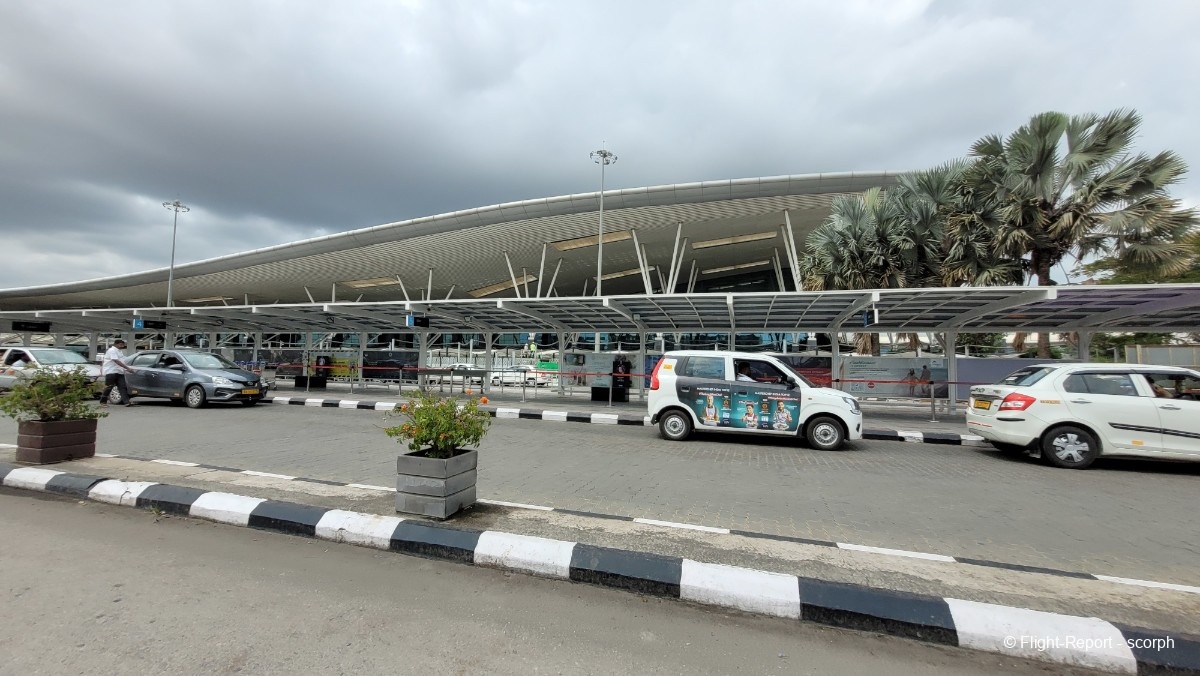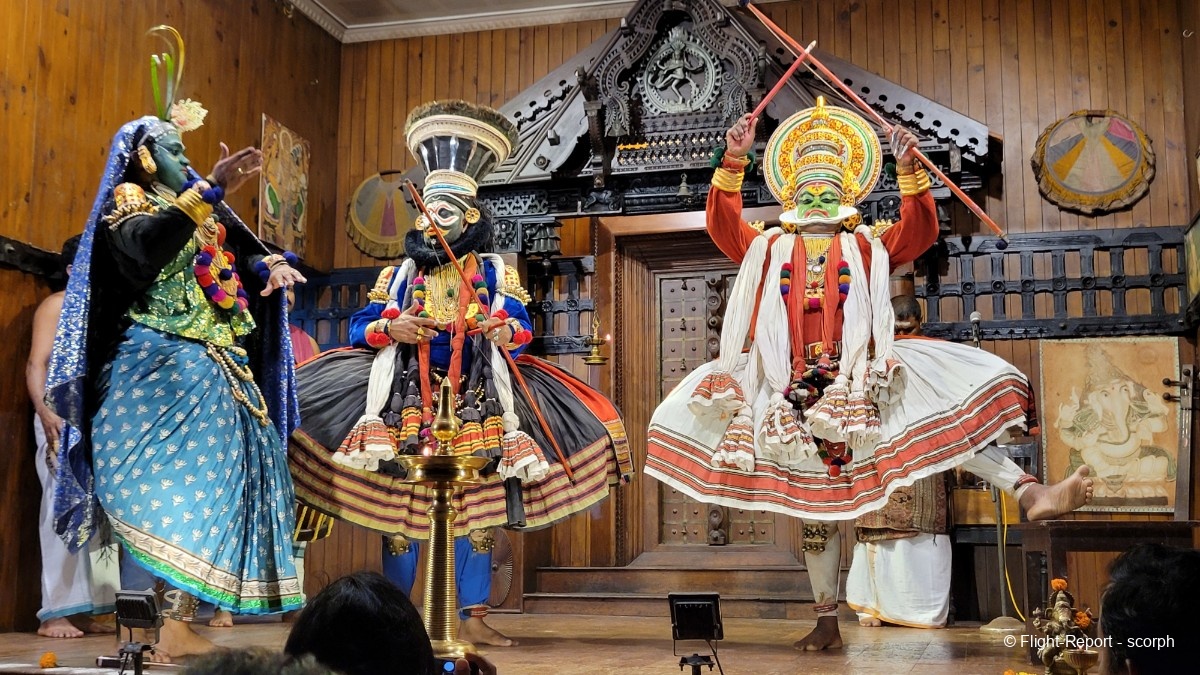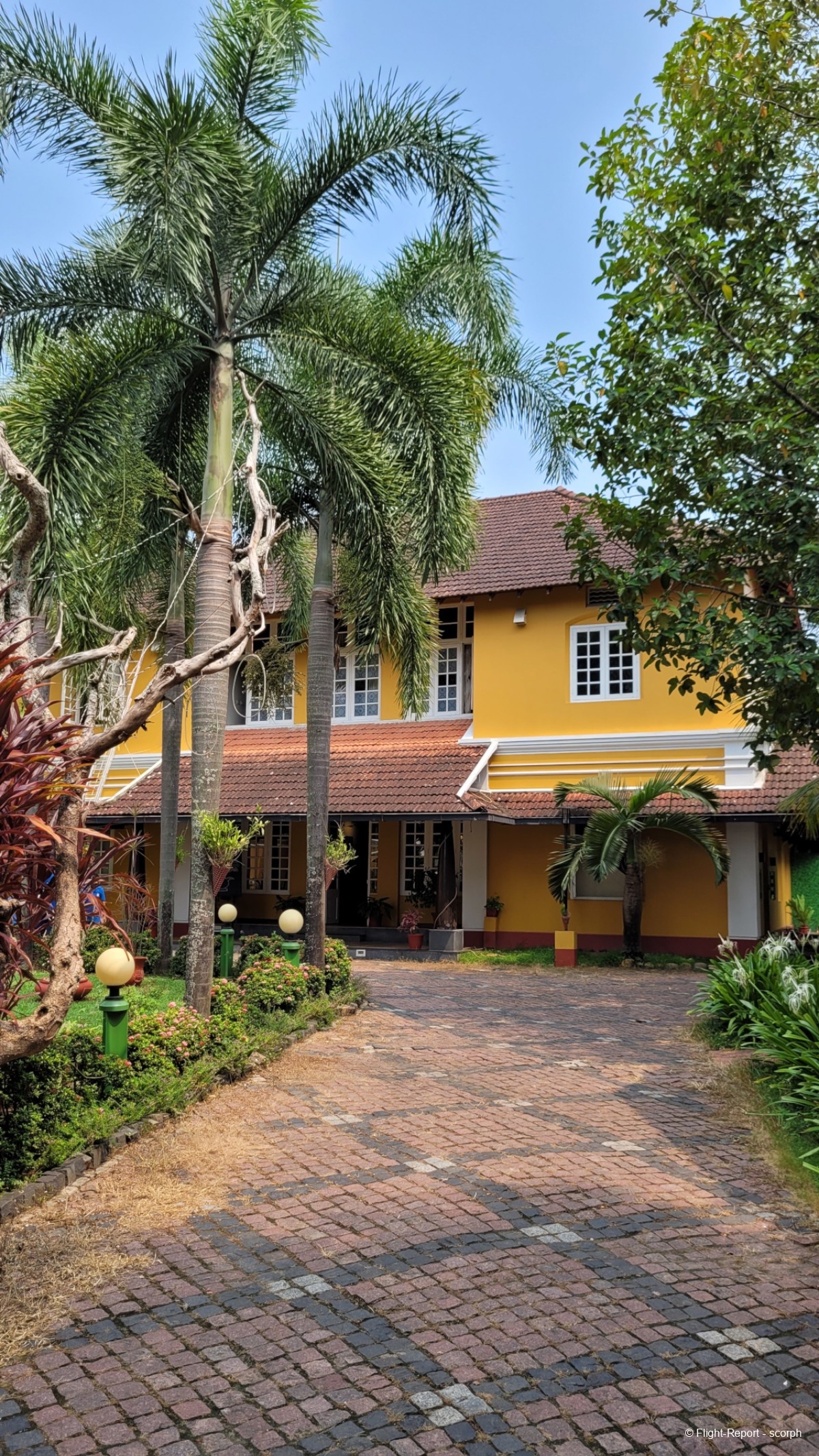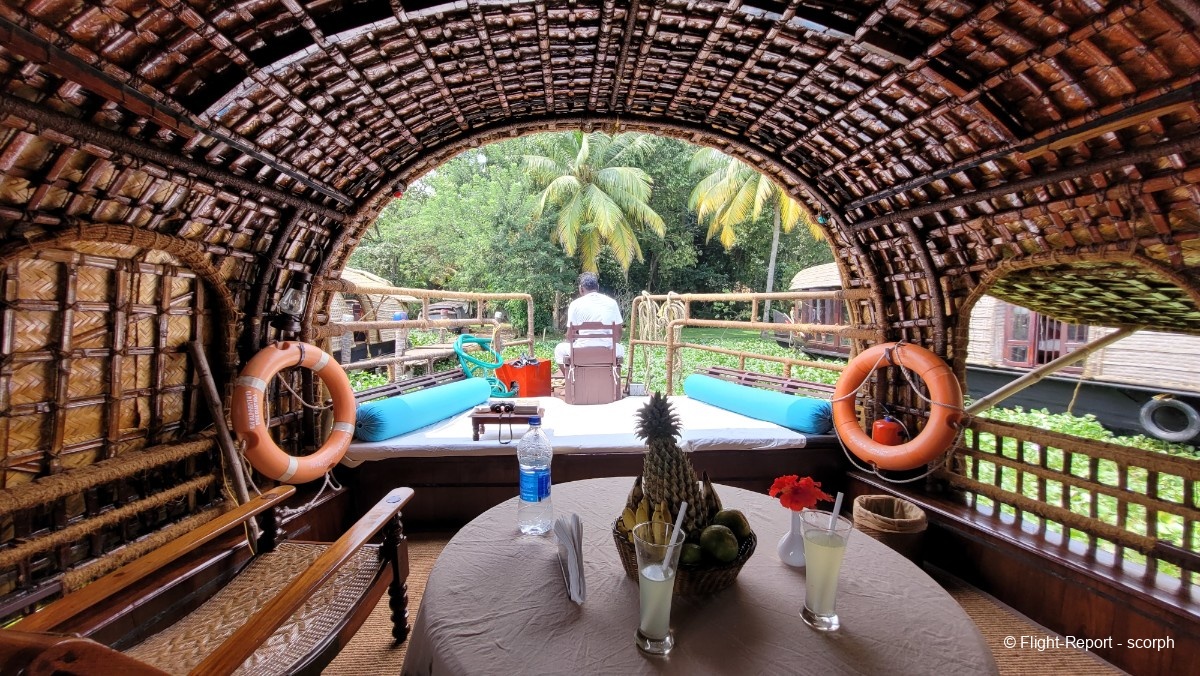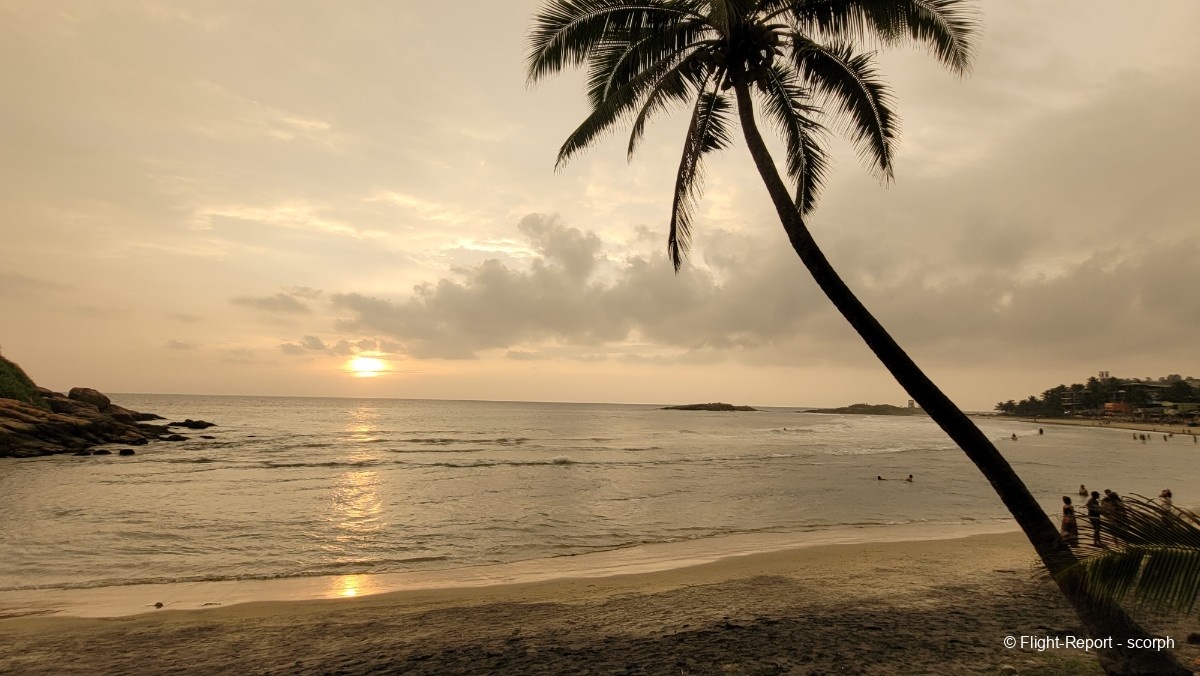Hello everyone and welcome aboard this new Indian report. On the agenda, the return flight from our little Kerala trip before starting my mission in Bangalore.
Introduction
After spending two weeks in the southwest tip of India, it's time to head to the capital of Karnataka, Bangalore, where work awaits me, and where my girlfriend's return flight will depart in the evening. Once again, we kept it simple, practical, and, conveniently, affordable by choosing the low-cost carrier Indigo, the only airline operating this direct route when we booked the flight.
So, here's the routing we have:
Enchainement de vols
- 1
- 26E661 - Economy - Trivandrum => Bangalore - Airbus A321neo
As mentioned earlier, during our trip, Indigo was the only airline offering direct flights between Trivandrum and Bangalore, with four daily flights operated on Airbus A320neo or A321neo aircraft.
However, since the winter of 2023, a new player has entered the market, with Air India Express offering two daily rotations on Boeing 737-800/737 Max 8 aircraft. It's worth noting that demand must have increased, as Indigo has since added a fifth daily flight.
On our website there is no report on the flightreport english database for a flight departing from Trivandrum
Tuktuk transfer and departure from T1
We depart after breakfast from our hotel, located near the coastal resort of Kovalam. While not the most beautiful of Indian beaches, it is very close to Trivandrum and its airport, situated between the coast and the city, the capital of Kerala state. So close, in fact, that it's possible to reach the airport by tuk-tuk.
We paid 450 INR (€5) for the 15 km ride, thanks to the Uber app, which works quite well in the larger Indian cities.
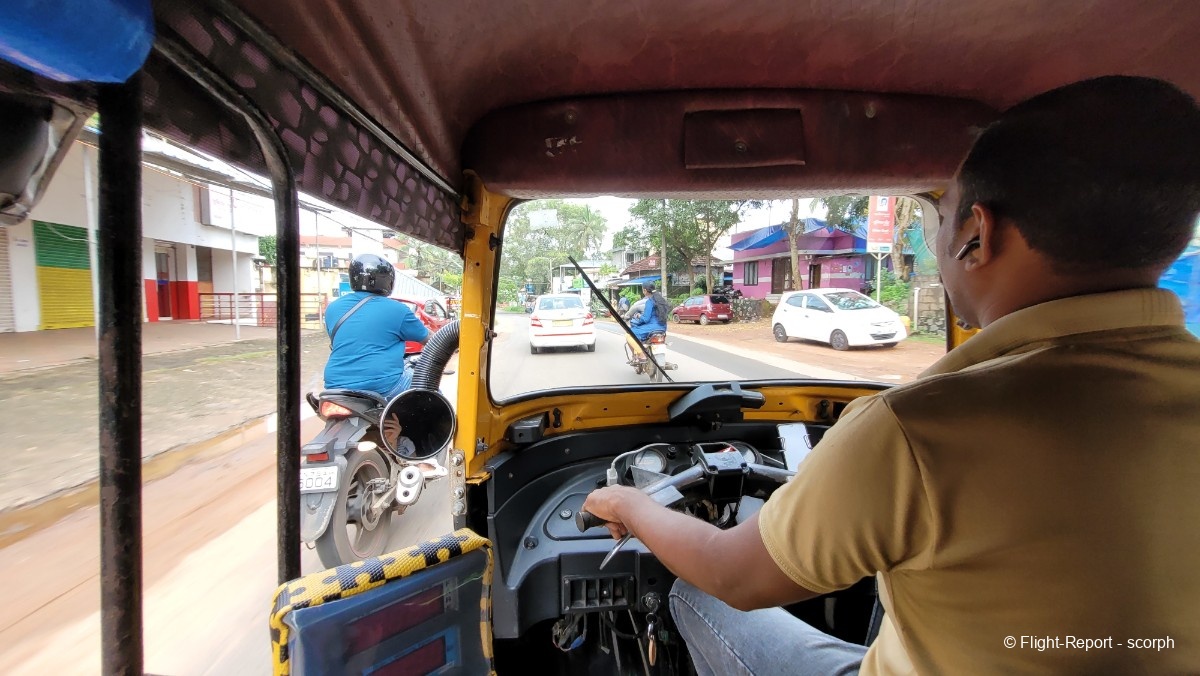
Once we arrived in front of the airport security is taken seriously. Numerous personnel in uniform were guarding the entrance, and even an armored vehicle was parked in front of the terminal. It's worth noting that we went to the domestic terminal, also known as Terminal 1, which only handles domestic flights for Indigo and Vistara.
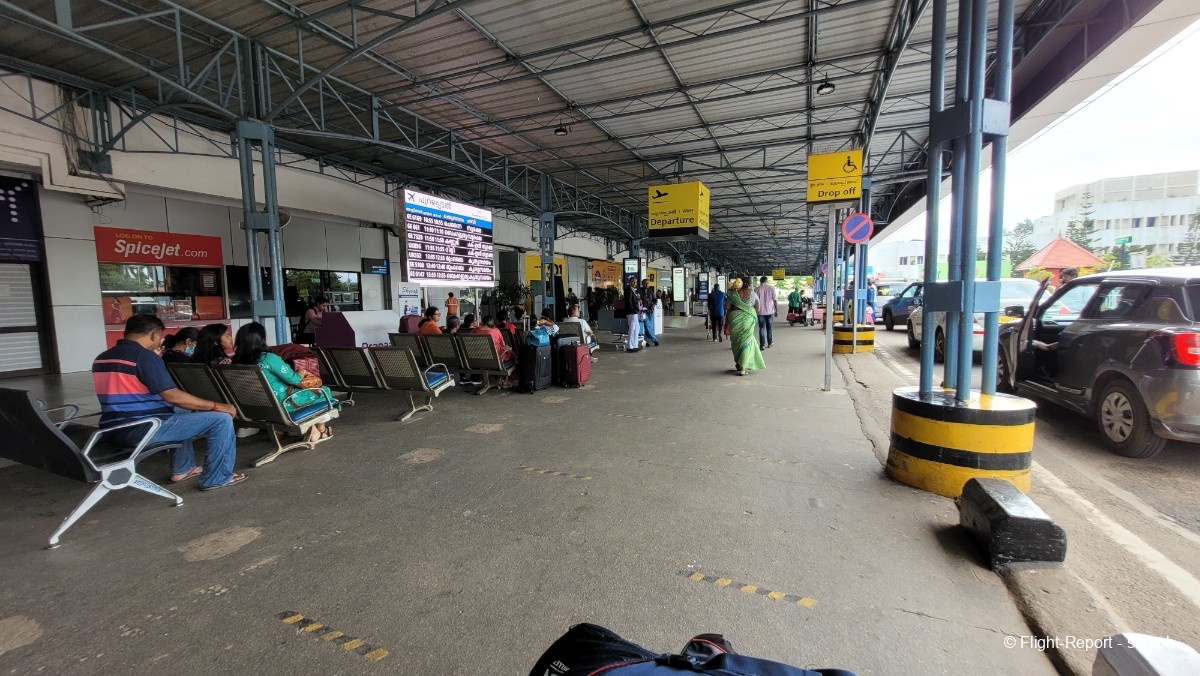
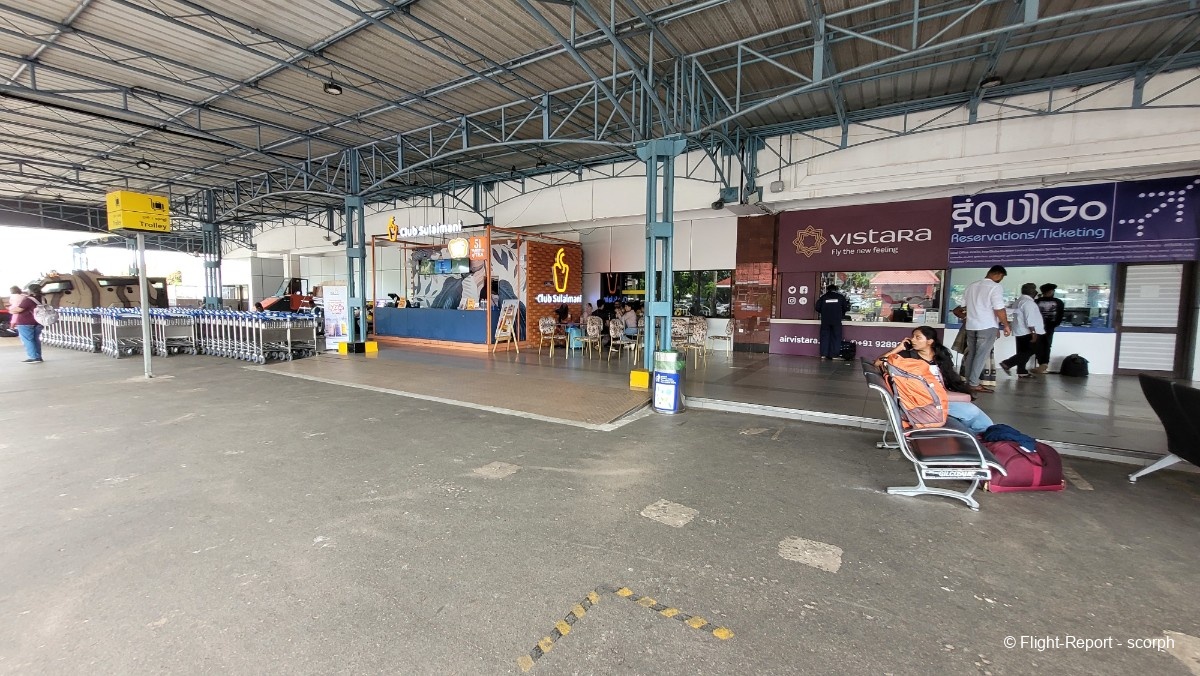
To enter the airport, we had to show our ID and flight ticket. The agent in charge, quite elderly, was very friendly and smiling… quite a change from the French border police officers! ^^
Upon entering, we had to pass our checked baggage through a scanner, somewhat like in Morocco. After that, a sealed tag was placed on each of our bags. The scanner was effective they even spotted the small power bank I had forgotten in my checked luggage. Once this formality was done, we headed toward the check-in counters. Once again, the wait was only a few minutes, and the check-in process was quick, with cheerful and friendly staff who spoke English perfectly.
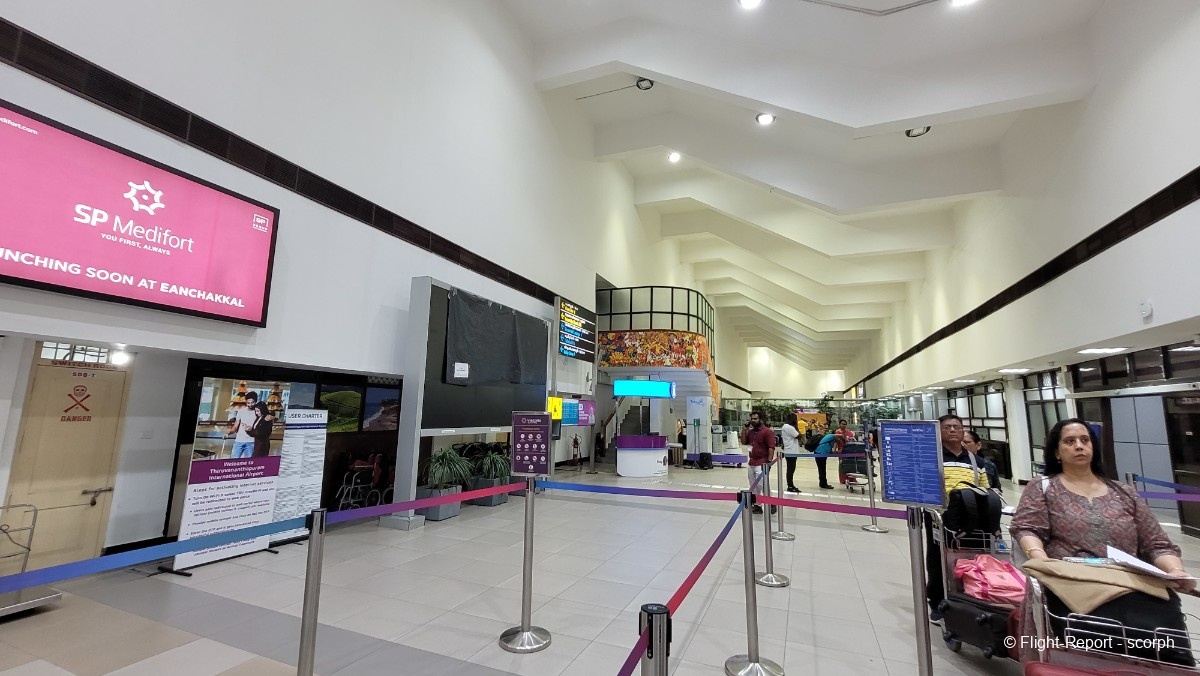
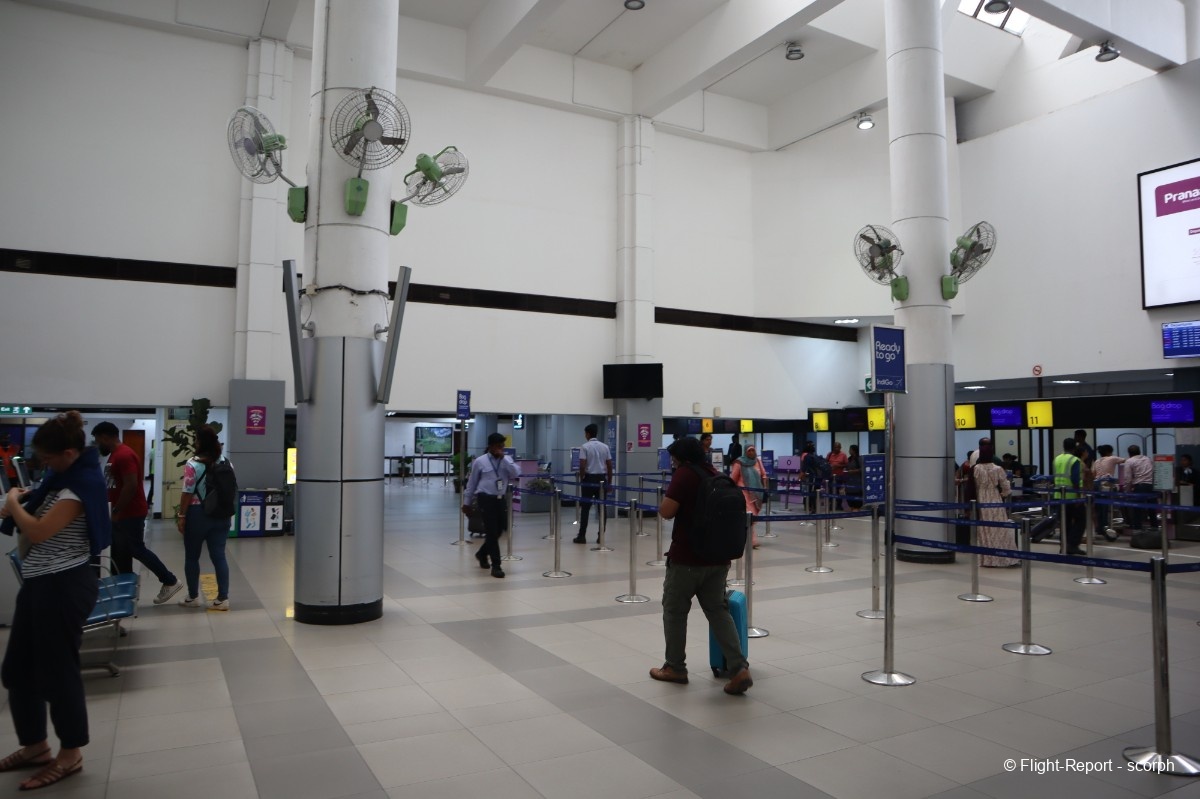
We were given beautiful, branded cardboard boarding passes. Oh, and by the way, for those wondering, Indigo offers, with its lowest fares, 1 checked bag weighing up to 15kg and 1 standard-sized carry-on bag (55x40x20 cm), which should not exceed 7kg (they are never weighed).
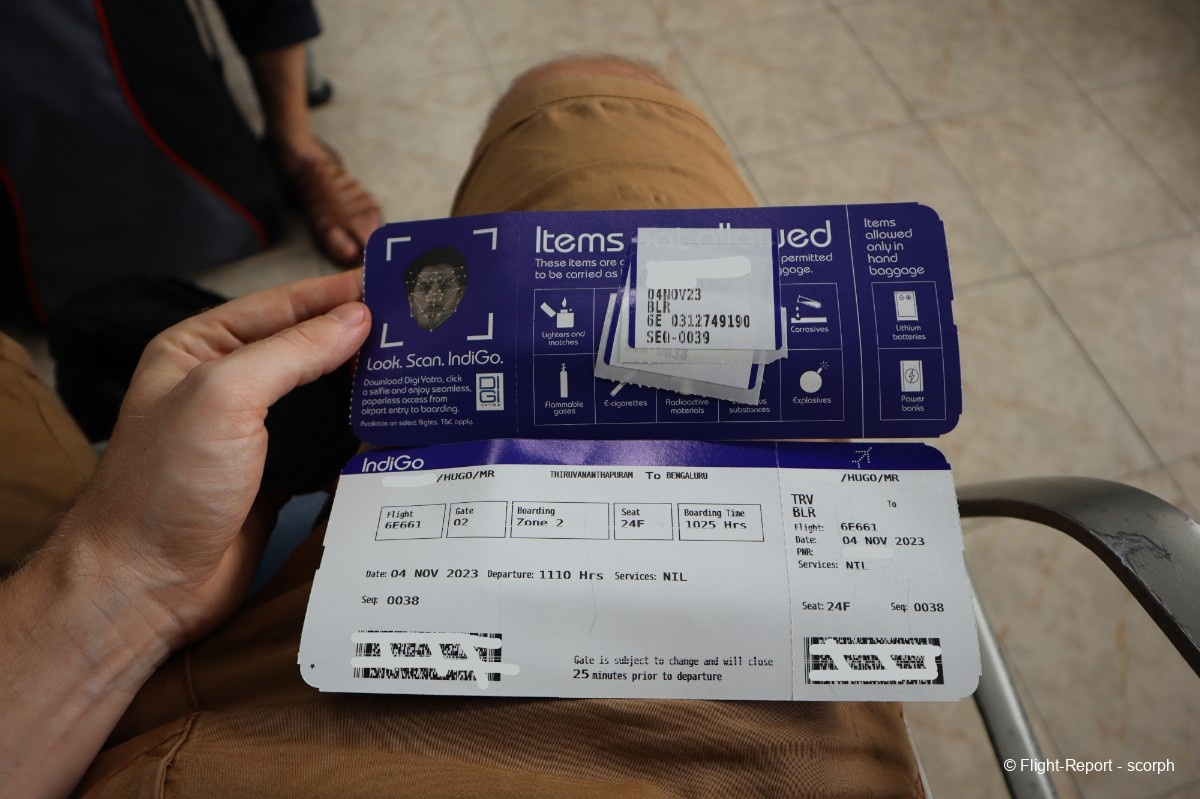
Heading to the security checkpoint, the queue wasn't long, but the controls were strict. Batteries and chargers must be removed from bags, and even if you don’t set off the metal detector, you are still subject to a second check! The 100ml liquid regulations don’t seem to apply for indian domestic flights.
To reach the departure level, you then need to go up one floor. You can tell it's the old terminal it’s still got that vintage feel! ^^
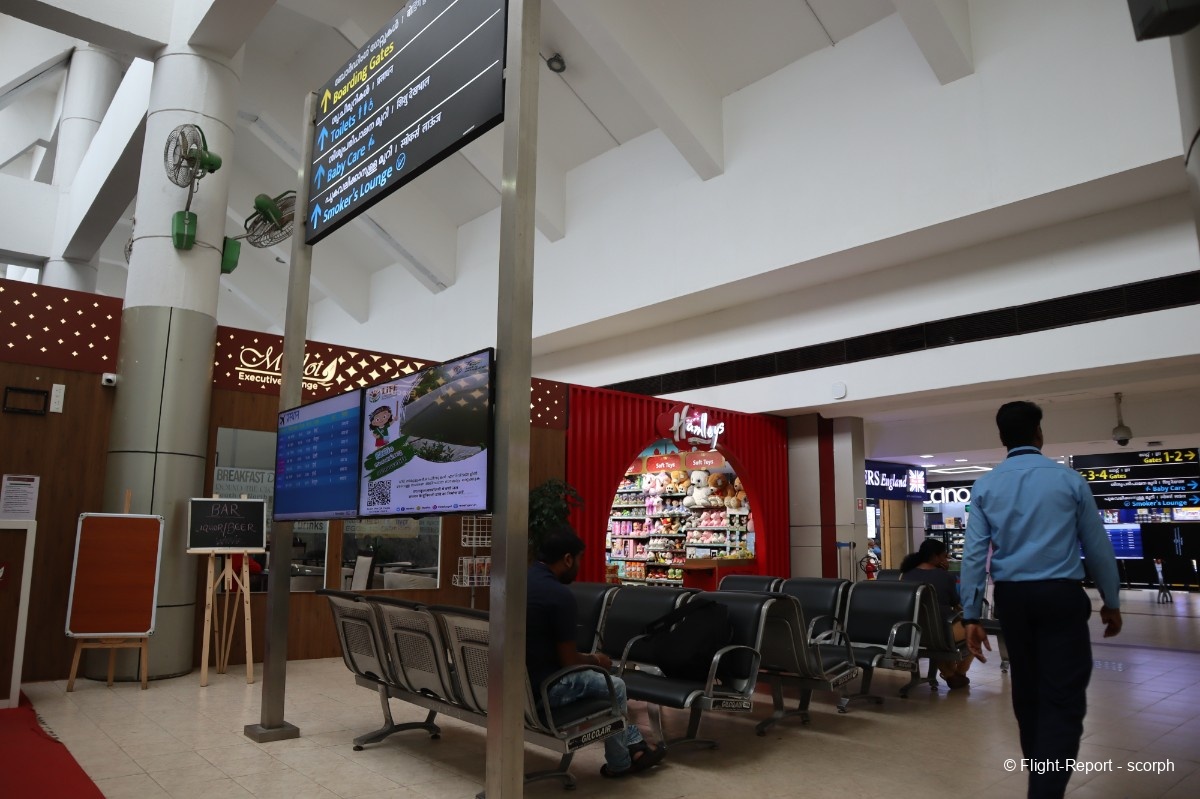
The departure board in the local language (Malayalam) and in English. Unsurprisingly, all the destinations at this domestic terminal are within India.
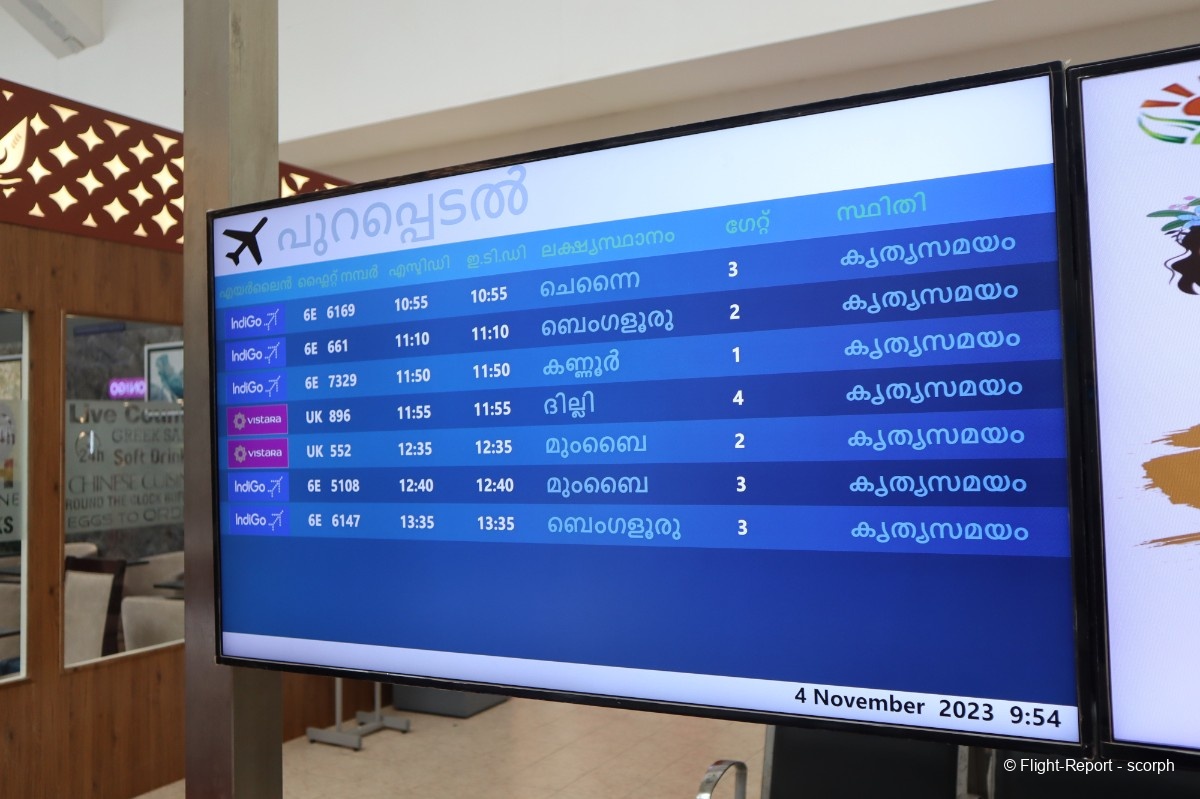
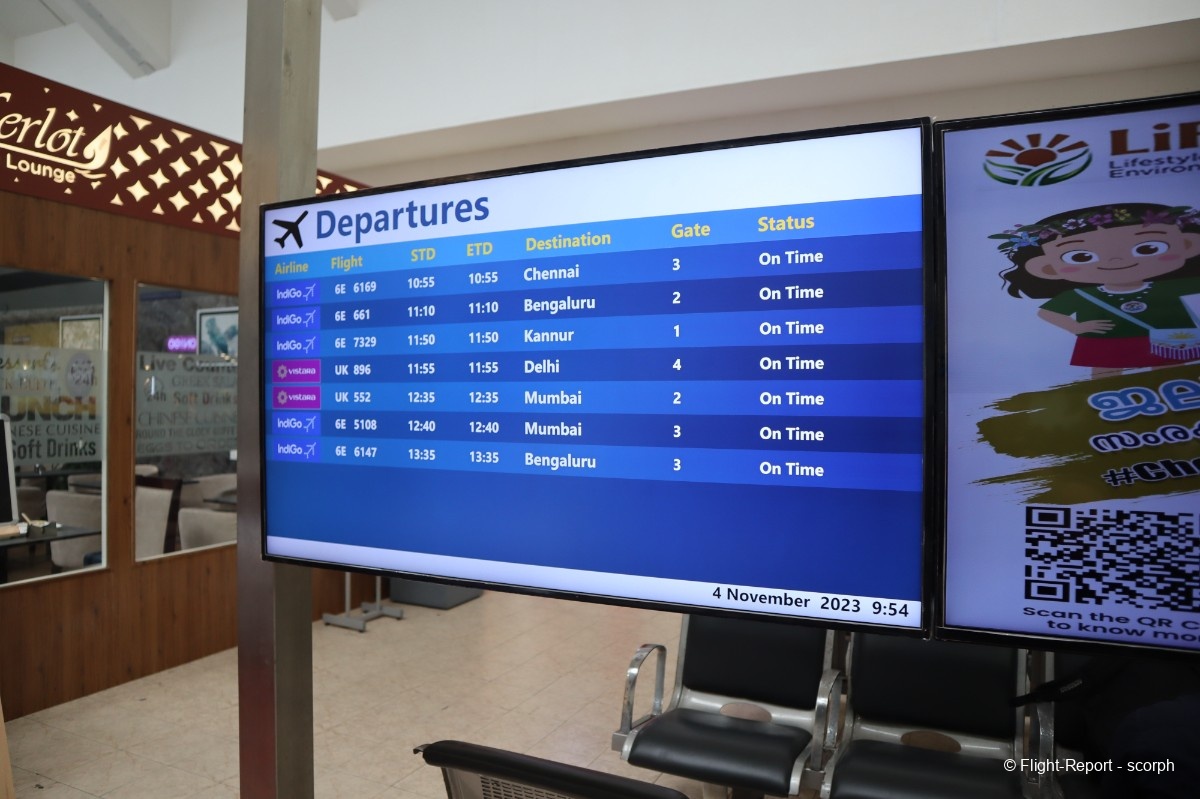
The airside area of this small terminal is centered around a long corridor that leads to 4 gates, two of which are equipped with jet bridges. There are numerous shops selling snacks, as well as a smoking area and a lounge.
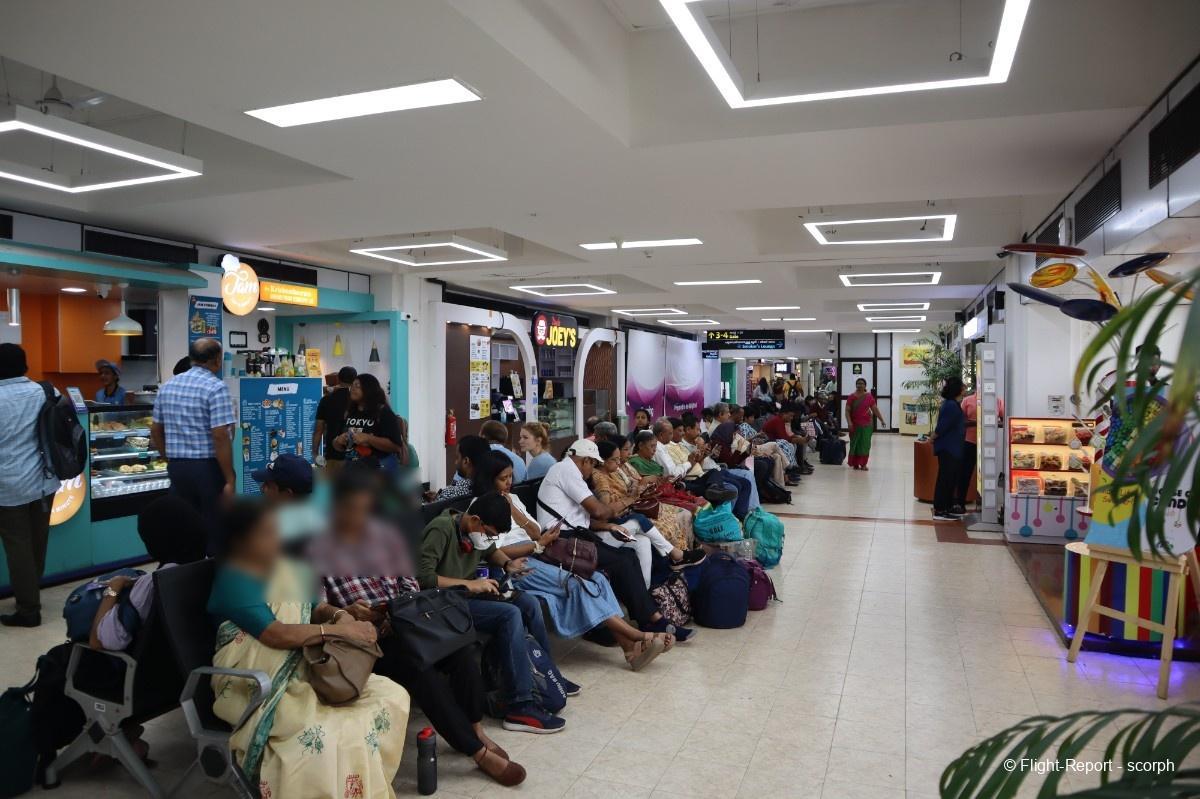
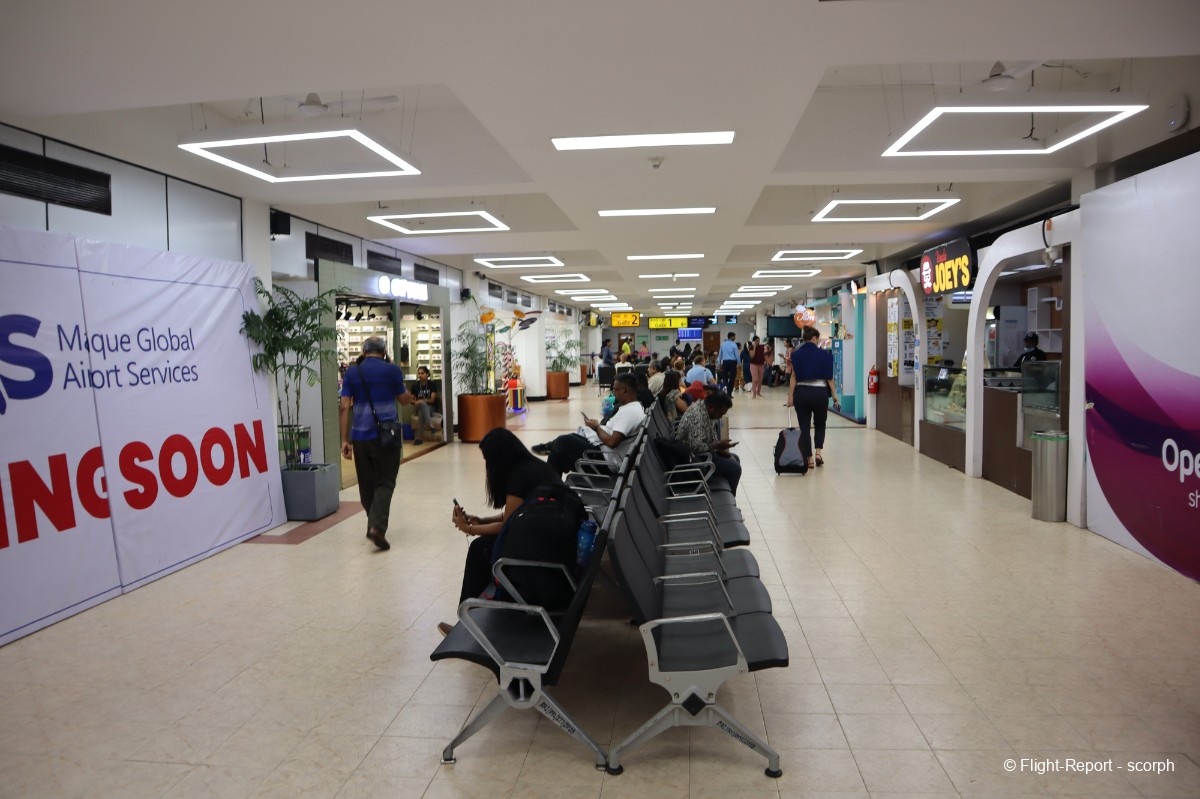
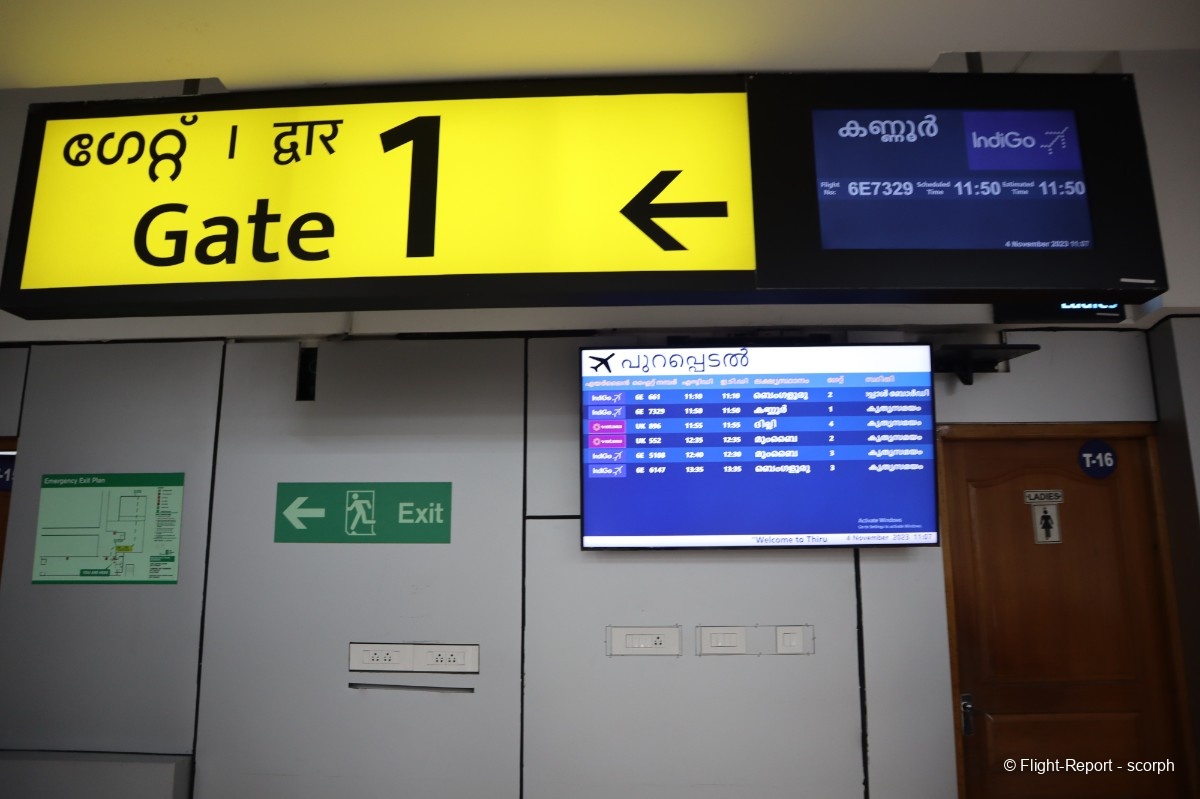
However, this terminal is clearly not spotter paradise, although I managed to get a photo of this Maldivian Airbus A320 coming in from Malé, Maldives.
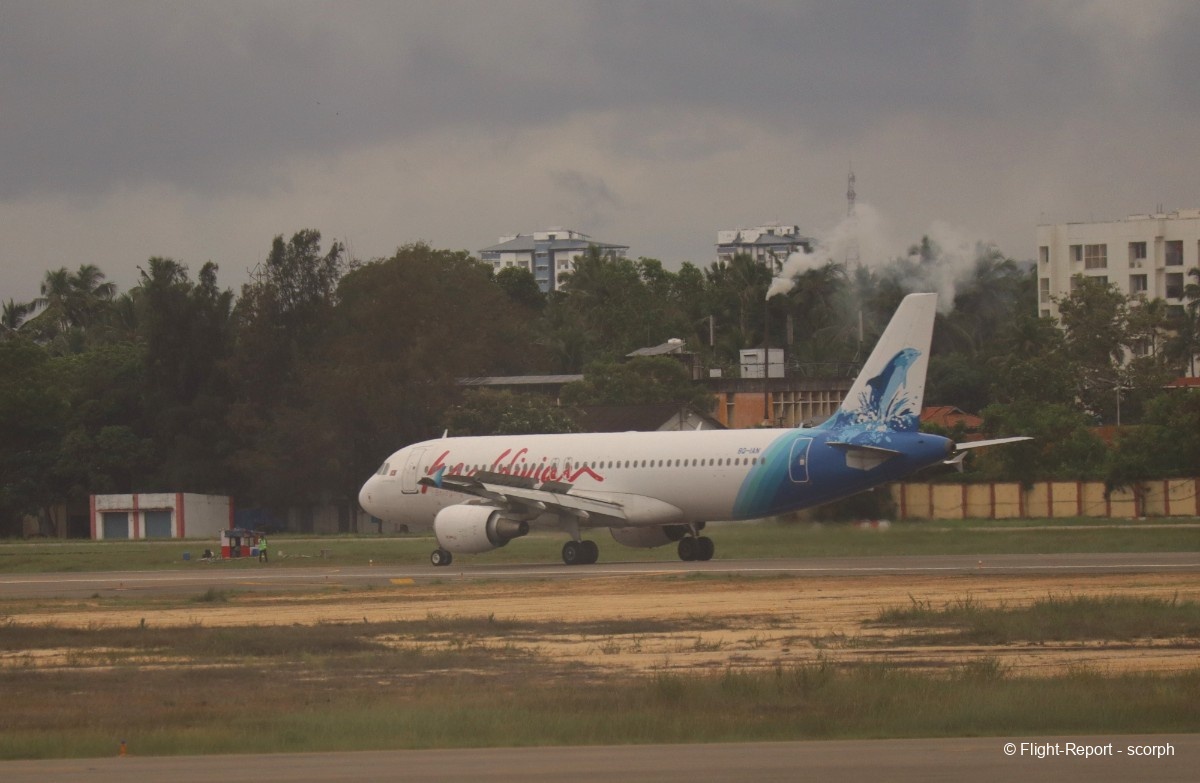
And this Airbus A320neo from Indigo operating the flight from Chennai.
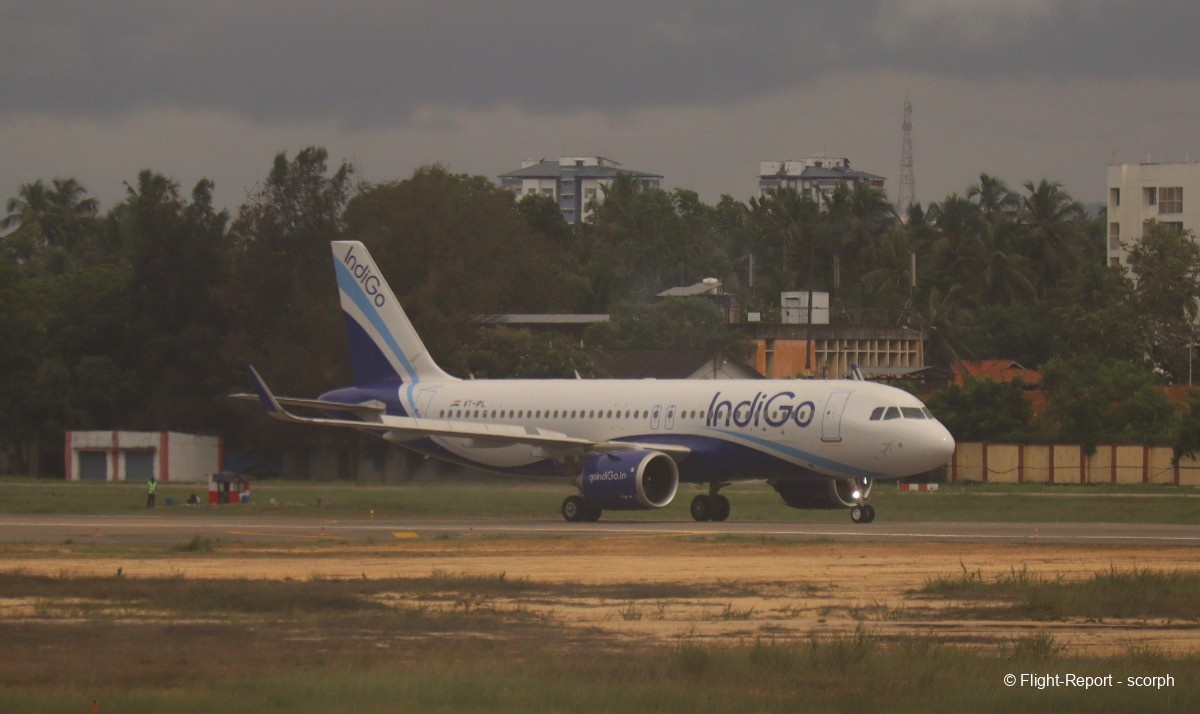
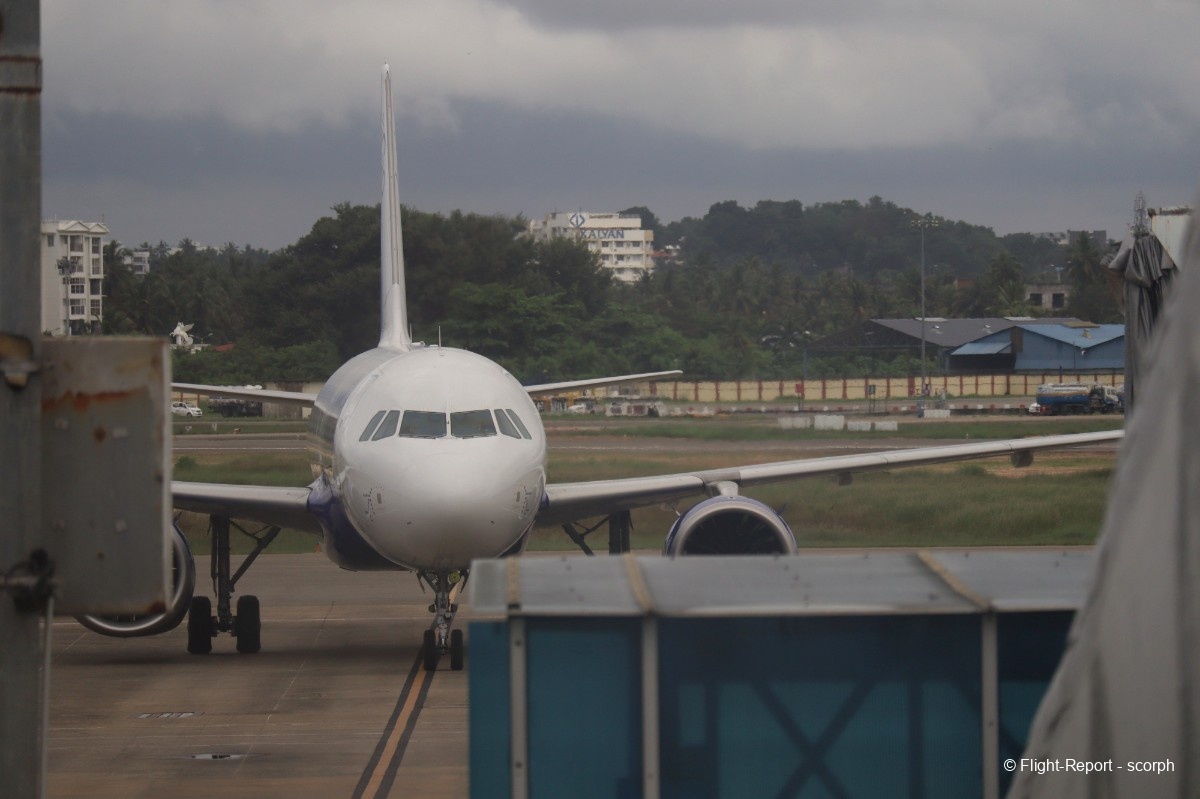
As soon as our flight is called, it will be chaos, with my fellow passengers crowding around the gate. The agent at the gate will have to make several announcements over the PA system to restore some order to the waiting line.
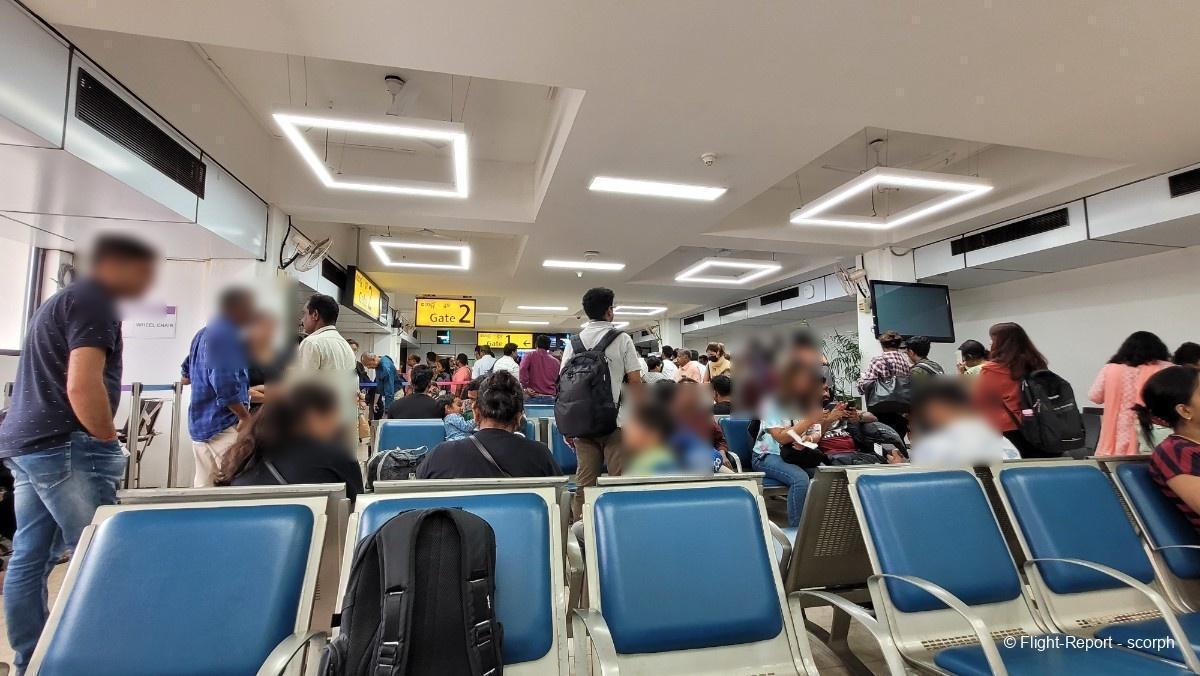
It's a shame, really, because the boarding process was well arranged, with two gate, one for boarding the front rows via the jetbridge.
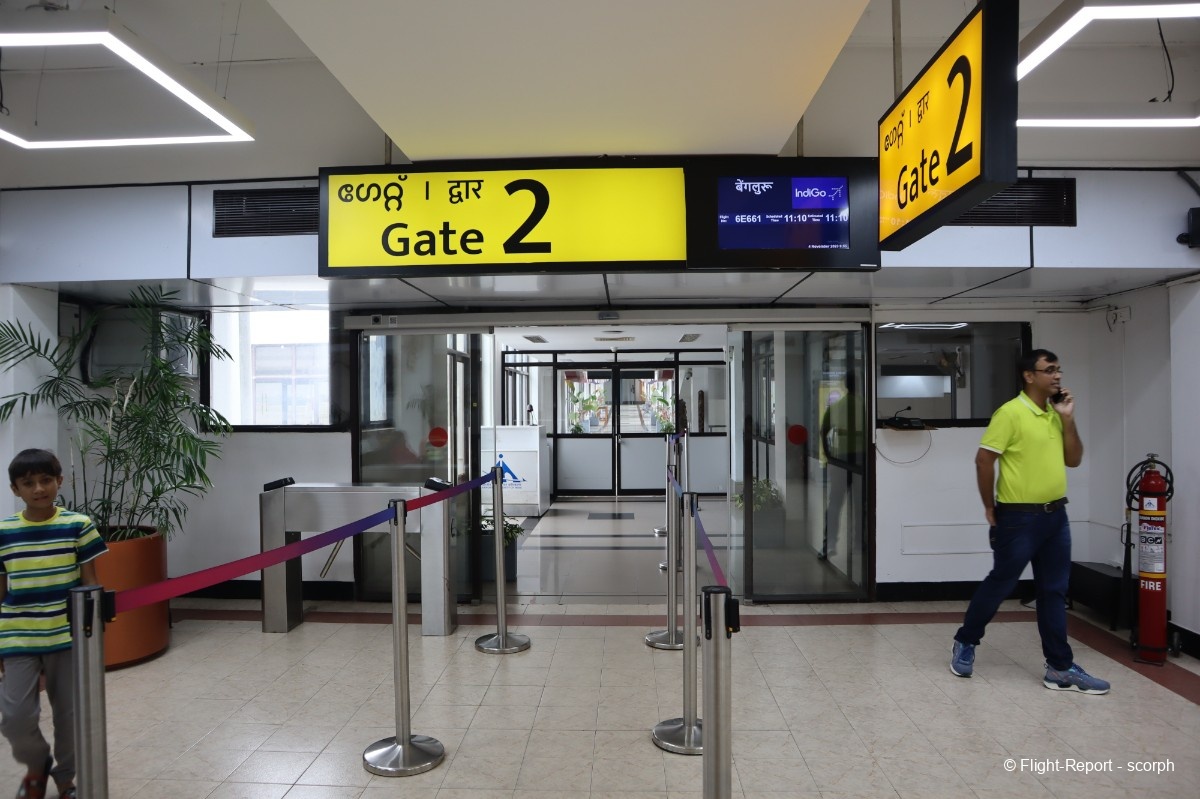
The other gate is for the rear rows, which I'll be part of, and passengers will board via a paxbus, even though it's only a short 100 meters to cover.
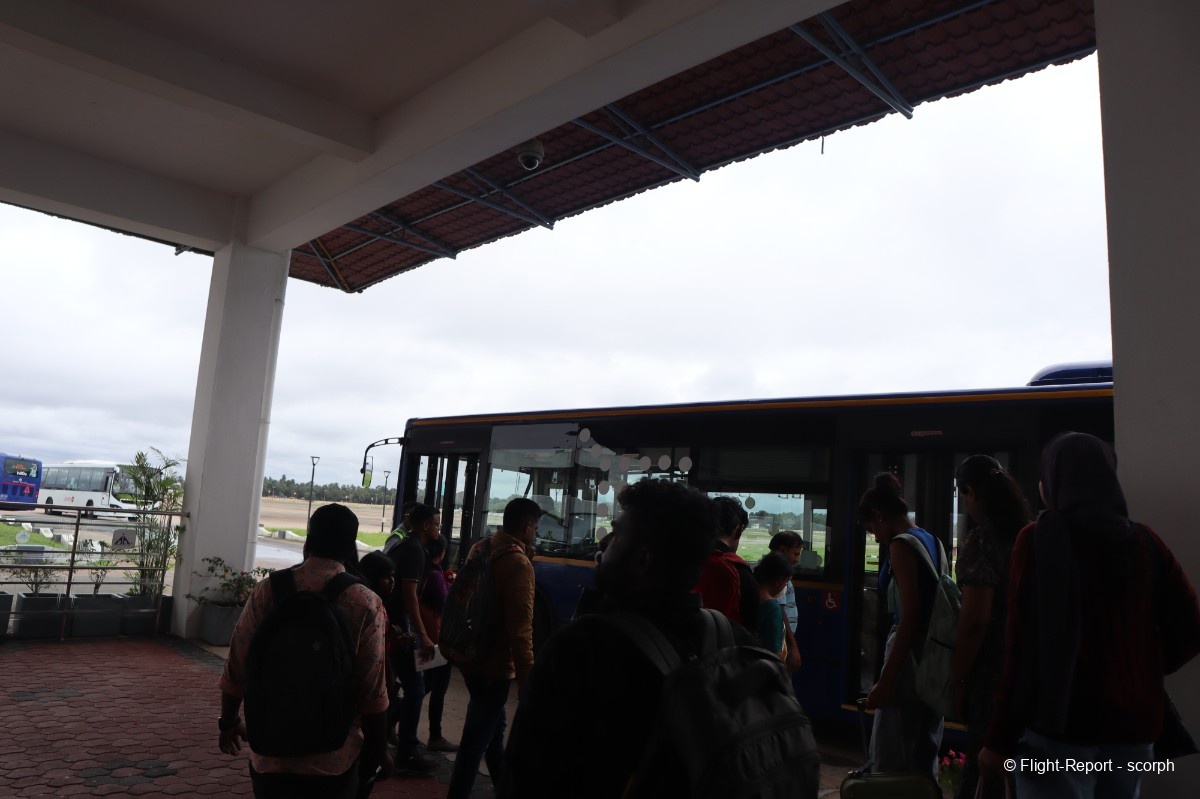
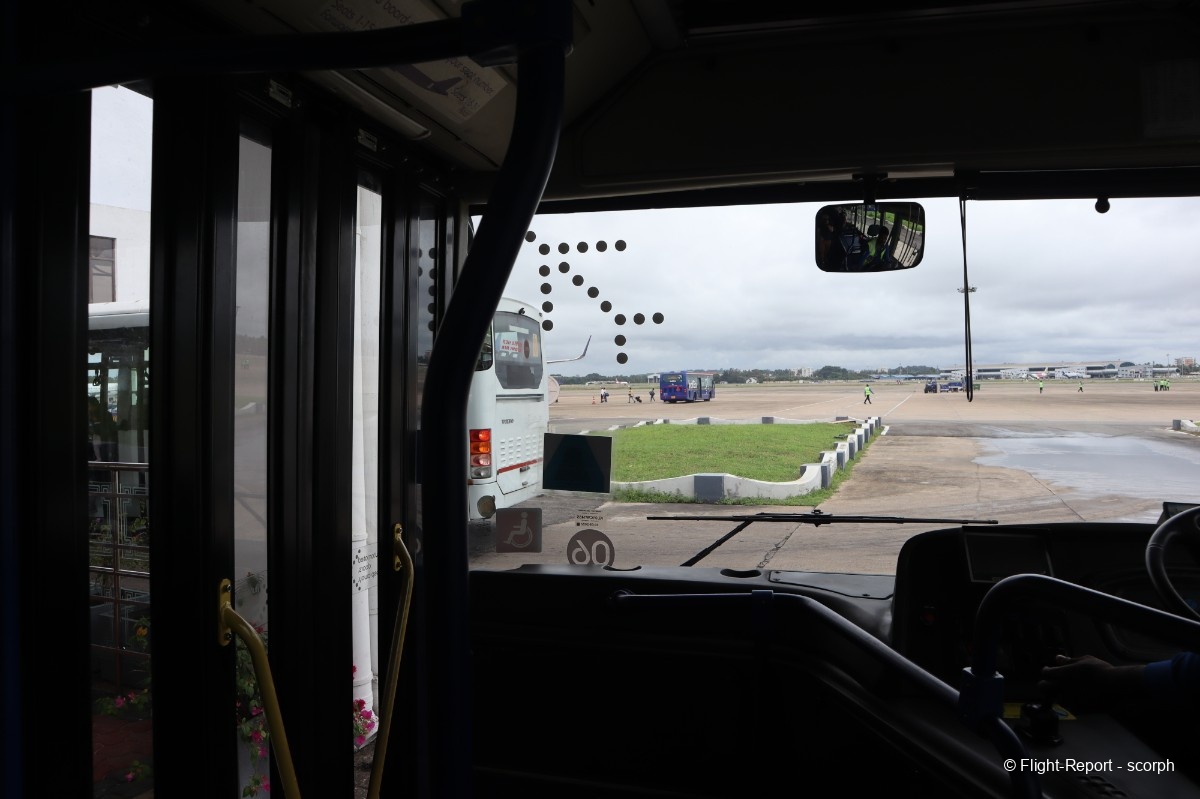
Our aircraft is already visible from the bus it's VT-IMQ, an Airbus A321neo that was delivered new to Indigo just over a year ago.
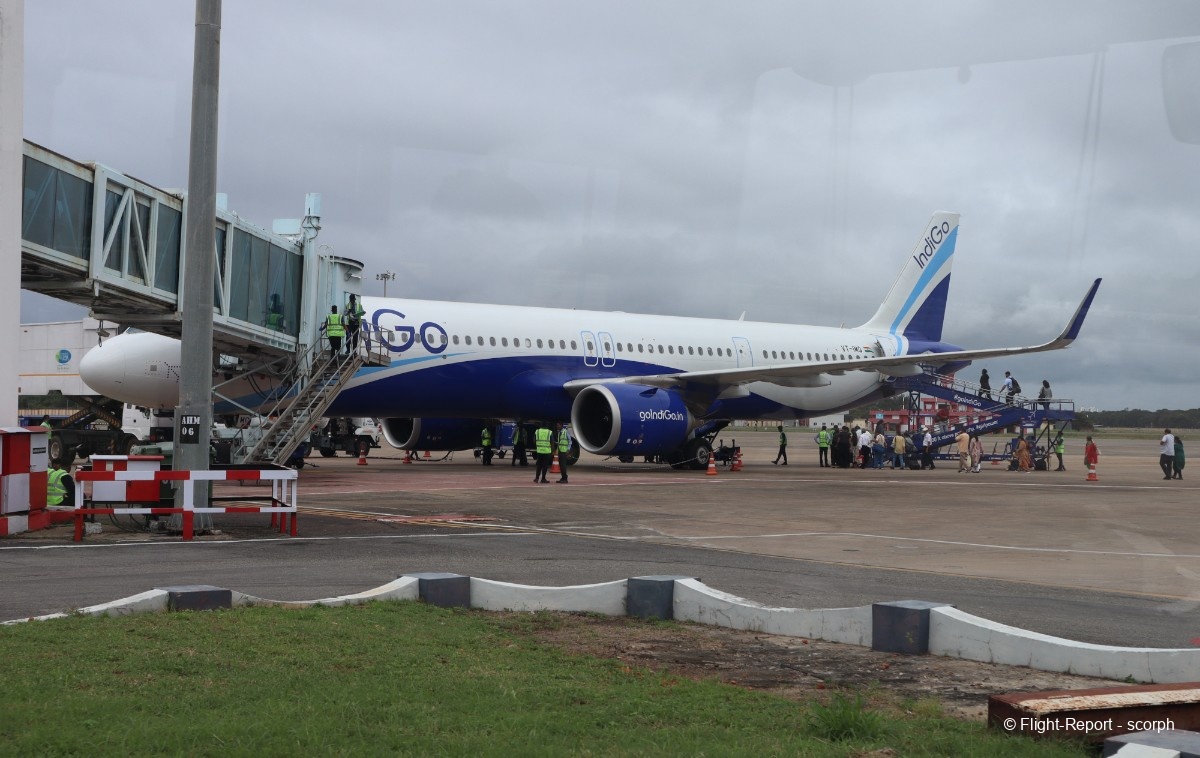
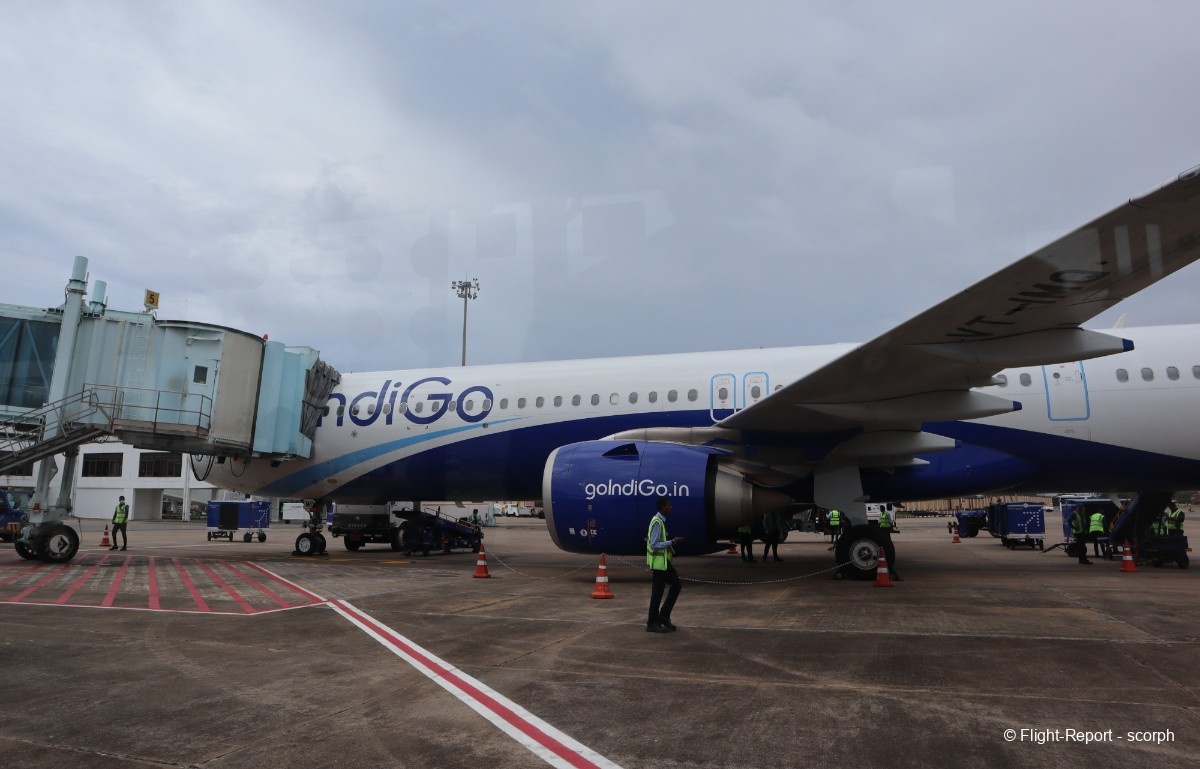
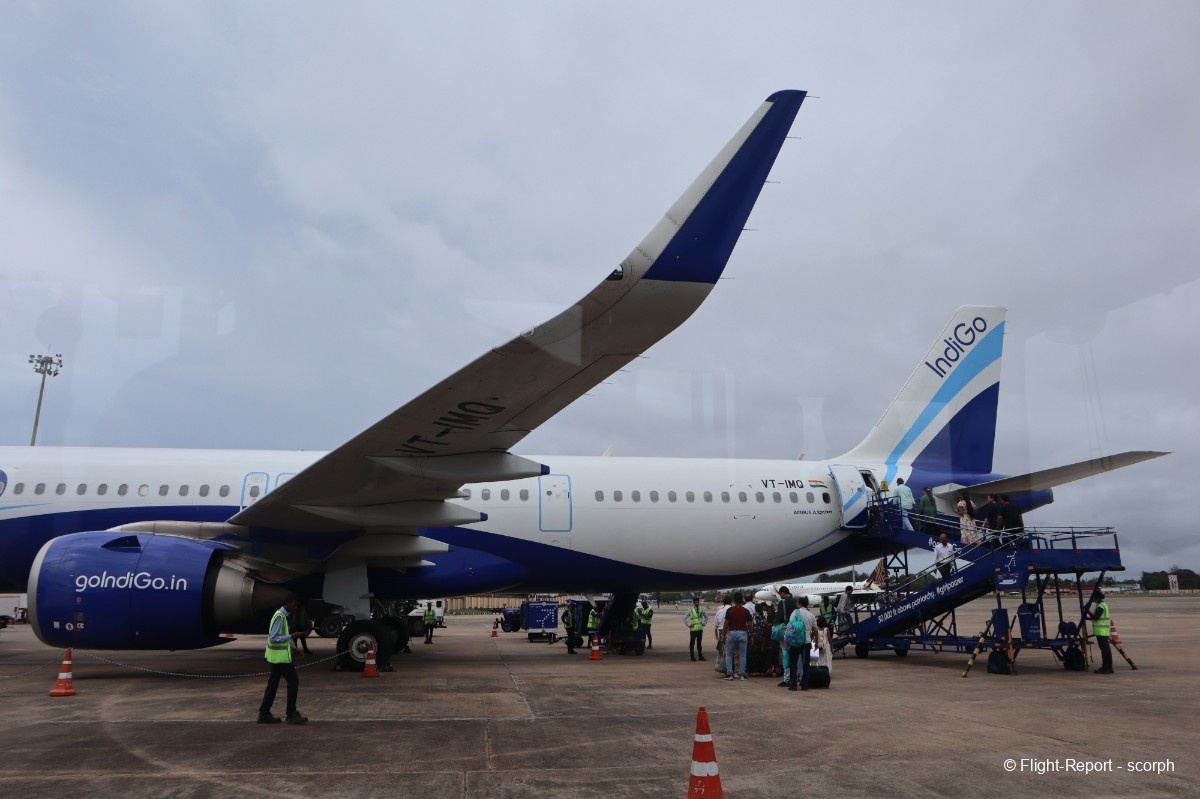
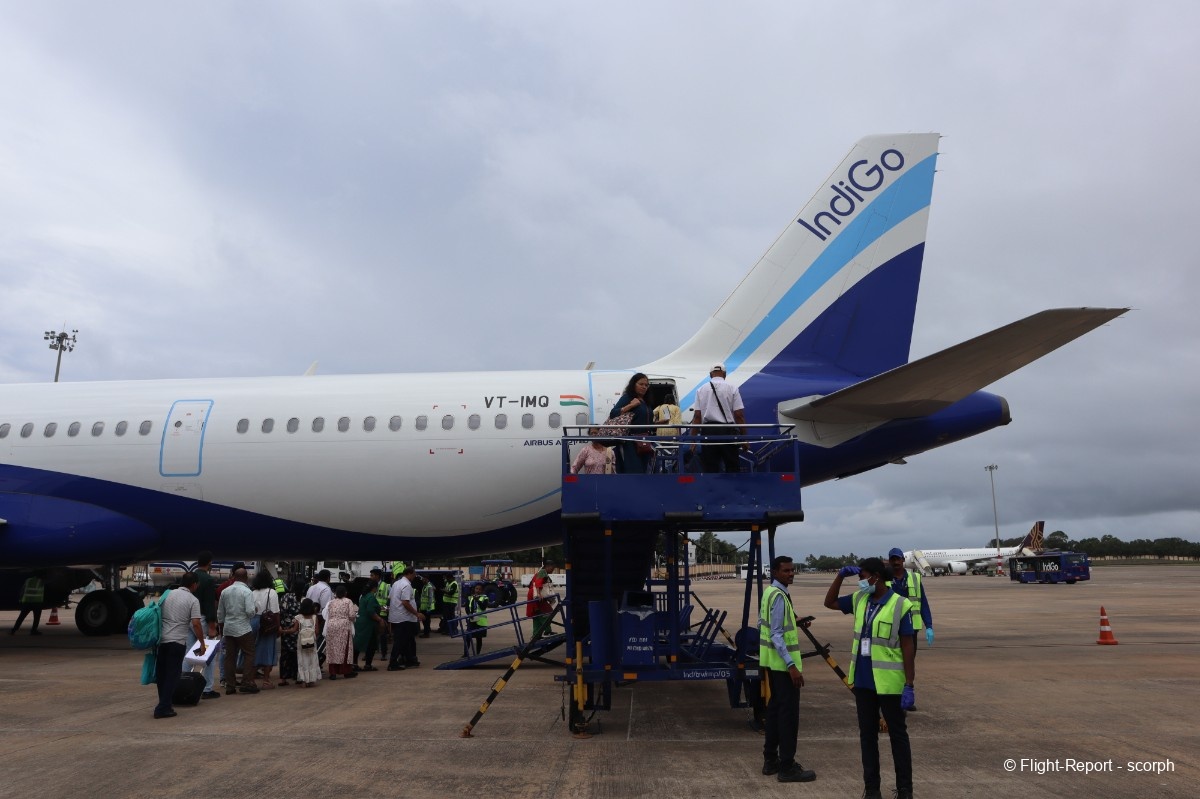
The paxbus drops us right at the foot of the plane, giving me a great view of the left engine. It's equipped with the Pratt & Whitney PW1100G engines, which are the common engine type for IndiGo’s Neo's fleet.
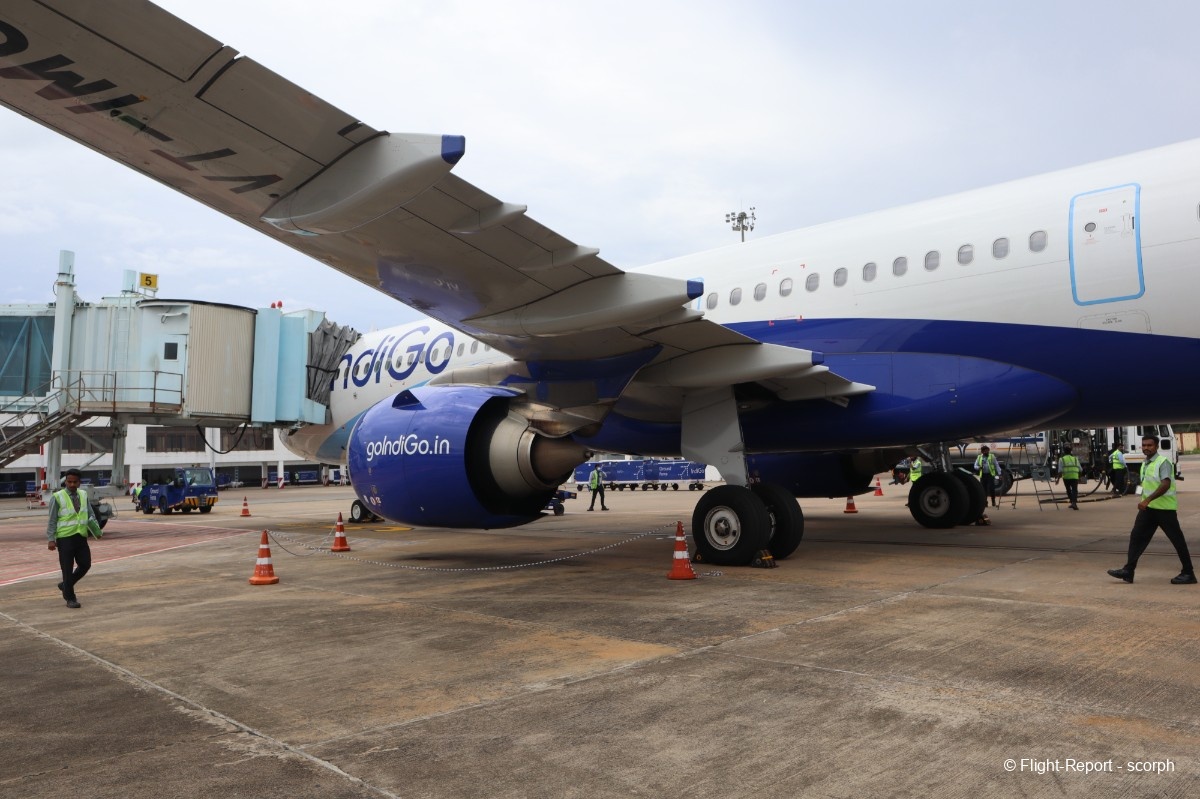
These access ramps made of inclined platforms, designed to make boarding easier for passengers with reduced mobility (PRM) and the elderly. As usual, there's a large number of ground staff, and the boarding pass will be checked before we can use the ramp.
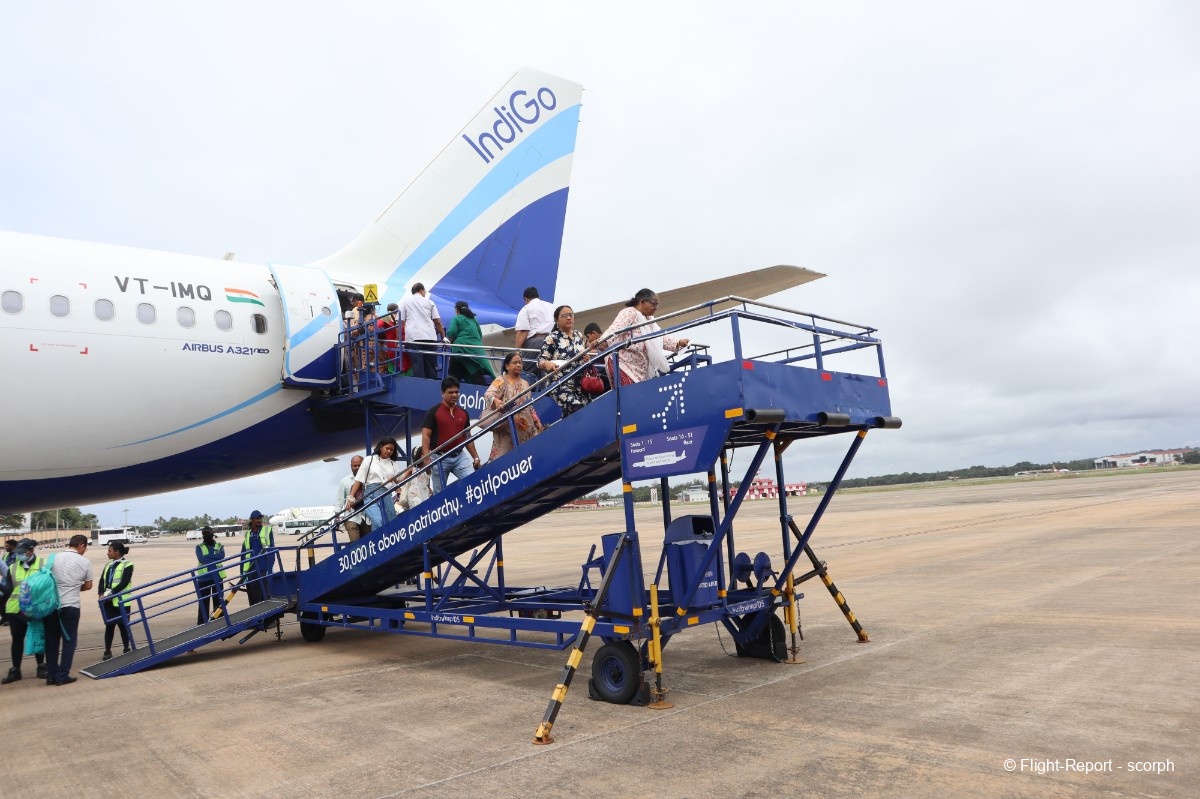
Different perspective on the aircraft door, captured from the foot of the ramp.
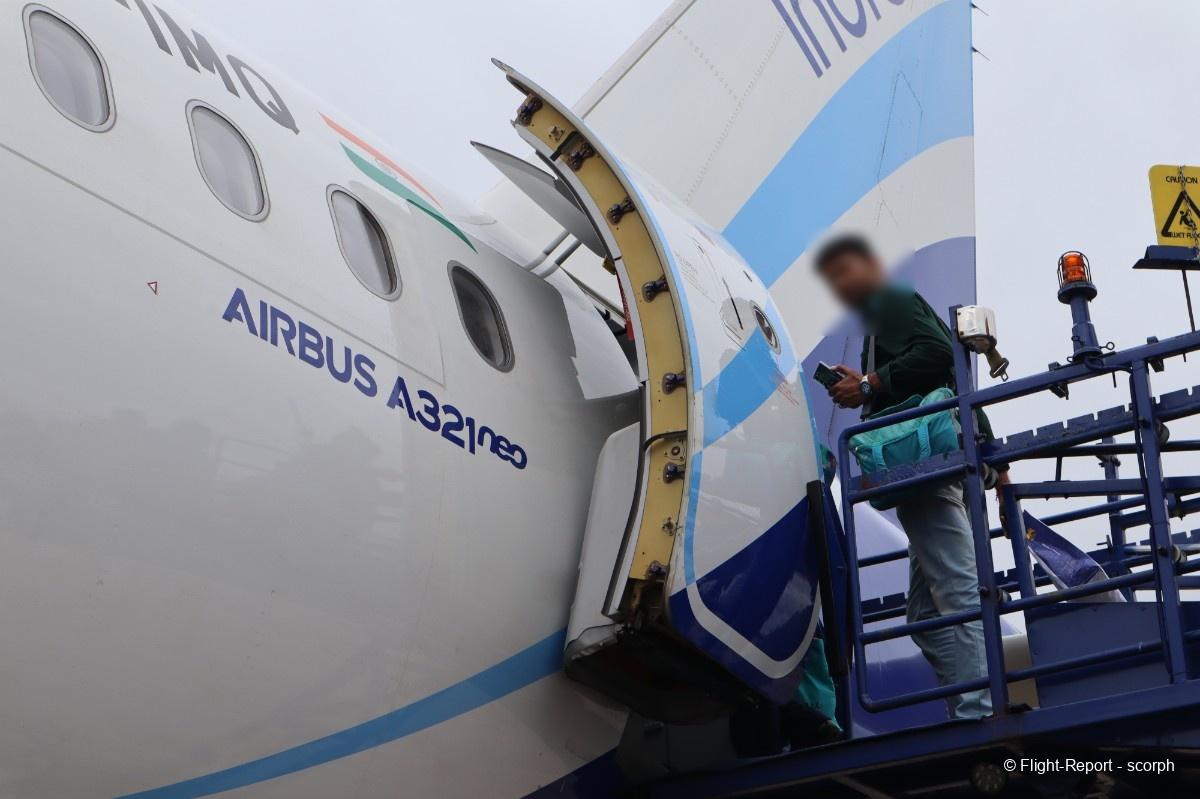
On the other side of the runway, you can see the much newer Terminal 2, which handles international flights. It’s worth paying close attention when planning your trip to Trivandrum Airport, as to my knowledge, there’s no direct connection between these two buildings.
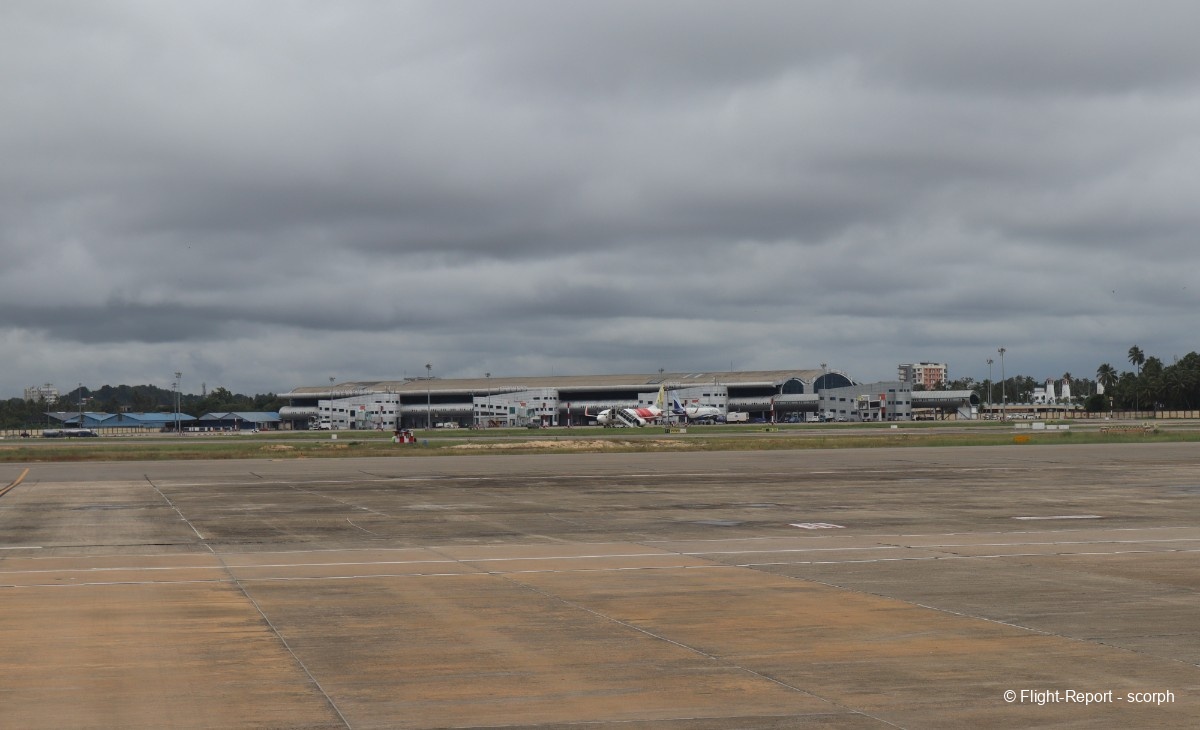
View from (almost) nose to tail of our A321neo for the day. The best-seller from Airbus, showcasing from every angle.
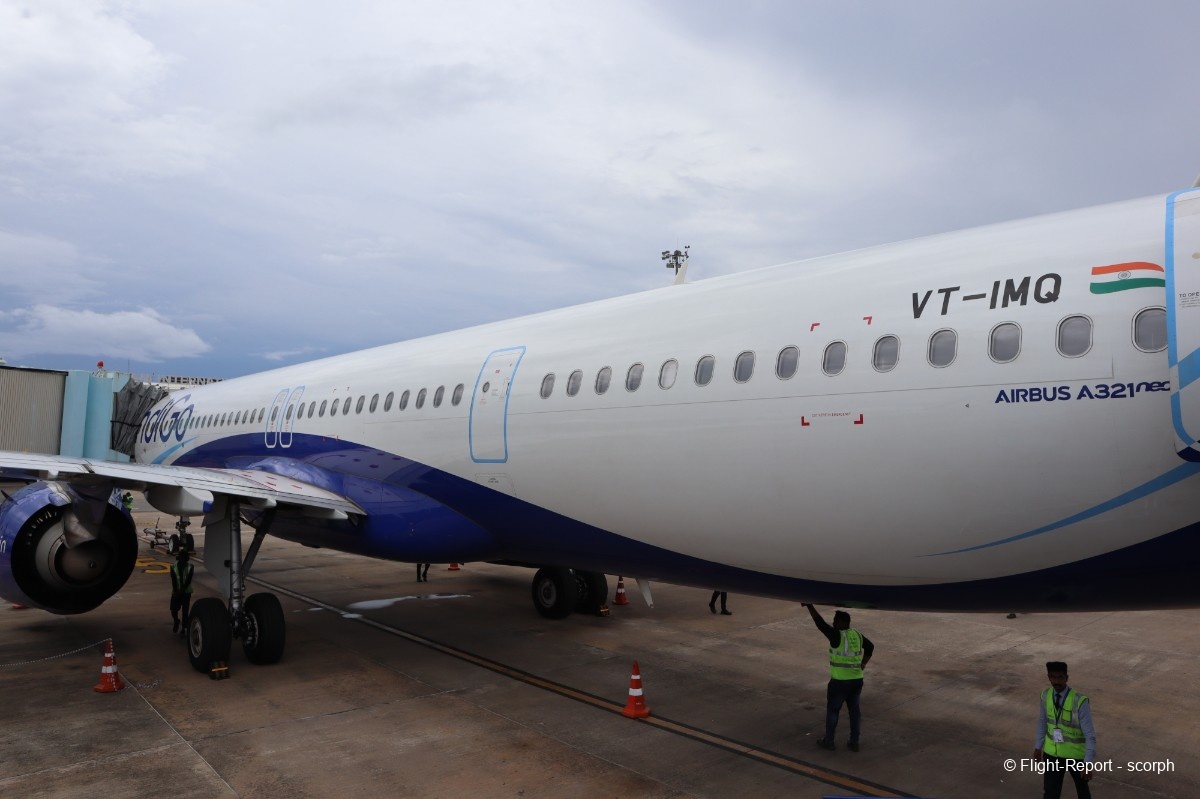
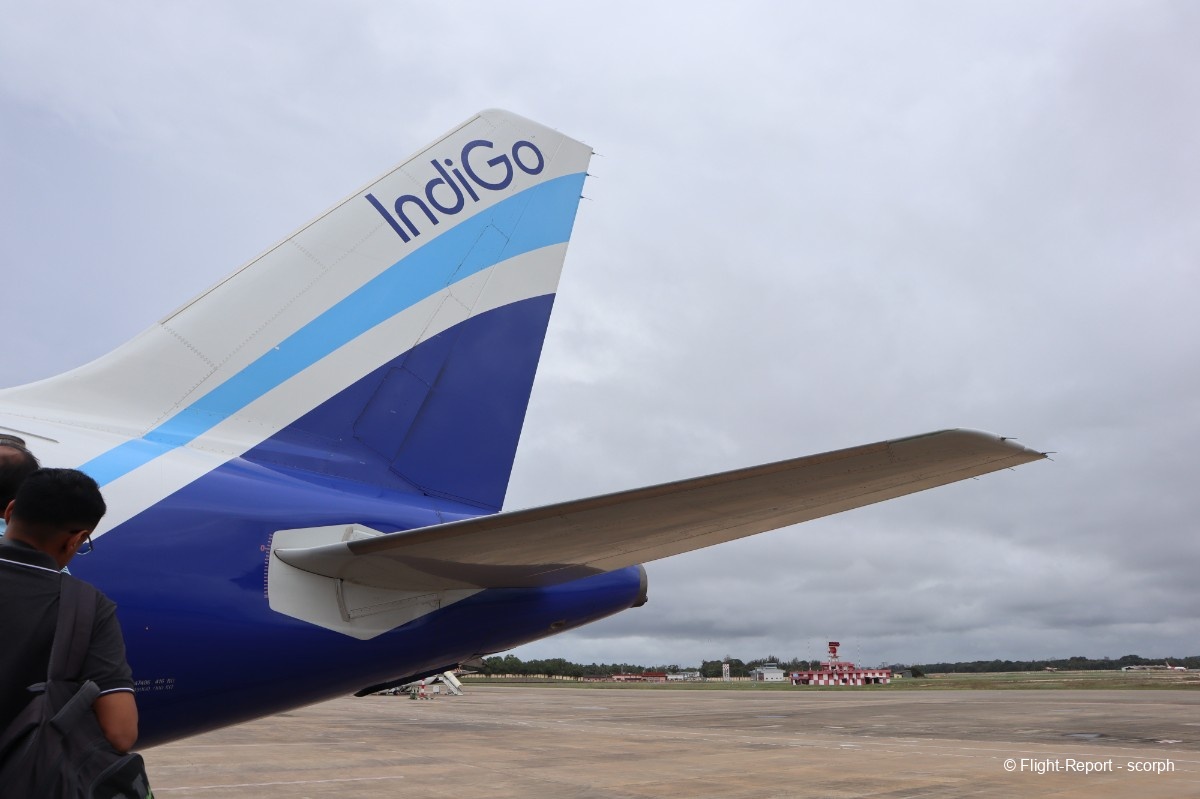
On board Indigo A321neo
We will be the last to board, and the stewardess at the rear door will close the door behind us after welcoming us with a large smile. You will notice this rather rare configuration, with no separation between the last row and the rear galley area.
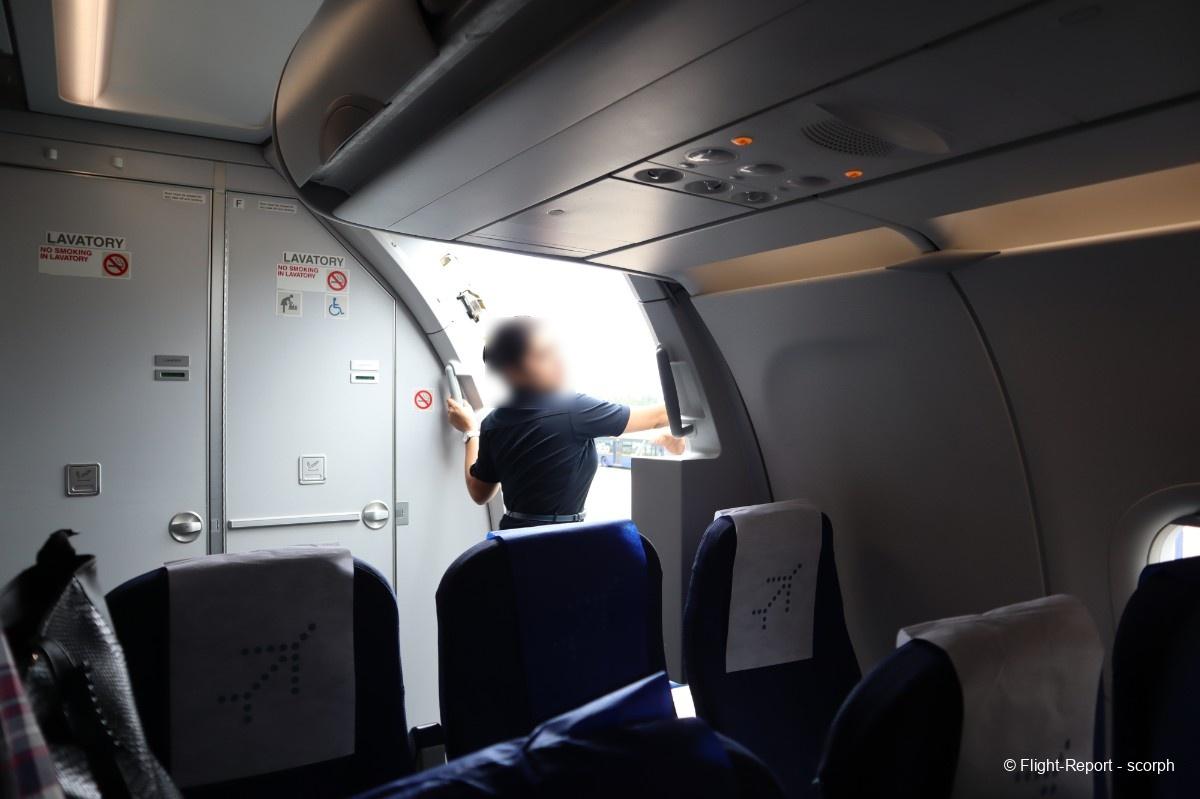
On board, there is, unsurprisingly, the typical low-cost cabin with fairly simple and slim seats. These are the relatively uncommon Zodiac Z85 seats in the blue colors of the Indian low-cost airline. Contrary to their appearance, they are quite comfortable, at least more than enough for the long hour-long flight ahead of us.
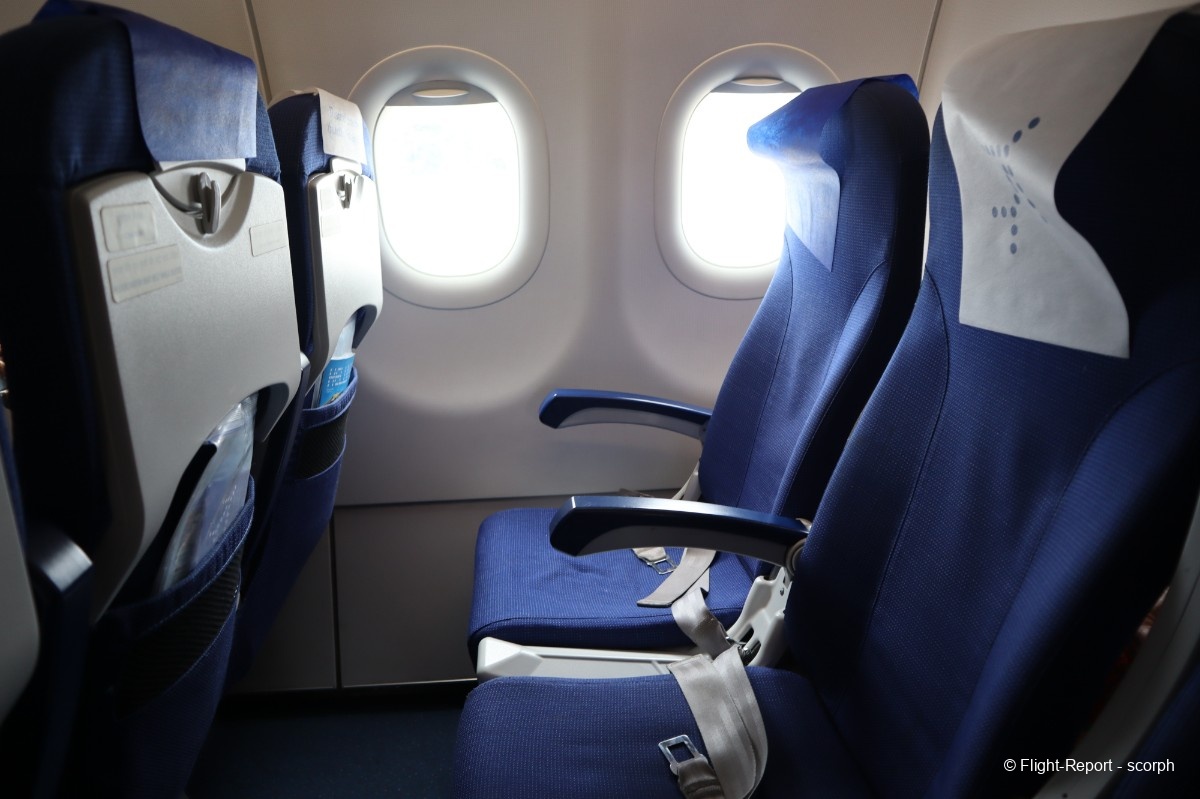
With a 29" seat pitch, it's adequate without being spectacular, though the average Indian passenger isn't particularly large or tall either.
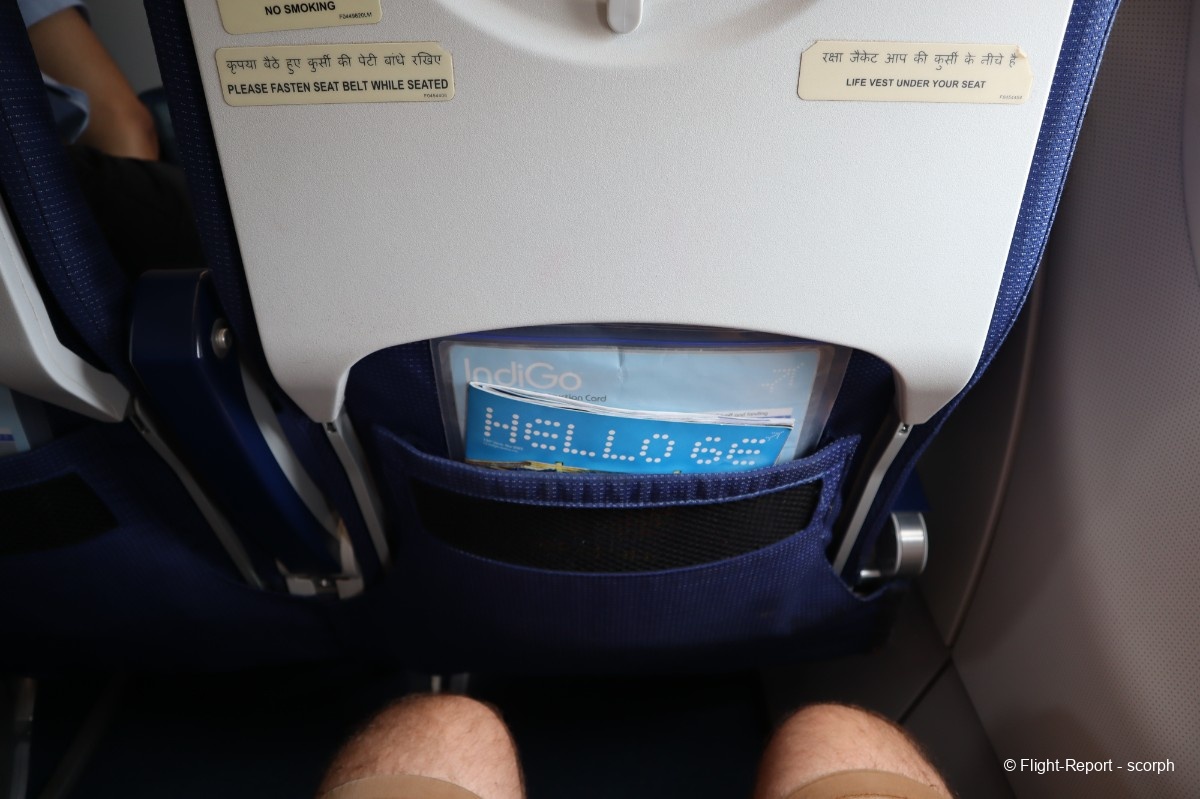
The cabin is about 80% full, and therefore the flight not completely booked. The prices remain quite reasonable for these short domestic flights in India, but still too expensive for the vast majority of the population.
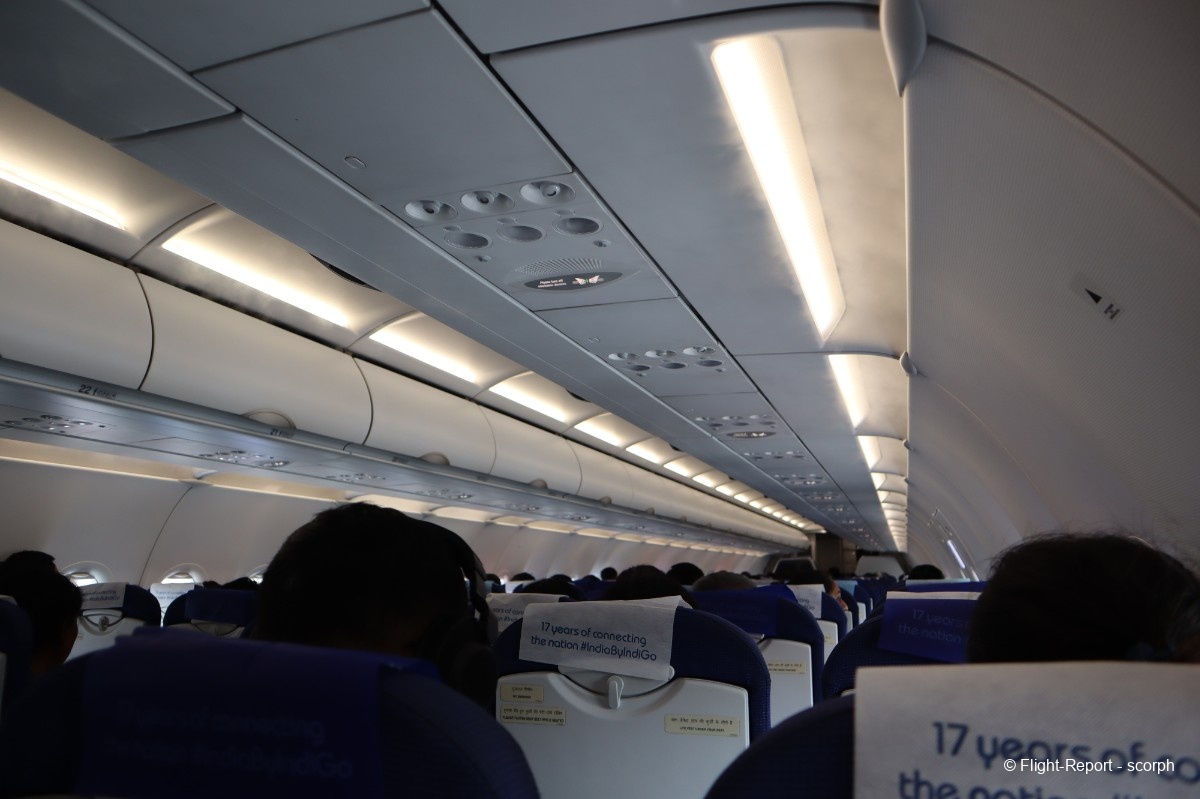
The latest-generation overhead lighting for the A321neo. The aircraft's air conditioning is running at full power, which is causing condensation vapor in the cabin.
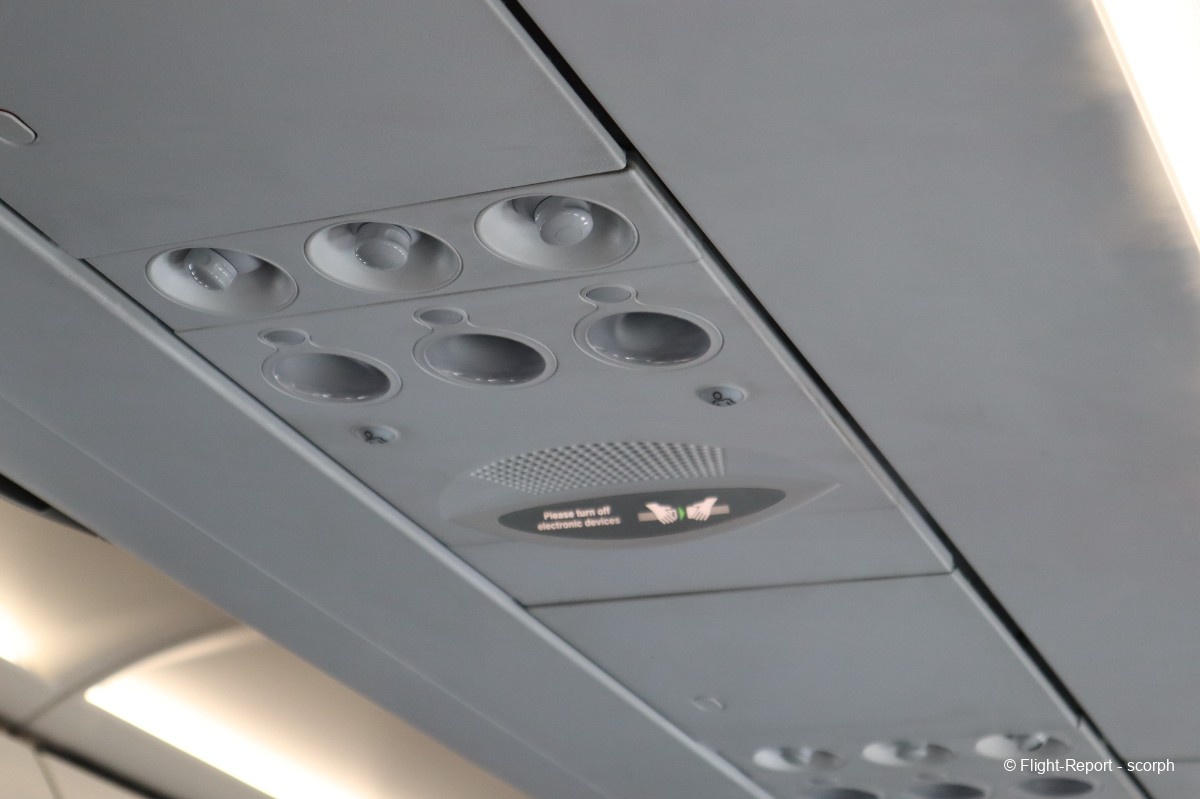
The cabin layout provided by Aerolopa shows, unsurprisingly, a very dense configuration with 232 seats in economy, but let's remember that the A321neo is certified for up to 244 passengers.

The view from the window is quite well aligned with the seat in this row 24.
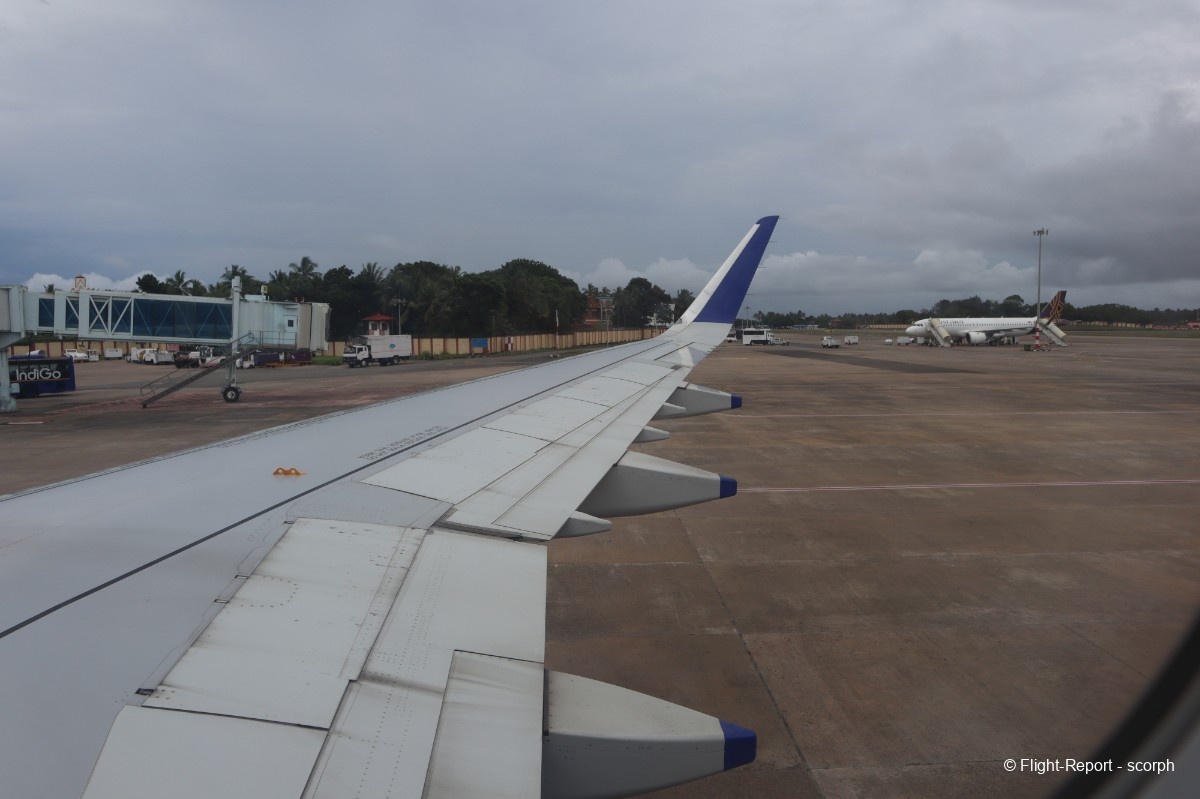
Next to us, we can see this Vistara Airbus A320neo, which operates a flight from the capital, Delhi.
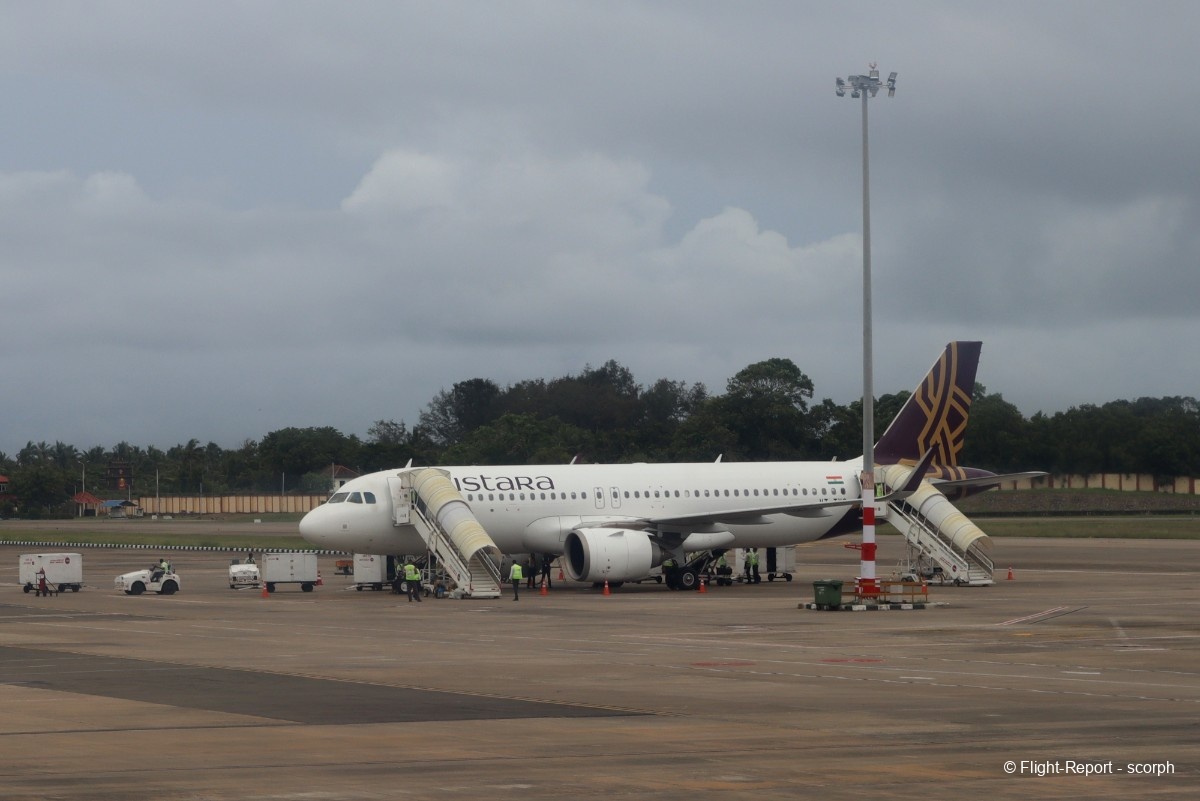
We will push back right on time, which is no surprise, IndiGo is known for being one of the most punctual airlines in India, well ahead of its counterparts in the subcontinent.
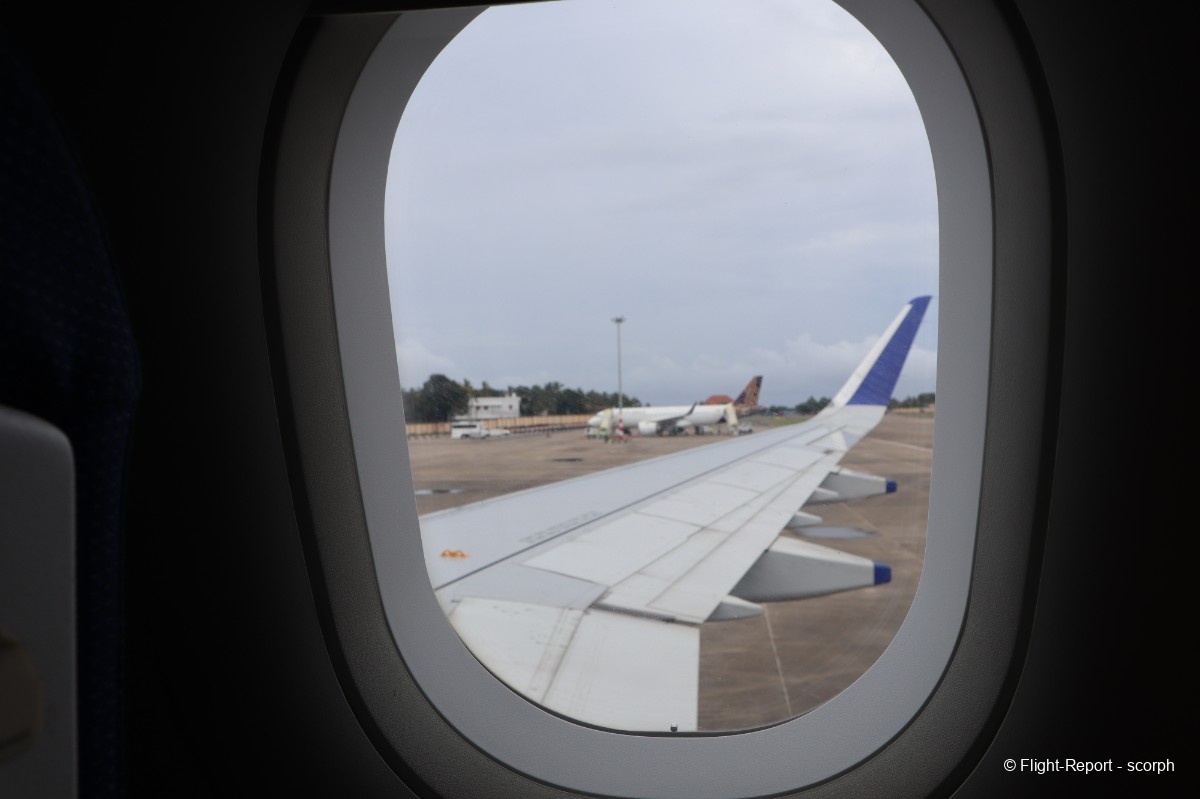
We leave the vintage Terminal 1 behind us. In fact, this report will soon have historical value, as this old building is set to be soon demolished to make way for a new domestic terminal.
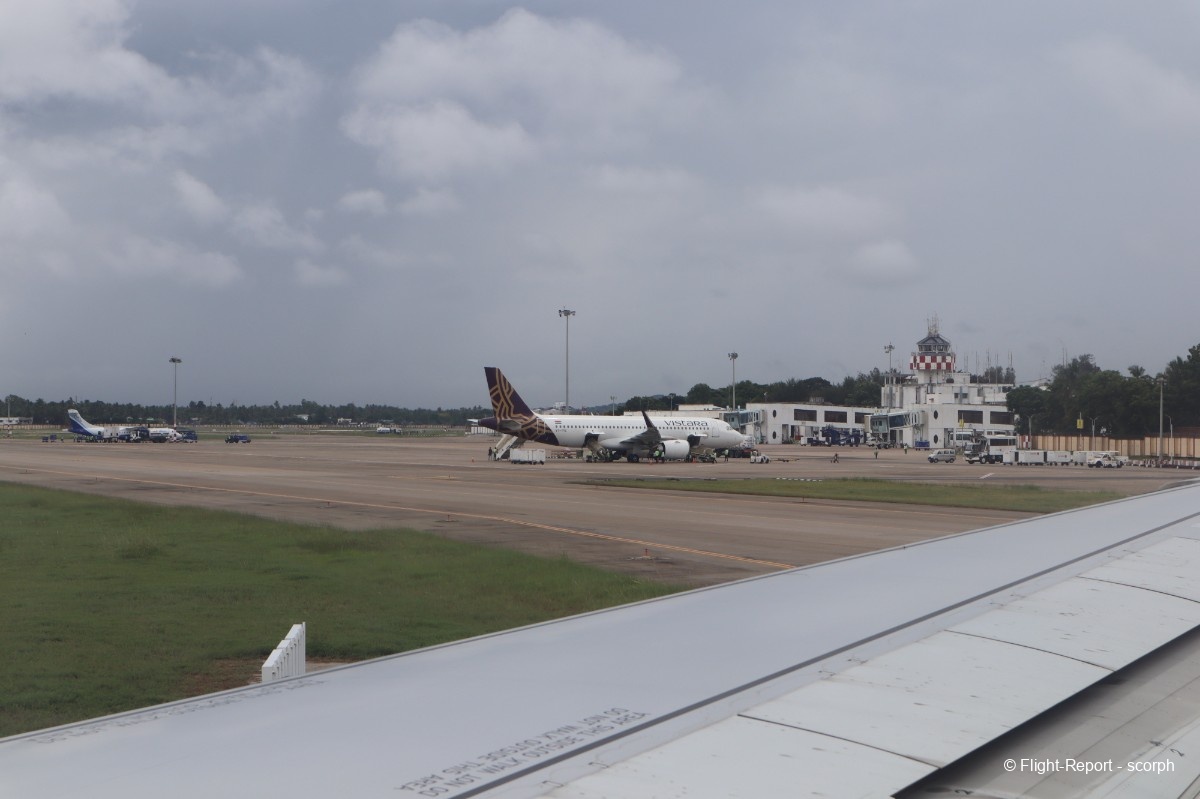
And we head toward the taxiway that serves the airport's only runway. This takes us alongside Terminal 2, which handles international flights. In fact, it will be the one to accommodate domestic flights during the construction of the future T1.
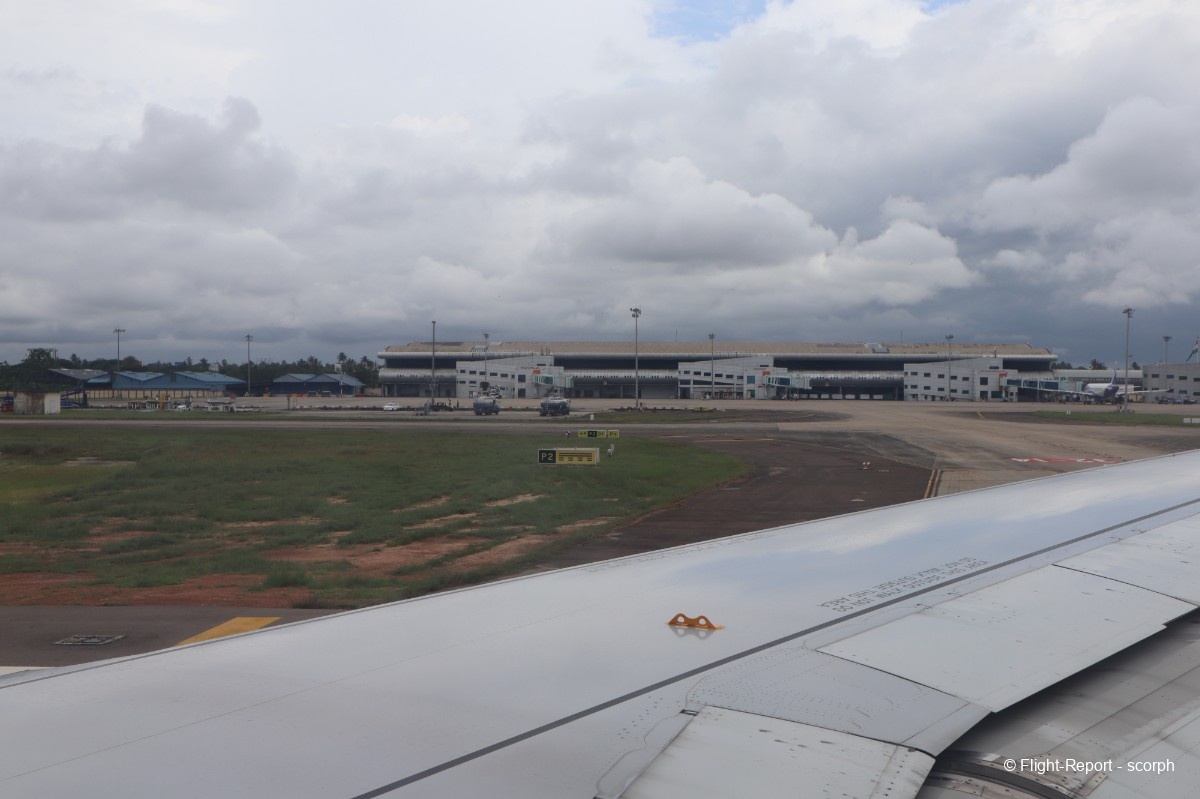
We also pass close to the hangars used by Air India Express for maintenance operations on their fleet of Boeing 737s.
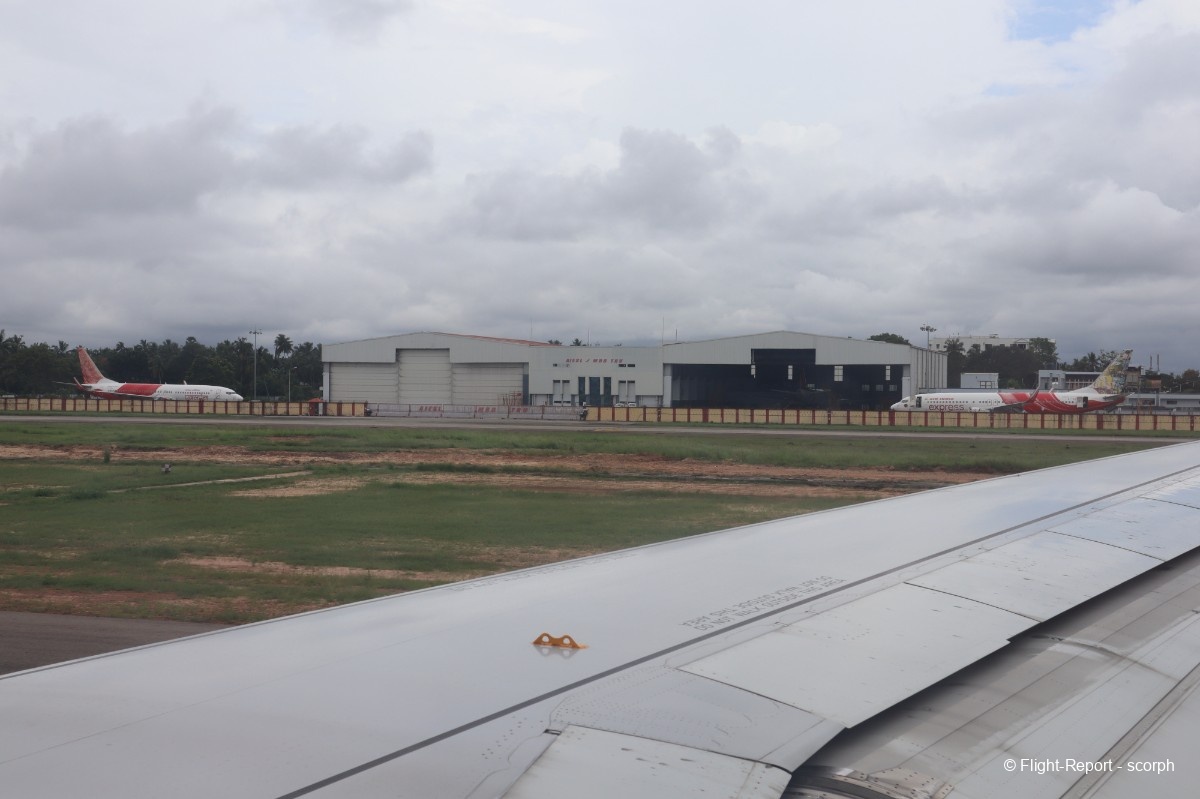
Like in Madurai, the taxiway doesn't cover the entire length of the runway, so it's necessary to back track a portion of it before alignement for takeoff. This morning, our departure will be from runway 14.
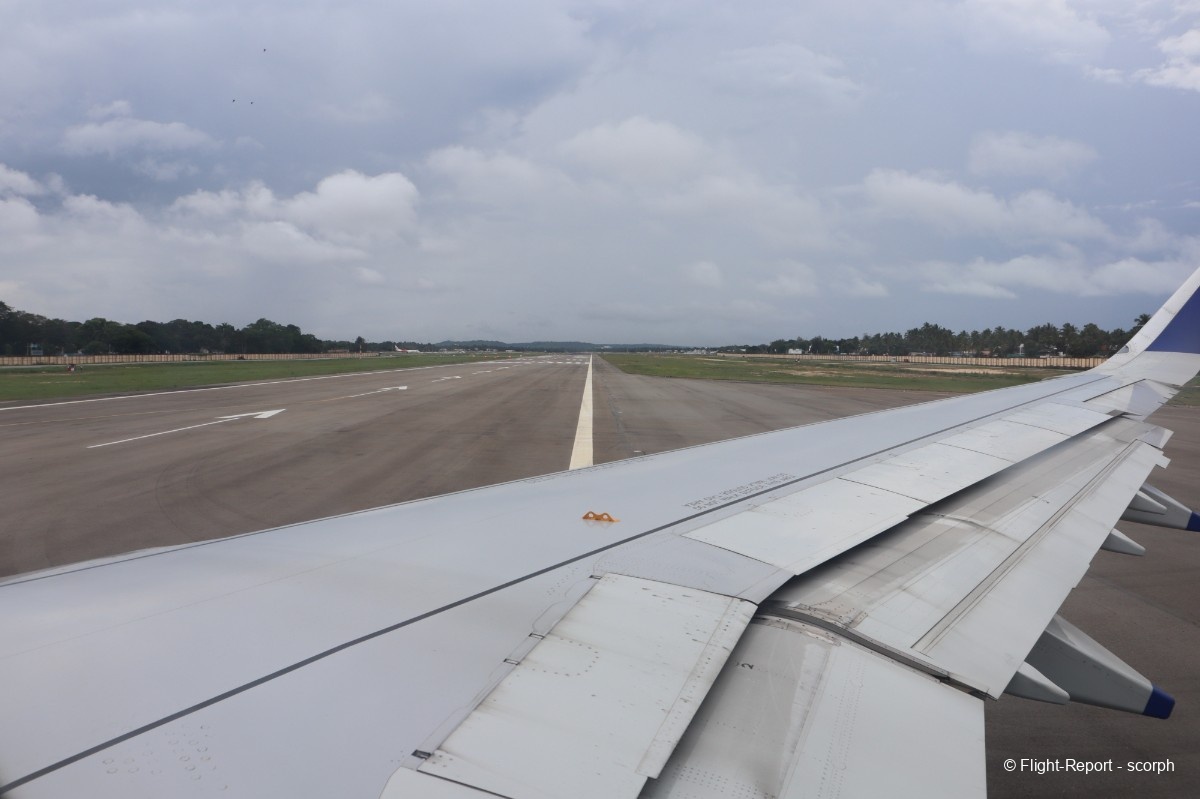
Our pilots push both of our P&W 1100-G engines to takeoff power, and the A321neo begins to accelerate down the runway.
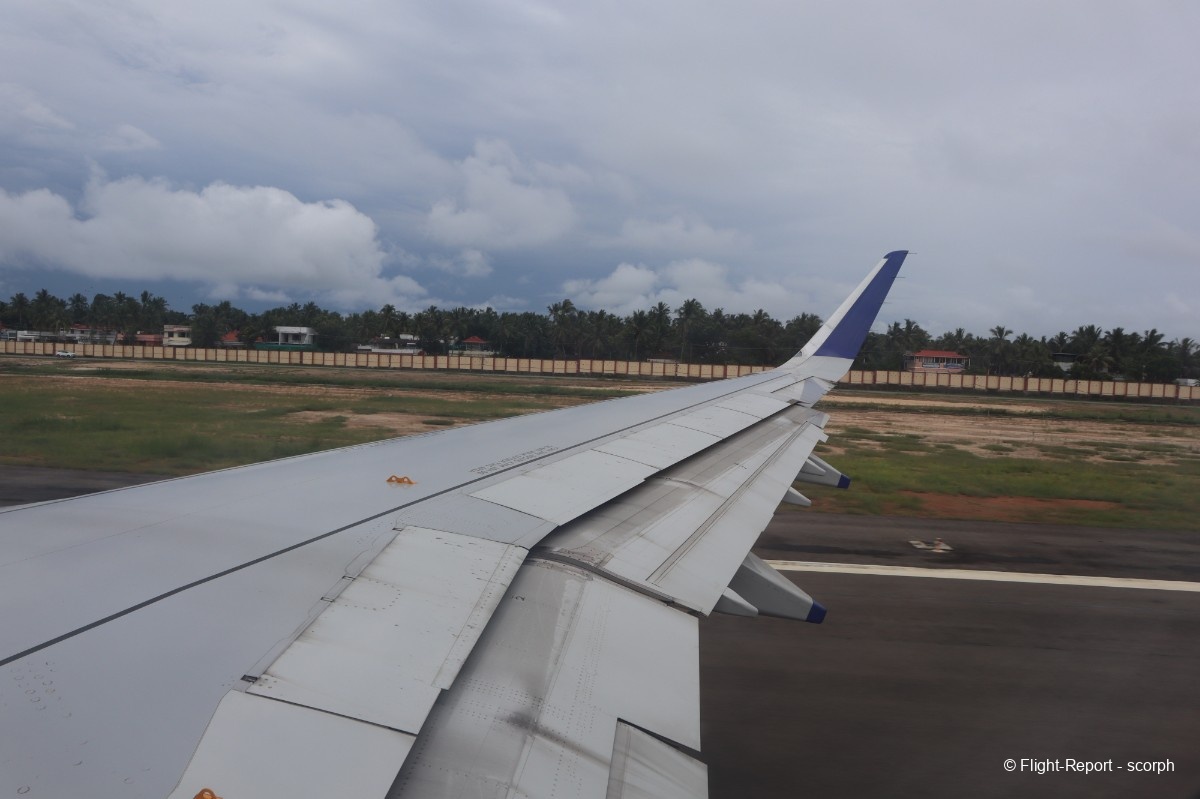
We quickly gain altitude above the T1 facilities, from where we just boarded. You can see that the airport was built on the shores of the Arabian Sea.
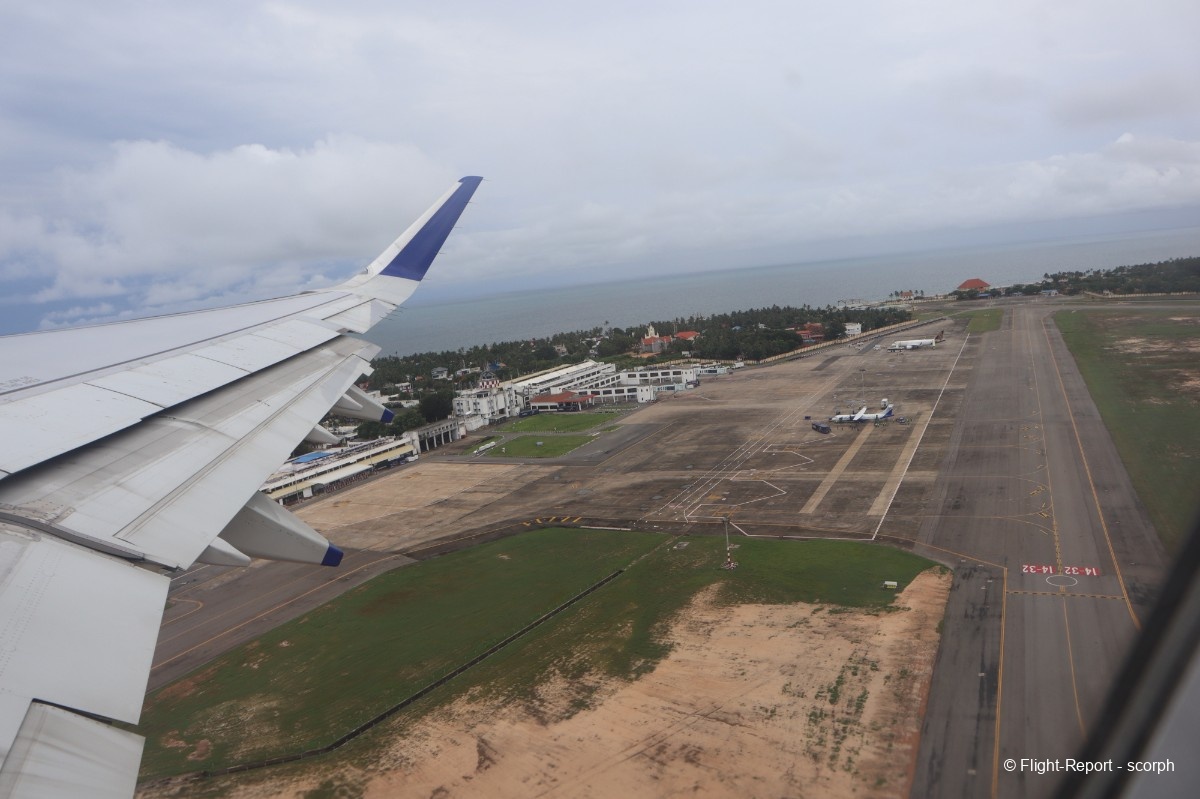
We climb above the residential neighborhoods along the coastline, which form the southern suburbs of Thiruvananthapuram. Before making a right turn to minimize noise pollution, we'll notice a few colorful mosques, a religion that is very present among the fishermen of Kerala.
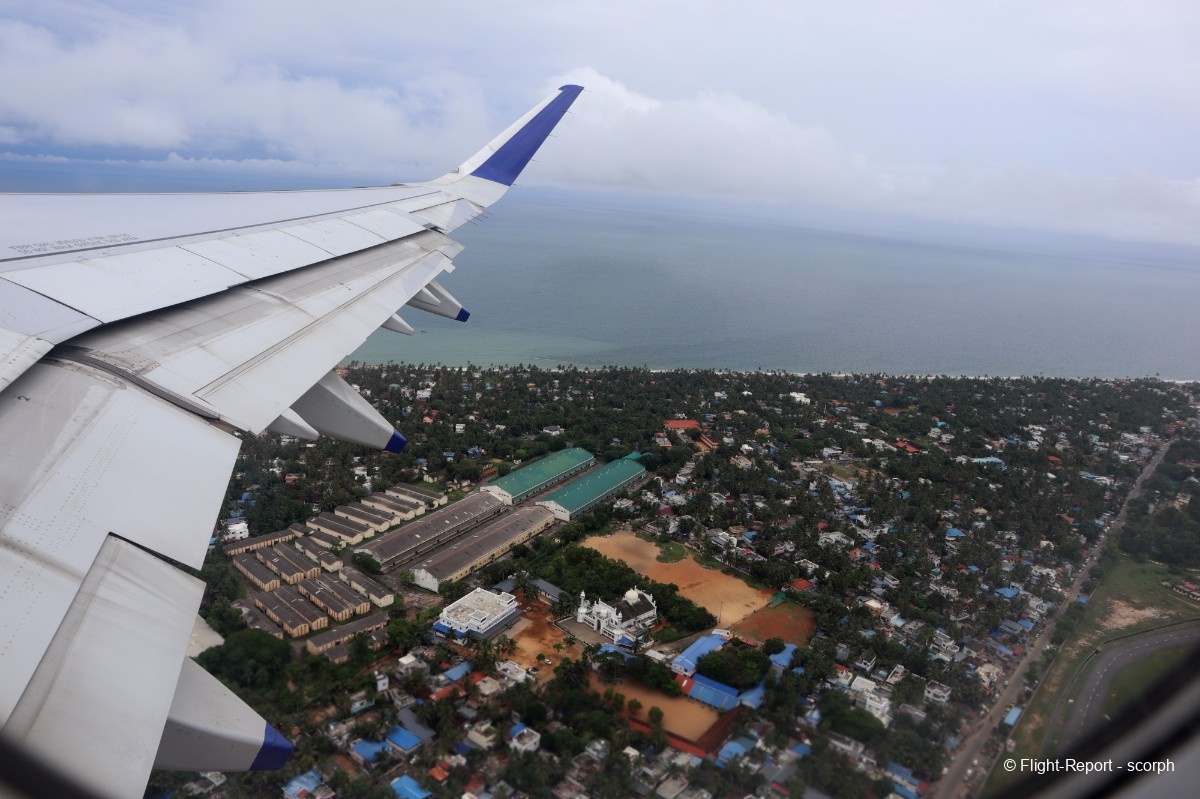
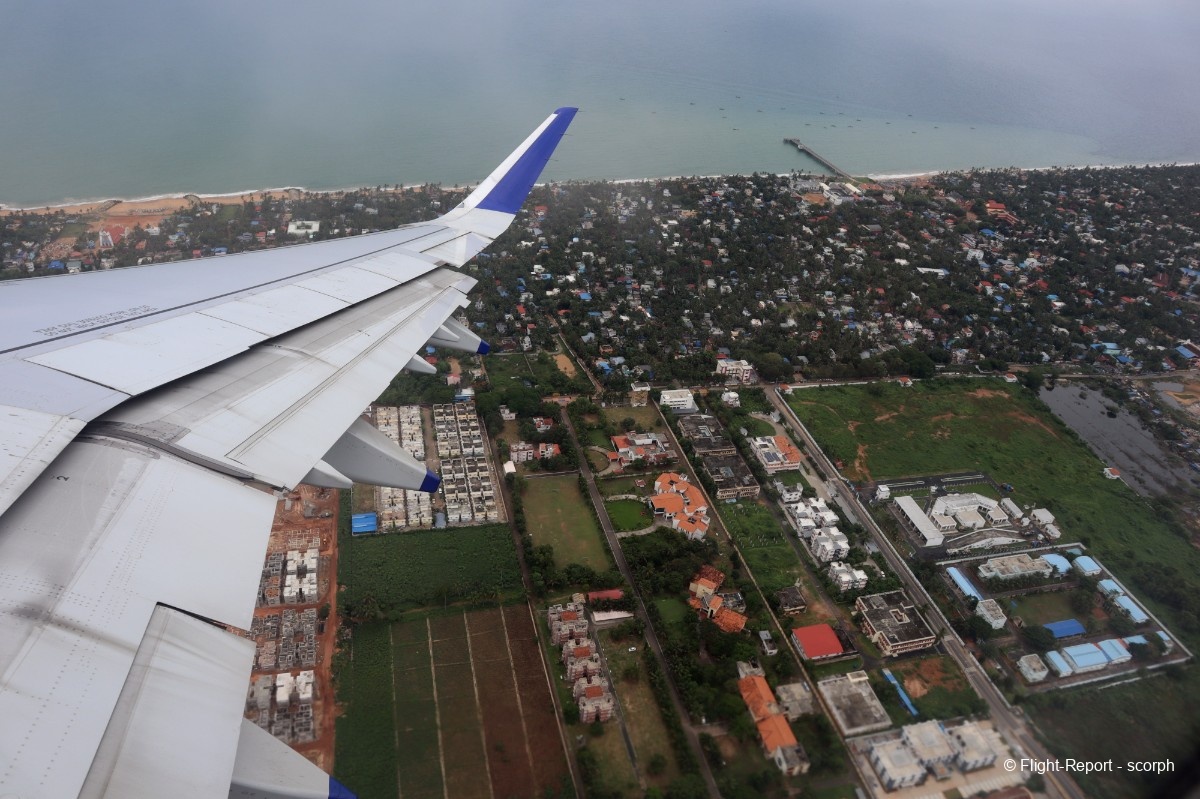
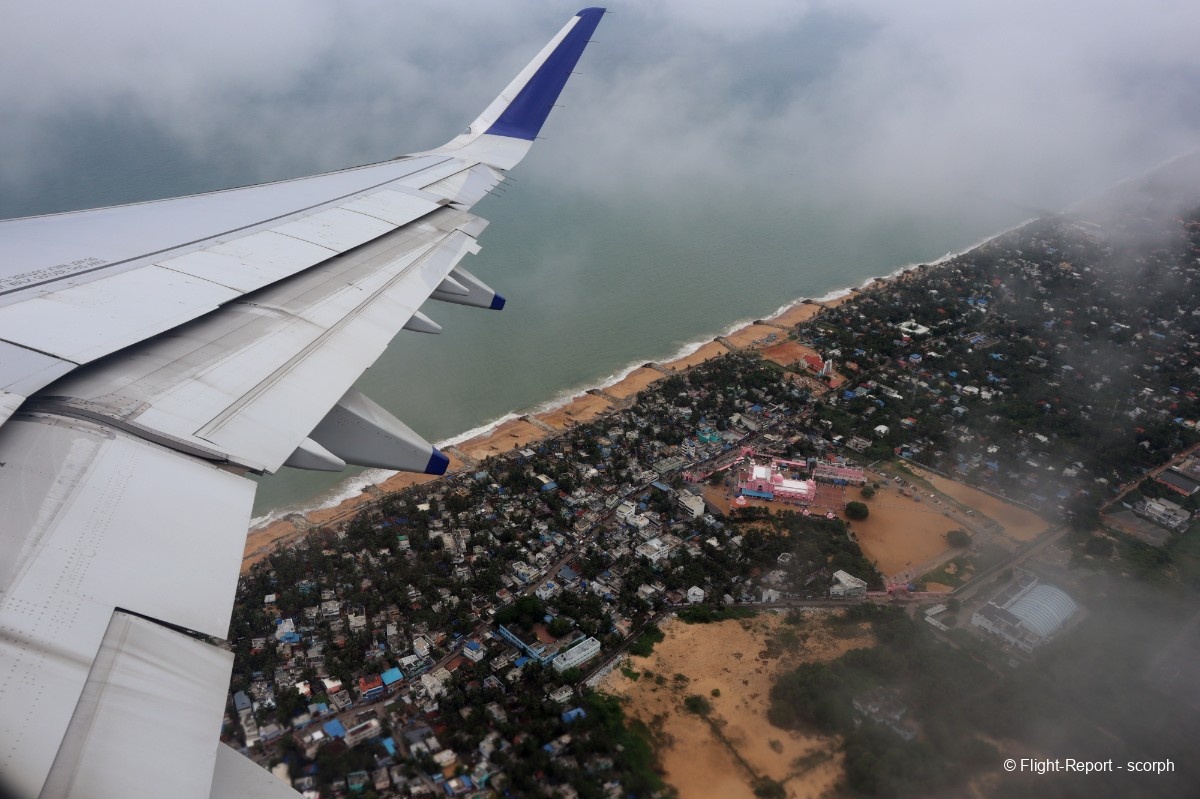
We head out to sea, even though it's in the opposite direction of our destination.
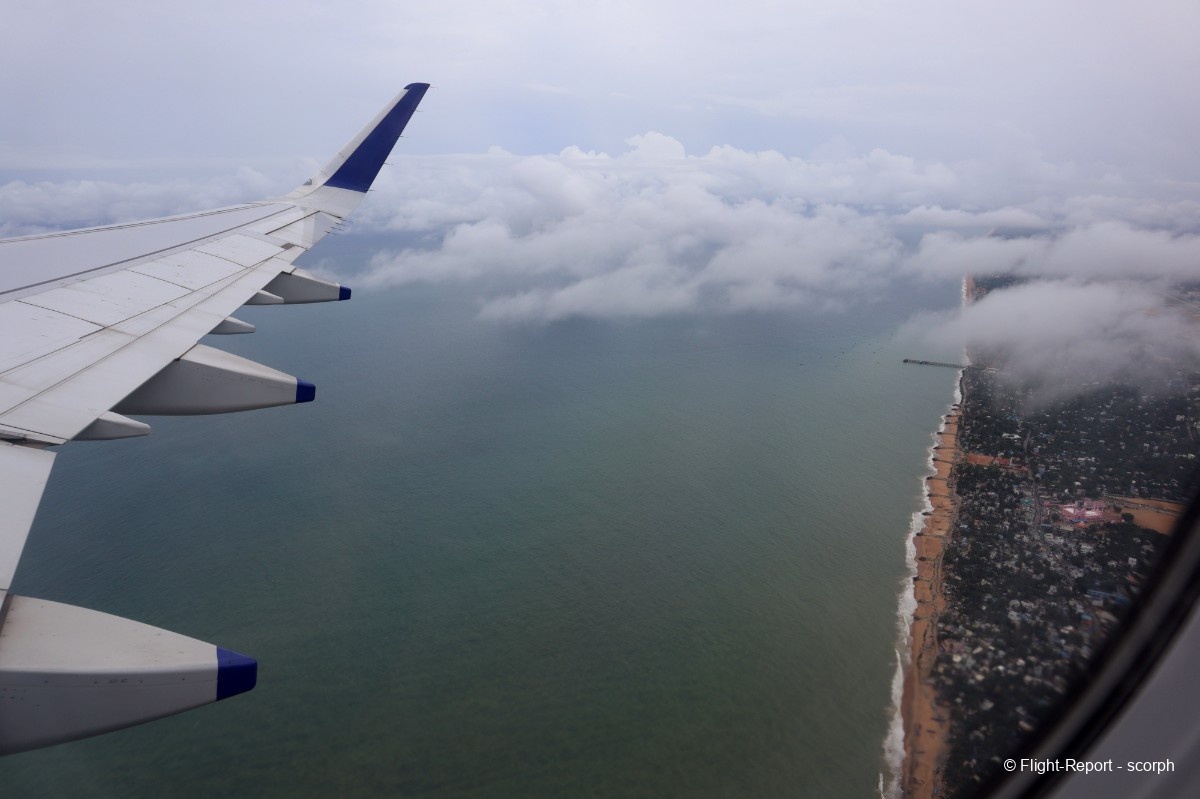
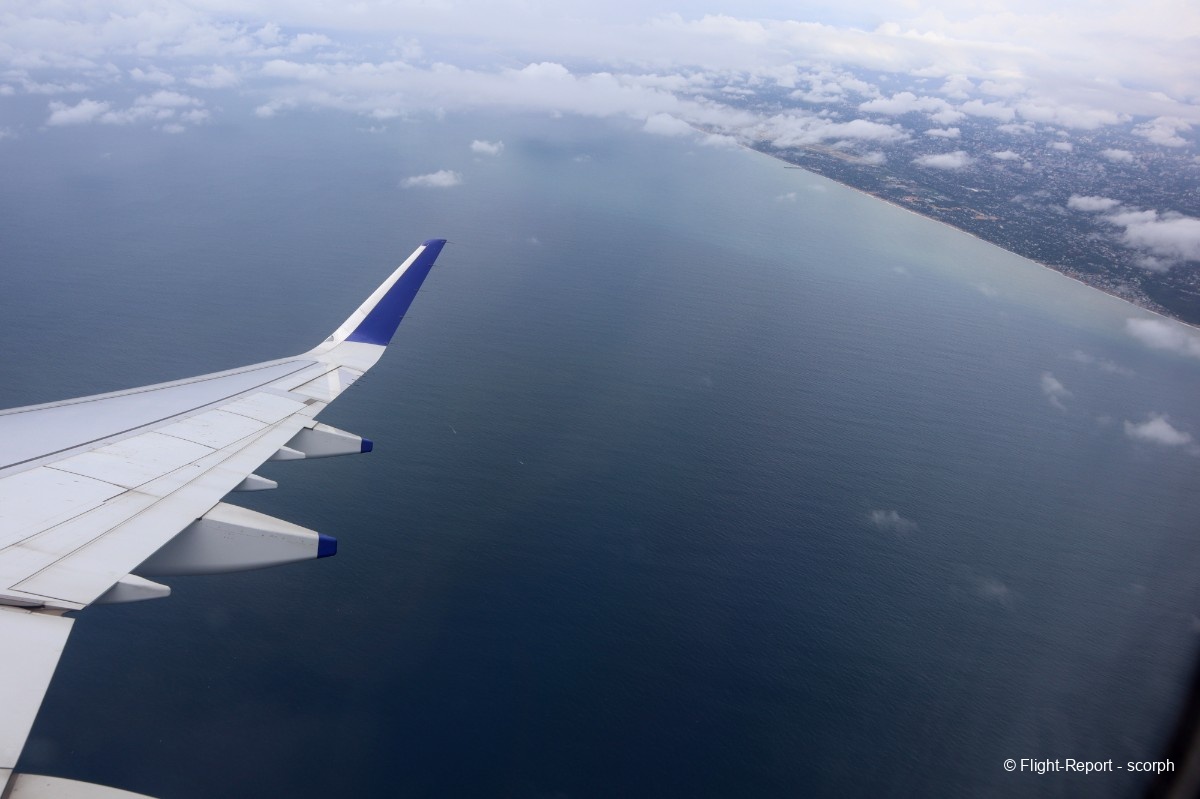
All of this is to make a 360° turn over the sea and gain altitude.
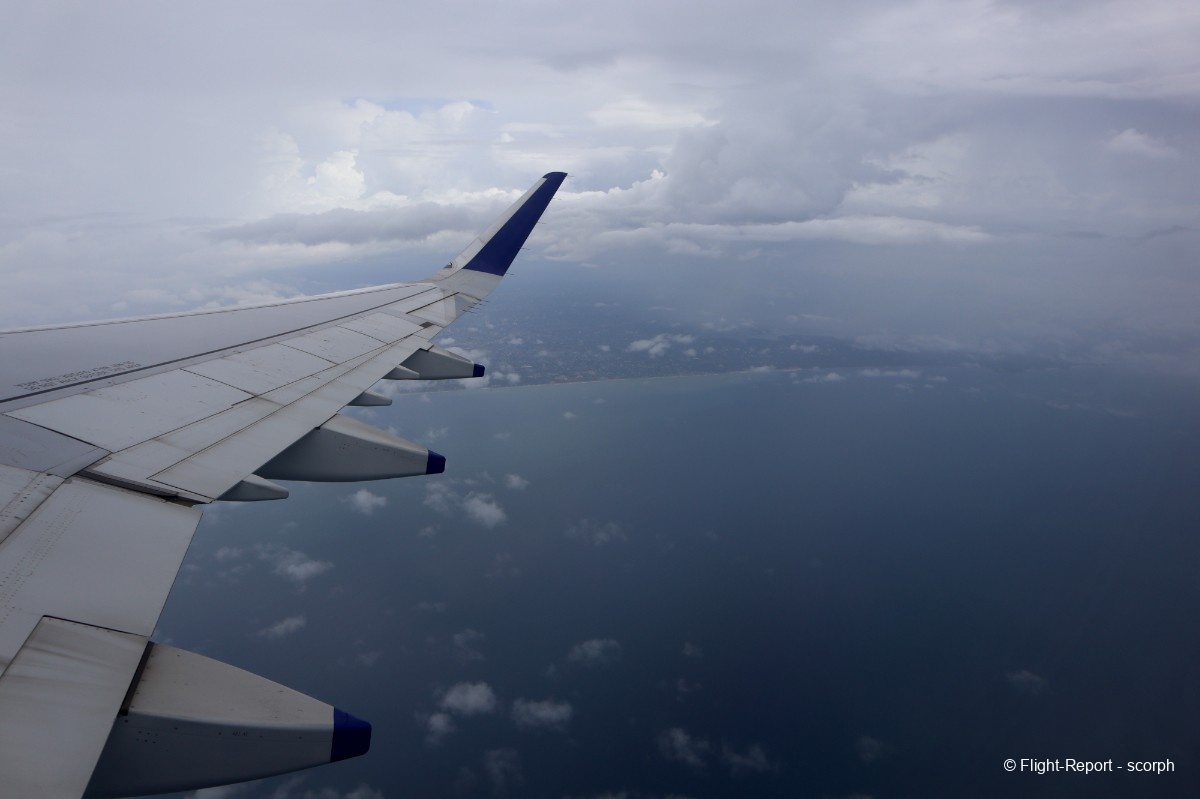
Before turning back toward the coast, this time passing to the north of Trivandrum. However, it won't be long before the clouds blocking the view of the ground.
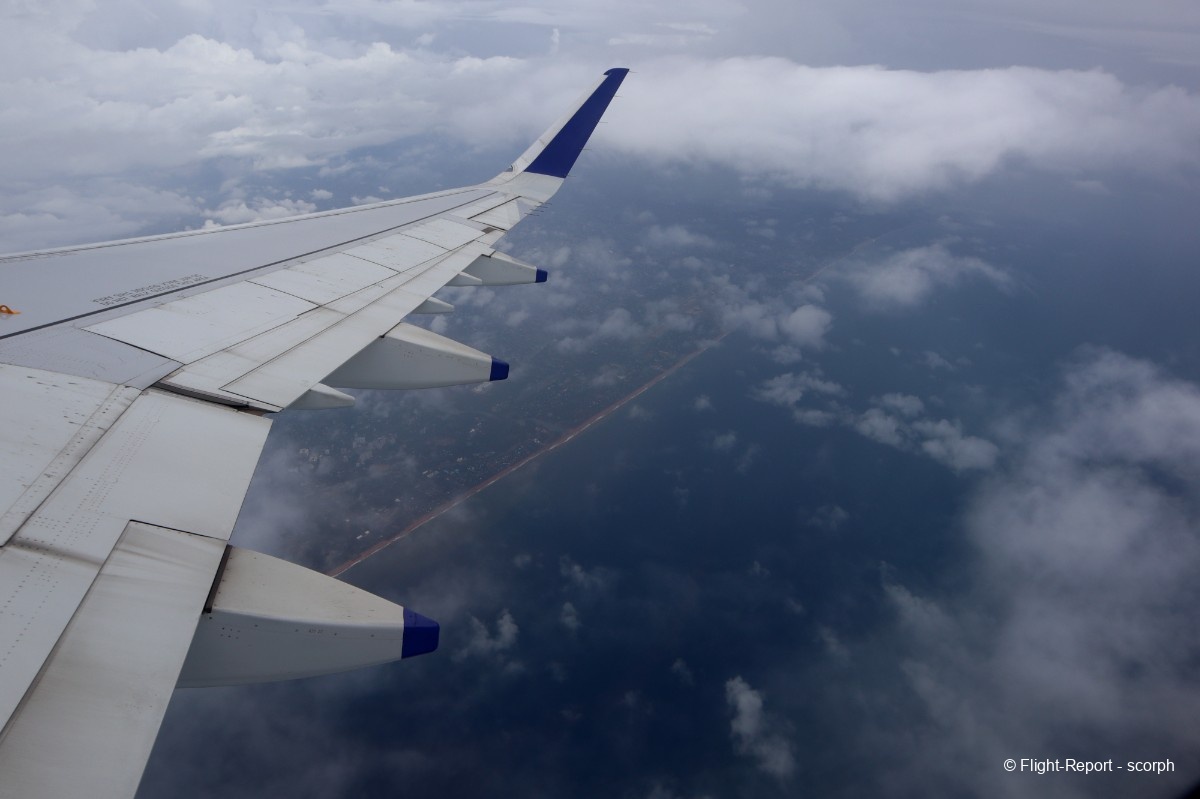
As often in India, the view during the cruise will look like this. Notably, the Indigo blue winglet blends nicely with the color of the sky.
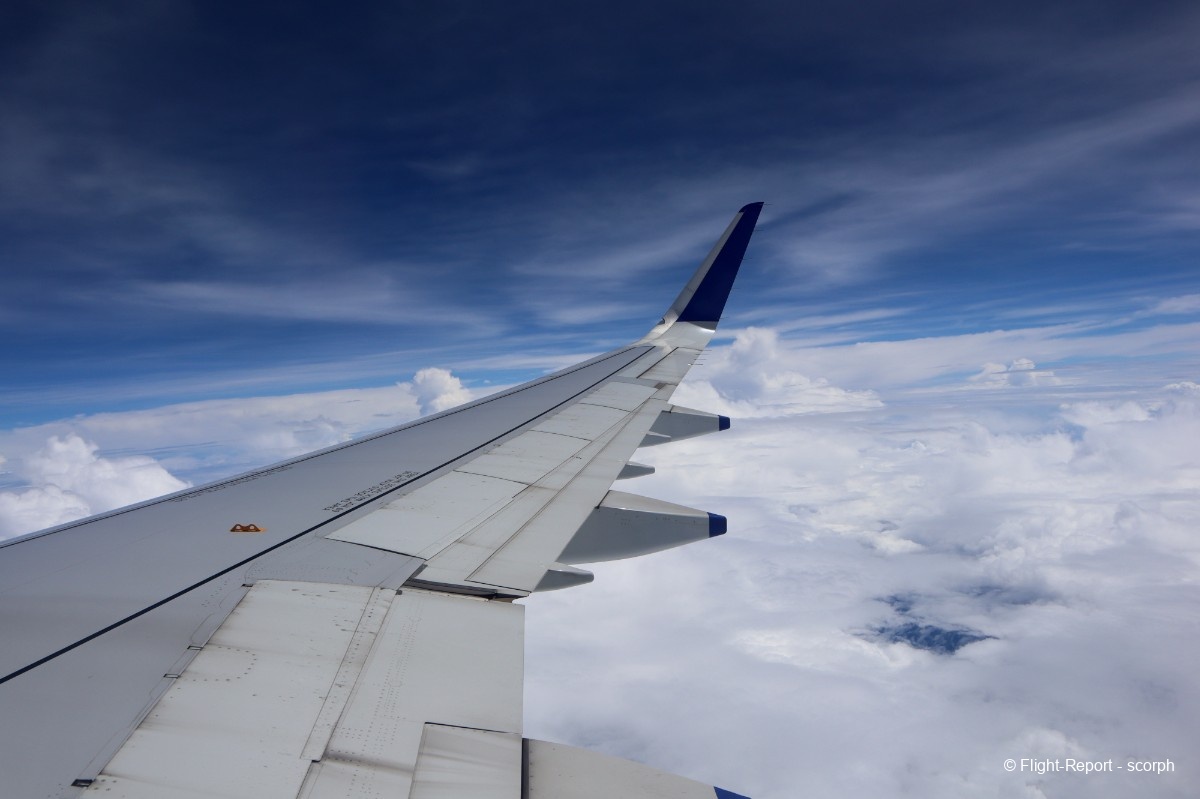
Inside the cabin, the atmosphere is calm, and shortly after takeoff, the flight attendants will begin the service, starting with pre-ordered items. It's worth mentioning that the only fare that doesn't include catering with 6E is the mini fare.
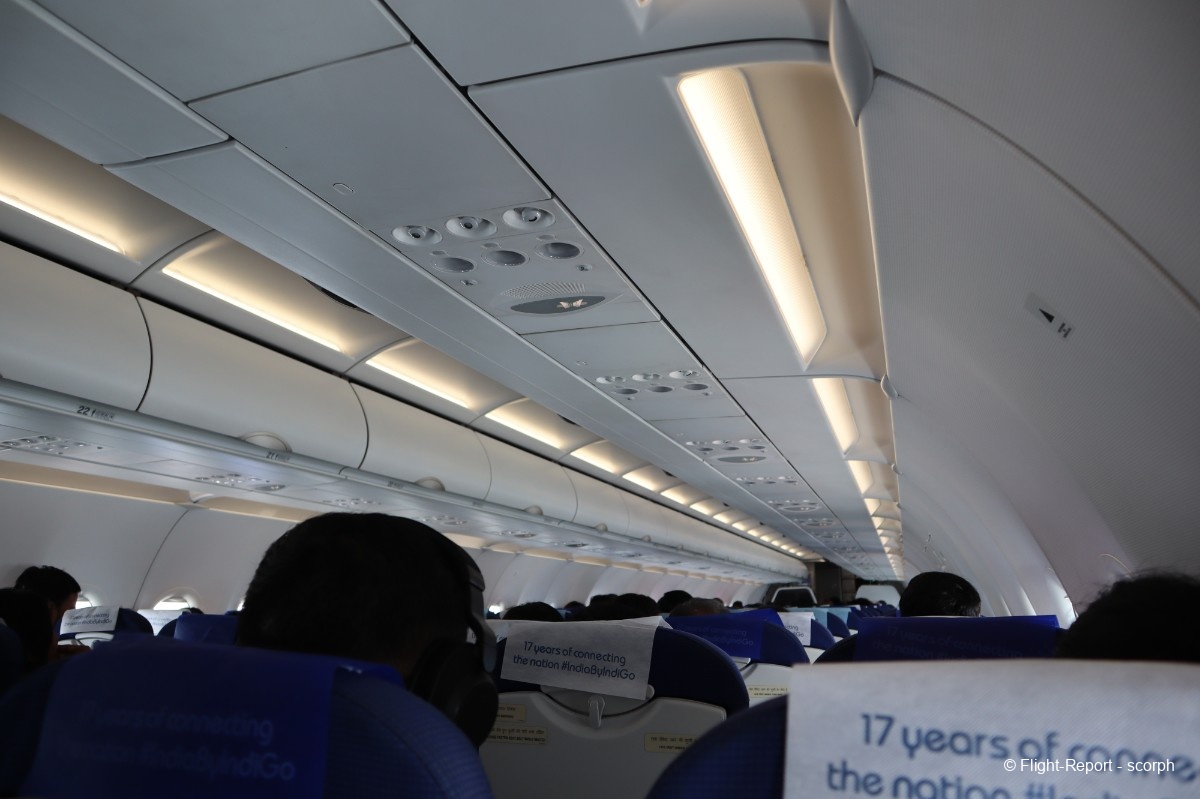
If you want to make a purchase from the trolley, that's possible. Here's the menu: each meal or snack comes with a drink. Expect to pay 200 INR (2.50€) for a snack and 400 INR (5€) for a small hot meal. Again, the prices are quite cheap when viewed from a European perspective.
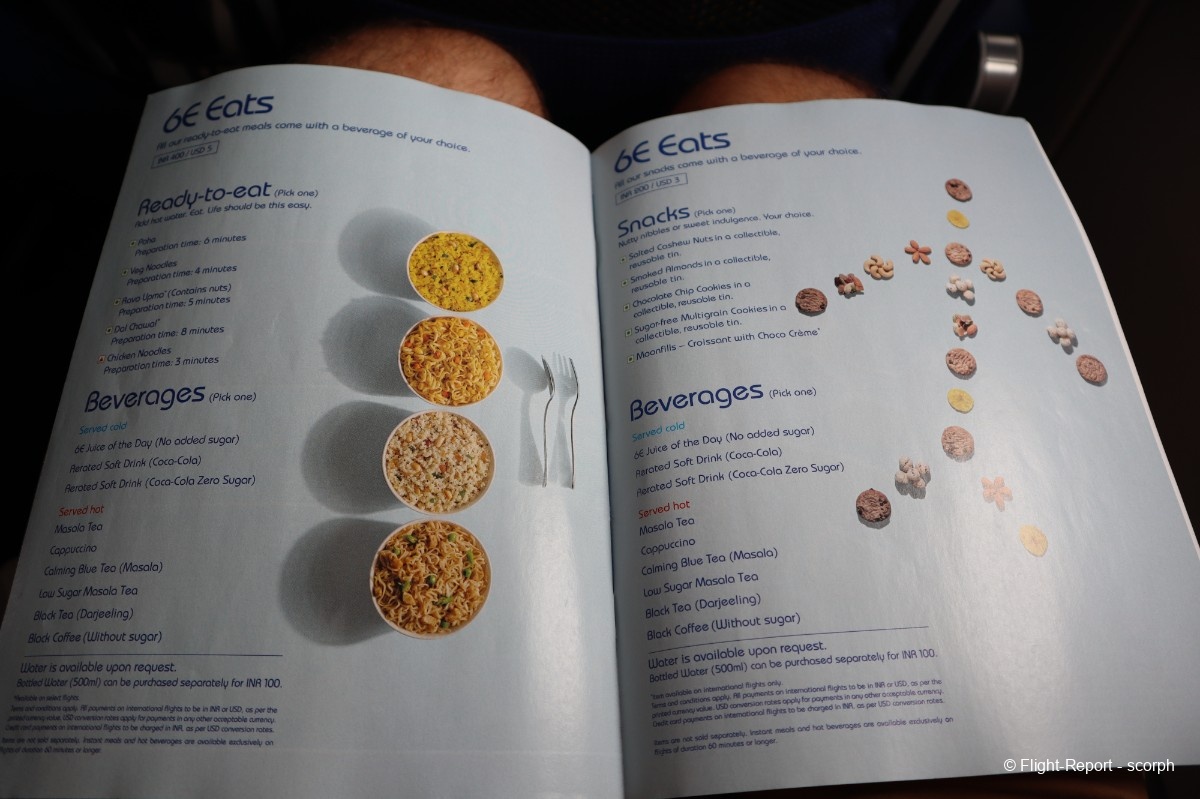
The flight attendants will then make a round with trays and cardboard cups filled with water free of charge, a nice gesture for a low-cost airline.
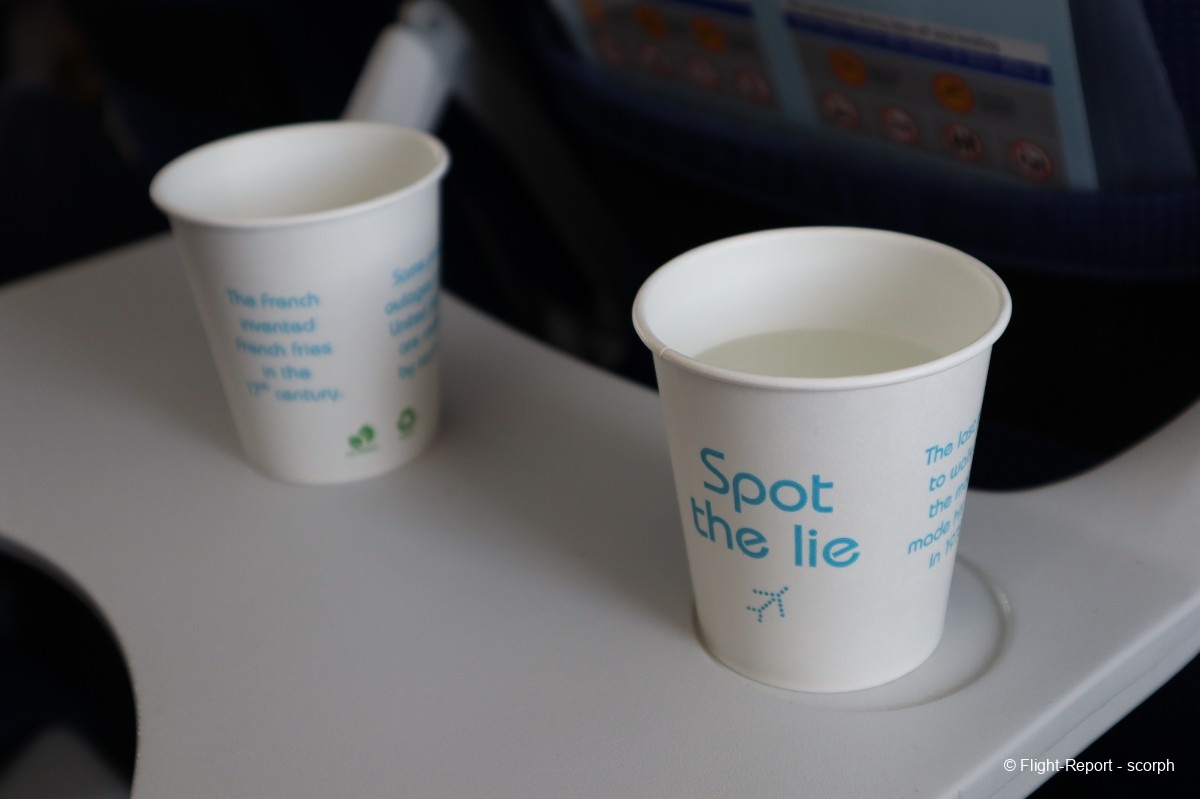
I’m not presenting things properly, as I’ve already shown you the pages related to the Bob section of the airline's magazine 'Hello 6E'… here is the rest of the contents as well as the safety card dedicated to the A321neo.
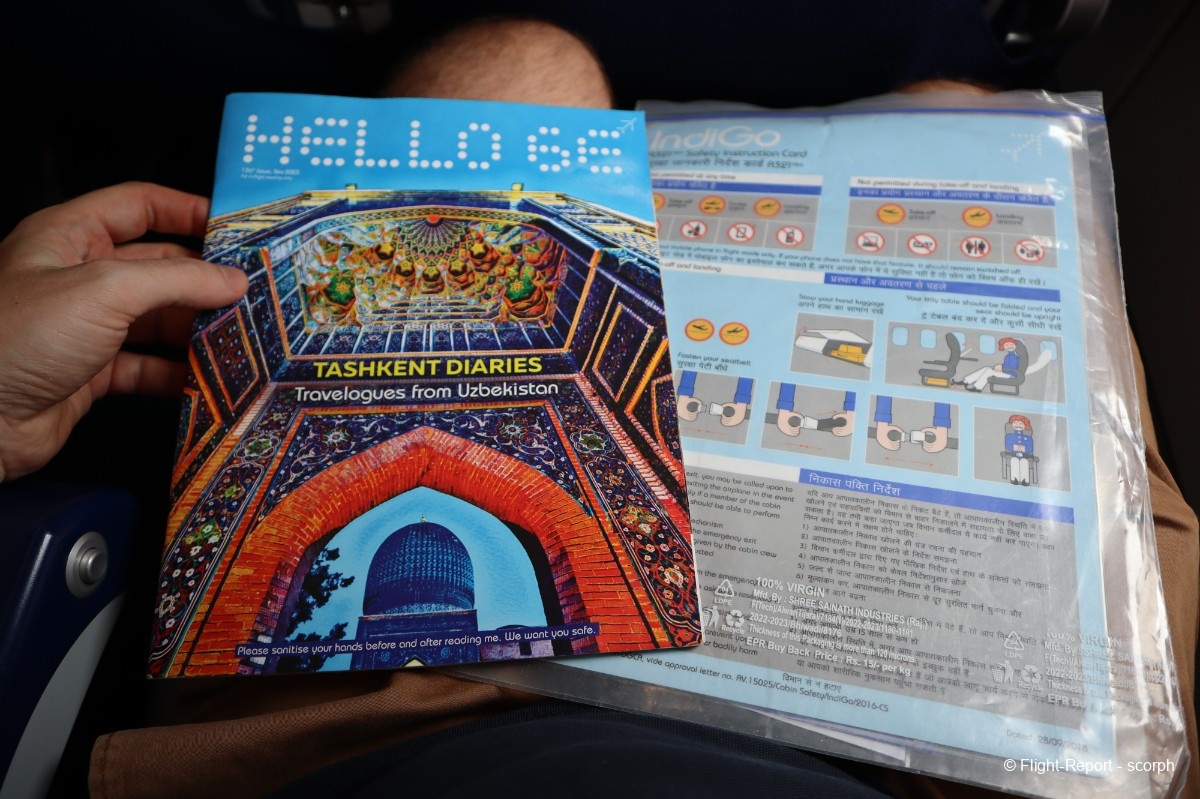
There's a nice article on Uzbekistan, one of the new destinations launched by Indigo from Delhi. It can also be seen on the list of destinations, with an extensive offering on the domestic market but fewer than forty destinations outside of India. Most of the destinations marked in green on the map are code-share flights with TK, with the India-Istanbul flights operated by Indigo using its high-density Boeing 777-300ERs leased from TK.
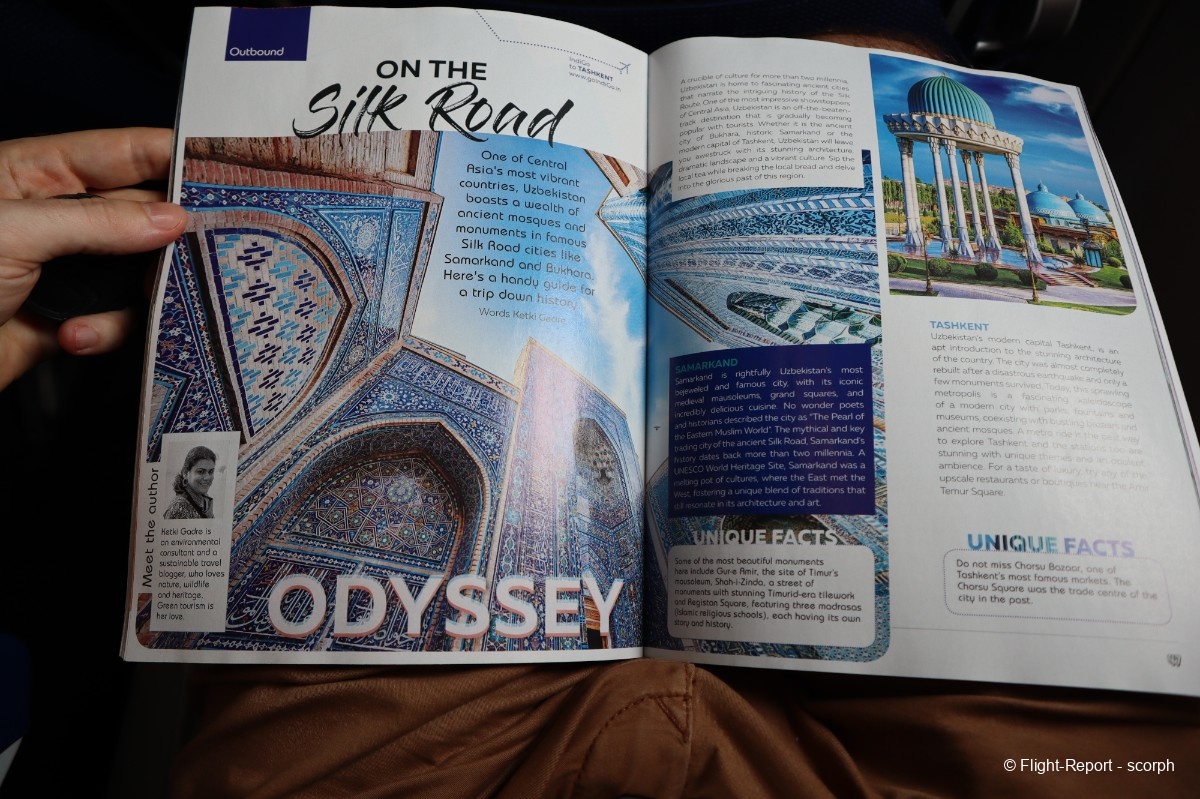
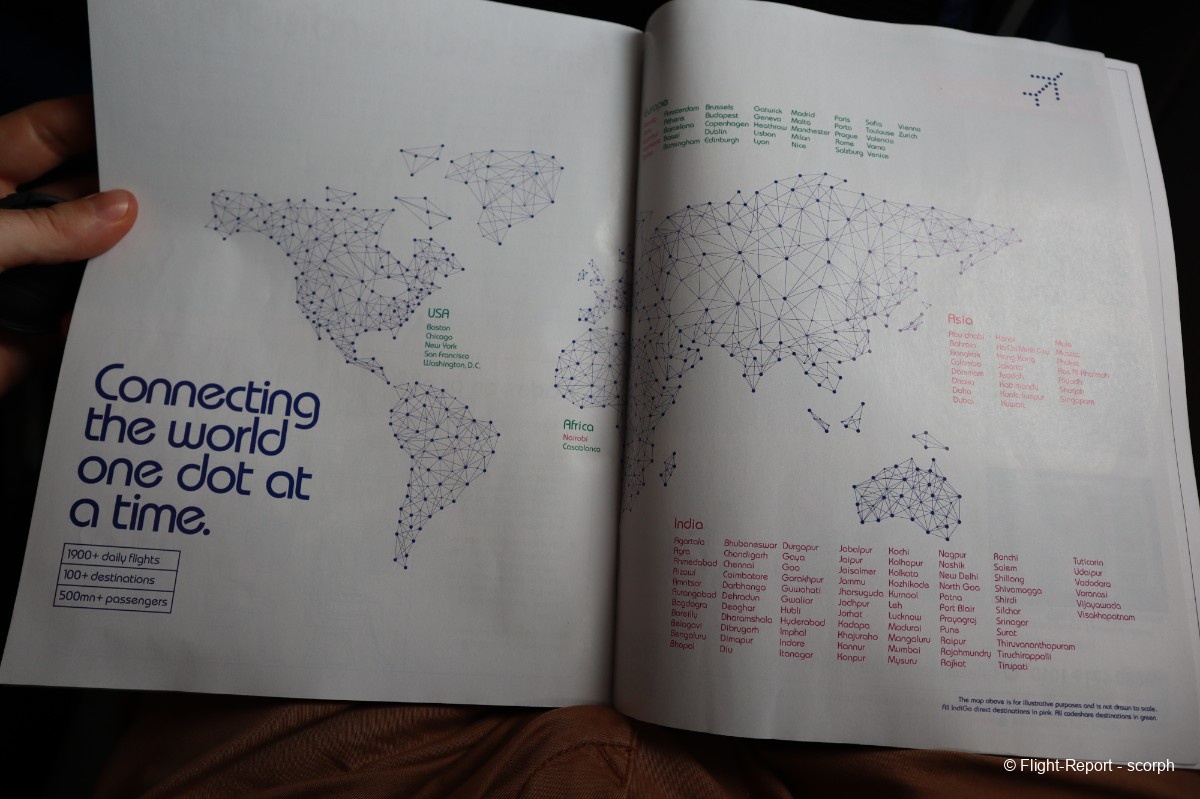
The cruise continues very smoothly, with not a hint of turbulence, and in the silence provided by the neo engines, which are noticeably quieter at every part of the flight.
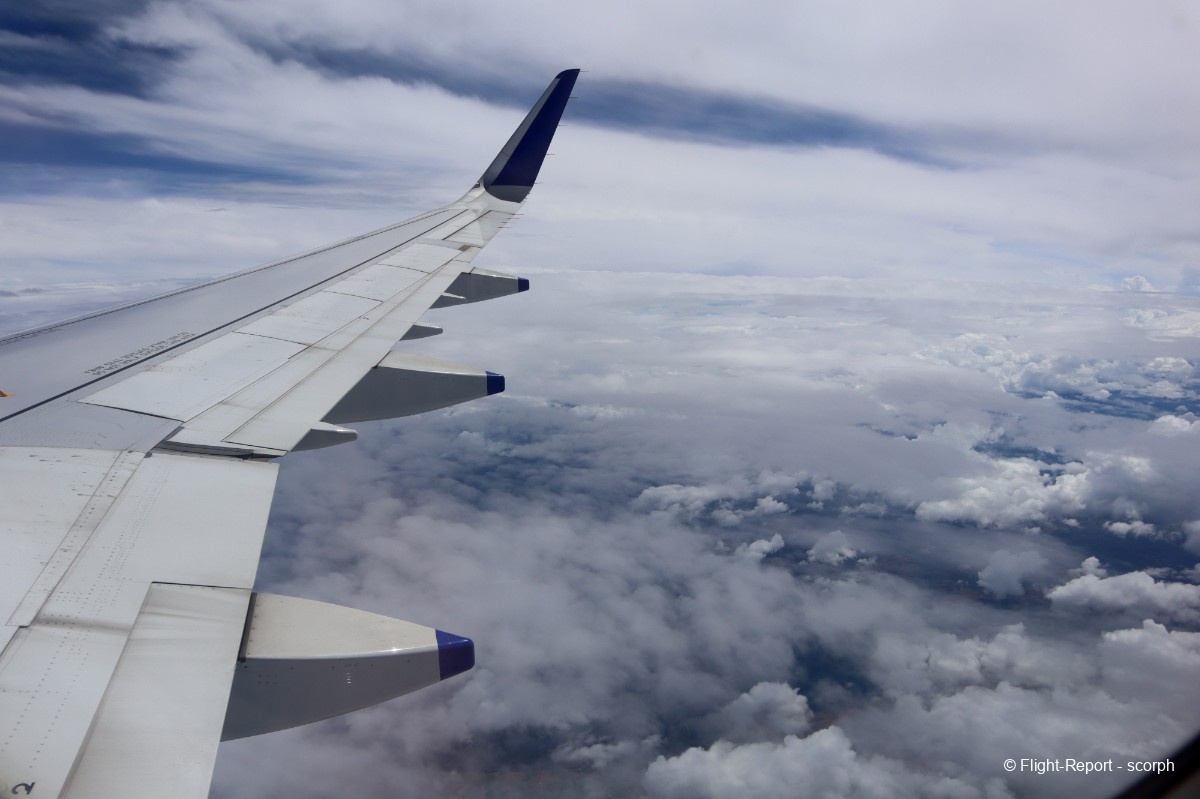
Route of the day taken by our flight, with a respectable cruising altitude of 35,000 feet for this flight of less than an hour.
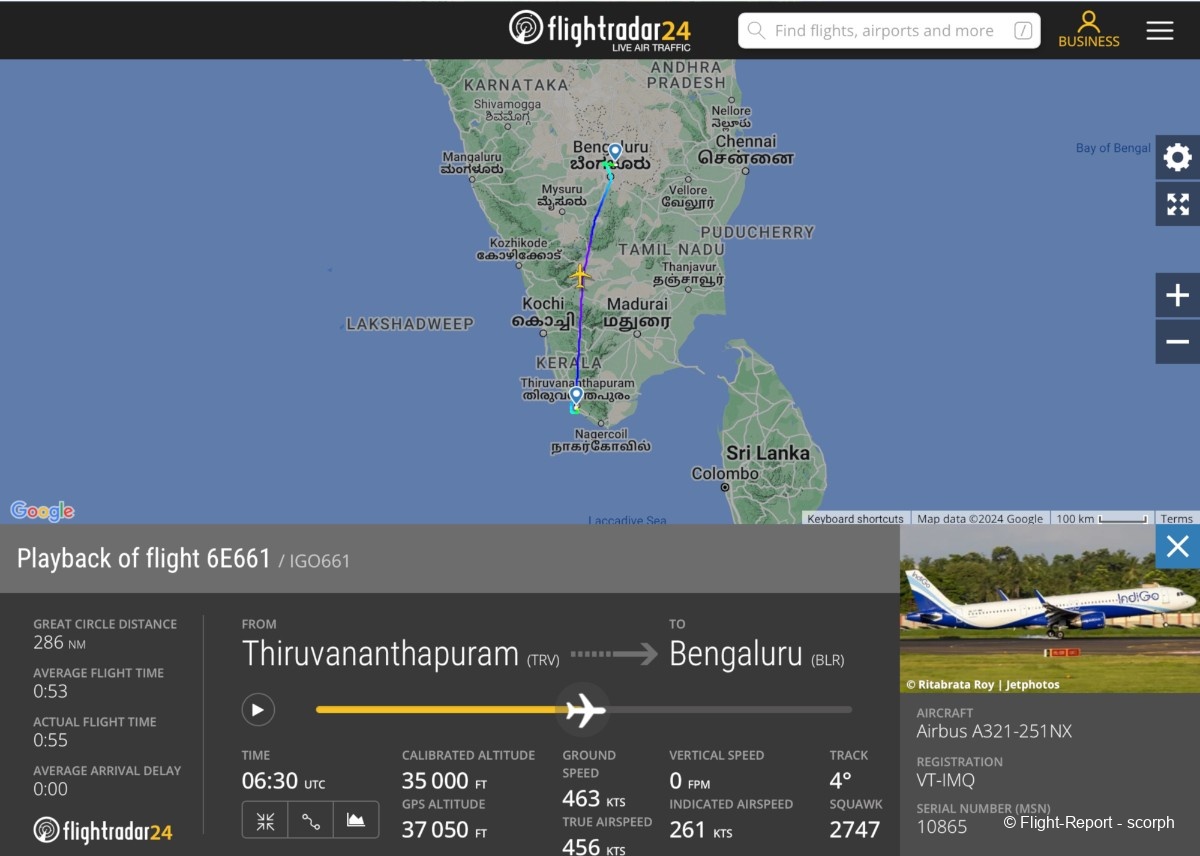
Flight is short and quickly the crew announces the start of the descent. Once again, the announcements are made in English, Hindi, and Kannada (the language of Karnataka). We gradually get closer to the ground, with a beautiful view of Bangalore as our approach takes us directly over the city.
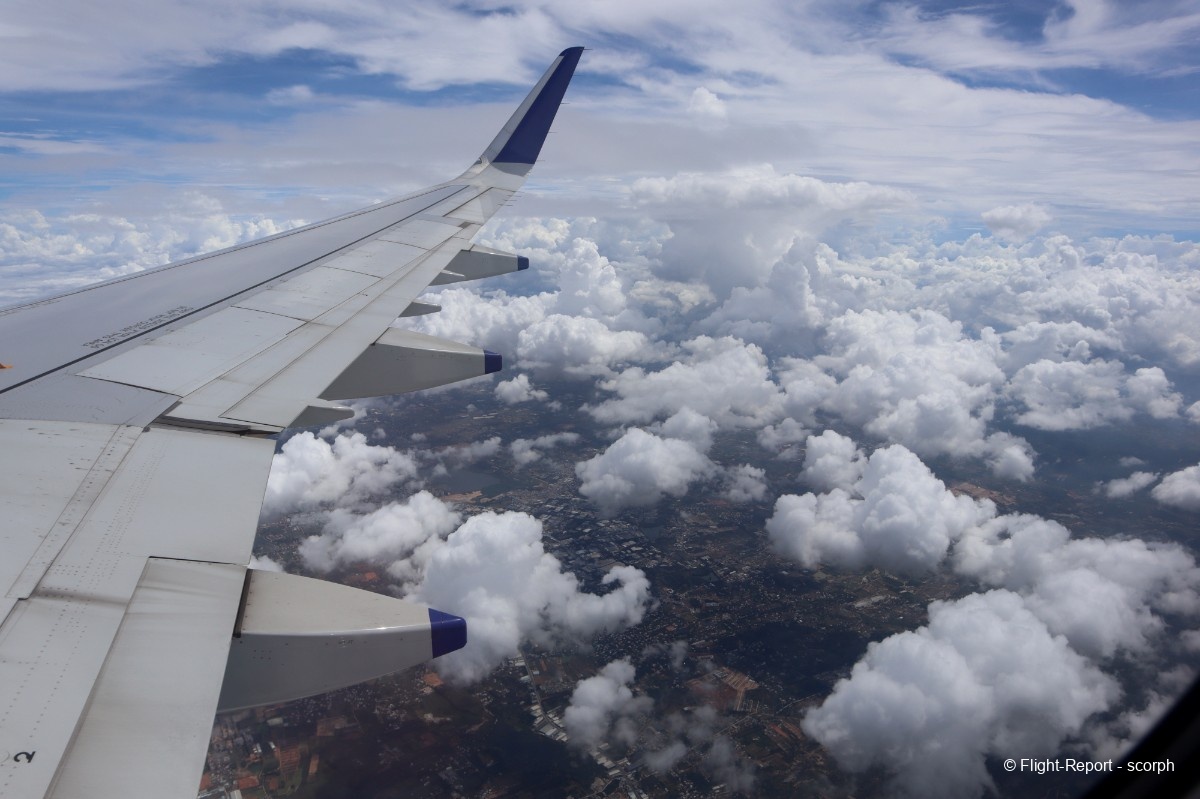
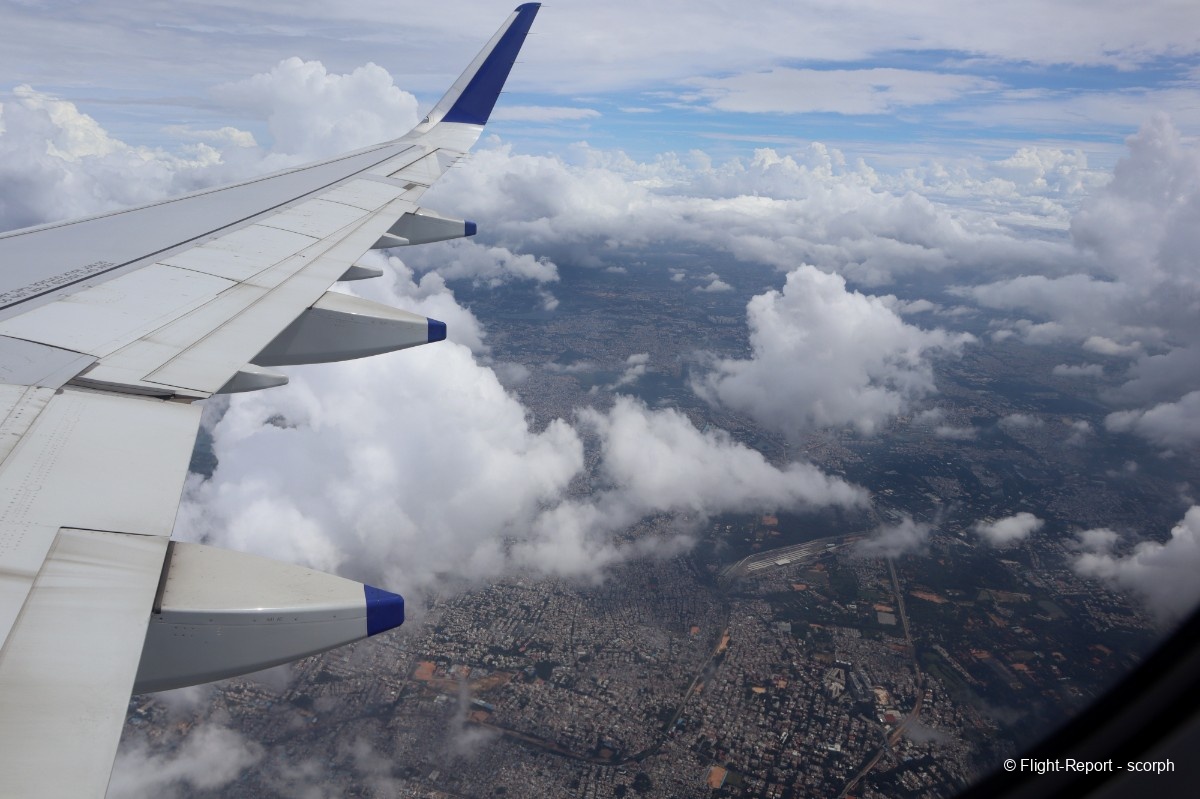
Sometimes, we have to weave a bit between a few larger cumulus clouds to avoid being shaken too much.
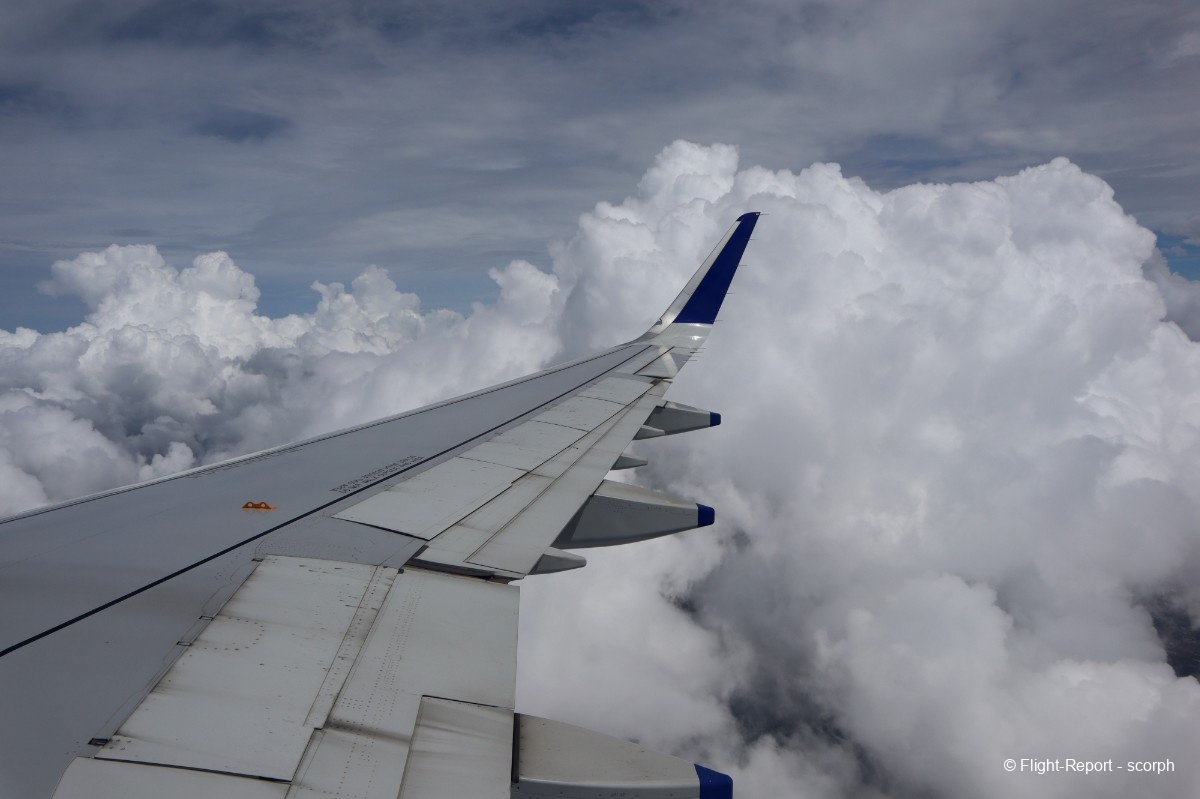
Usual approach from the east of the airfield, which still flies over very sparsely urbanized areas.
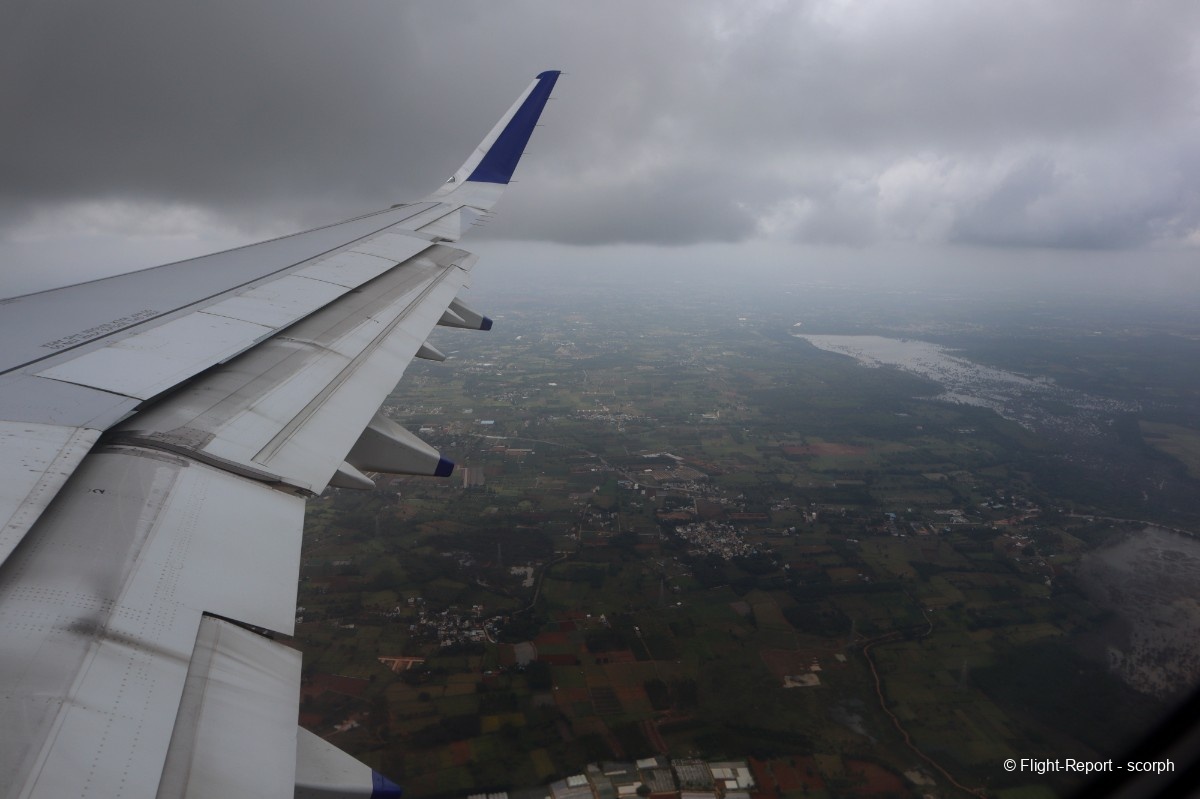
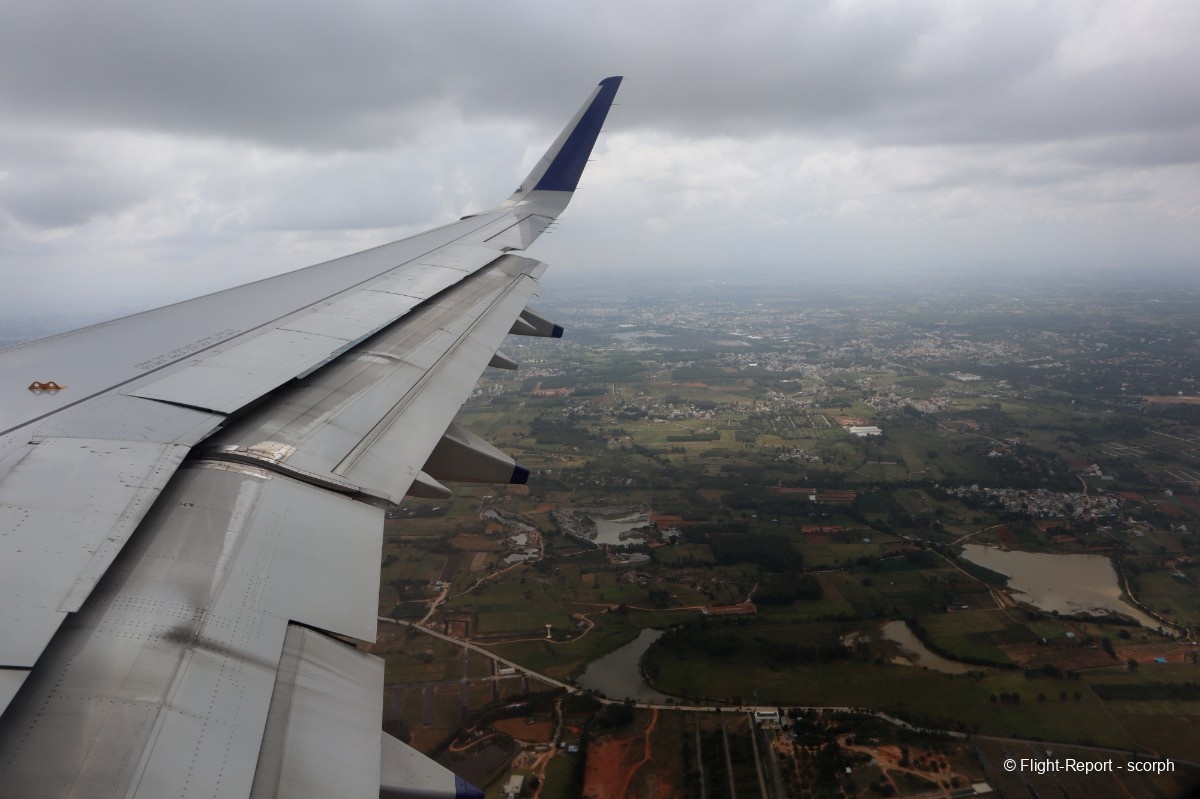
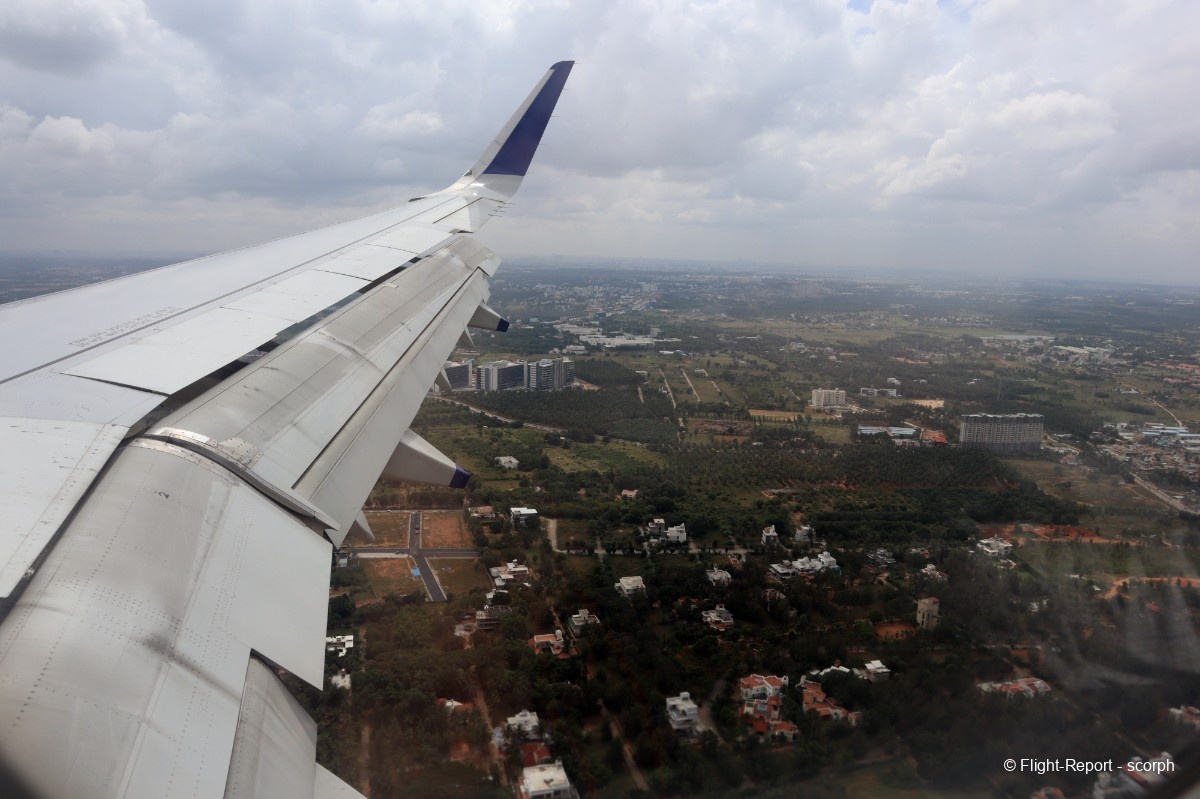
Arrival Mid-day at Bangaluru
We're just seconds away from touchdown, and we can already see the airport area, including a maintenance hangar belonging to Indigo.
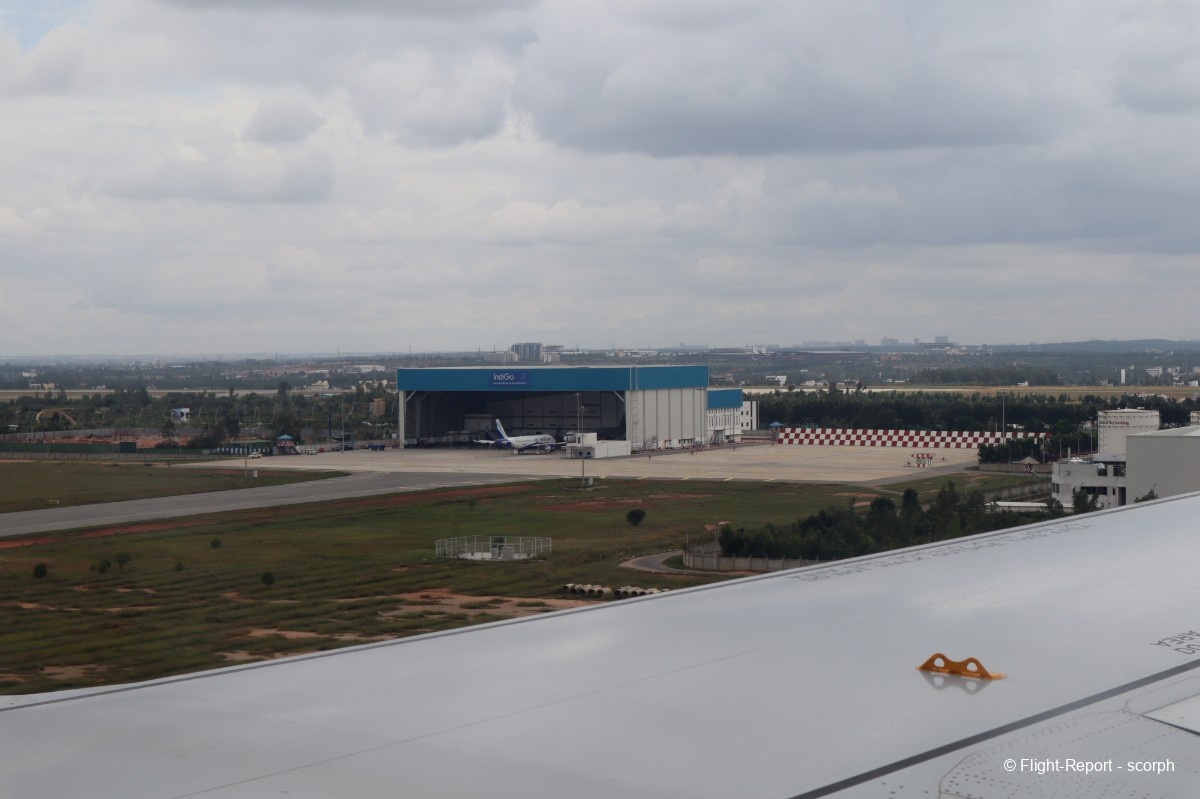
We fly over the runway threeshold, passing next to this Airbus A350-900 from Singapore Airlines, which is waiting for our landing before lining up.
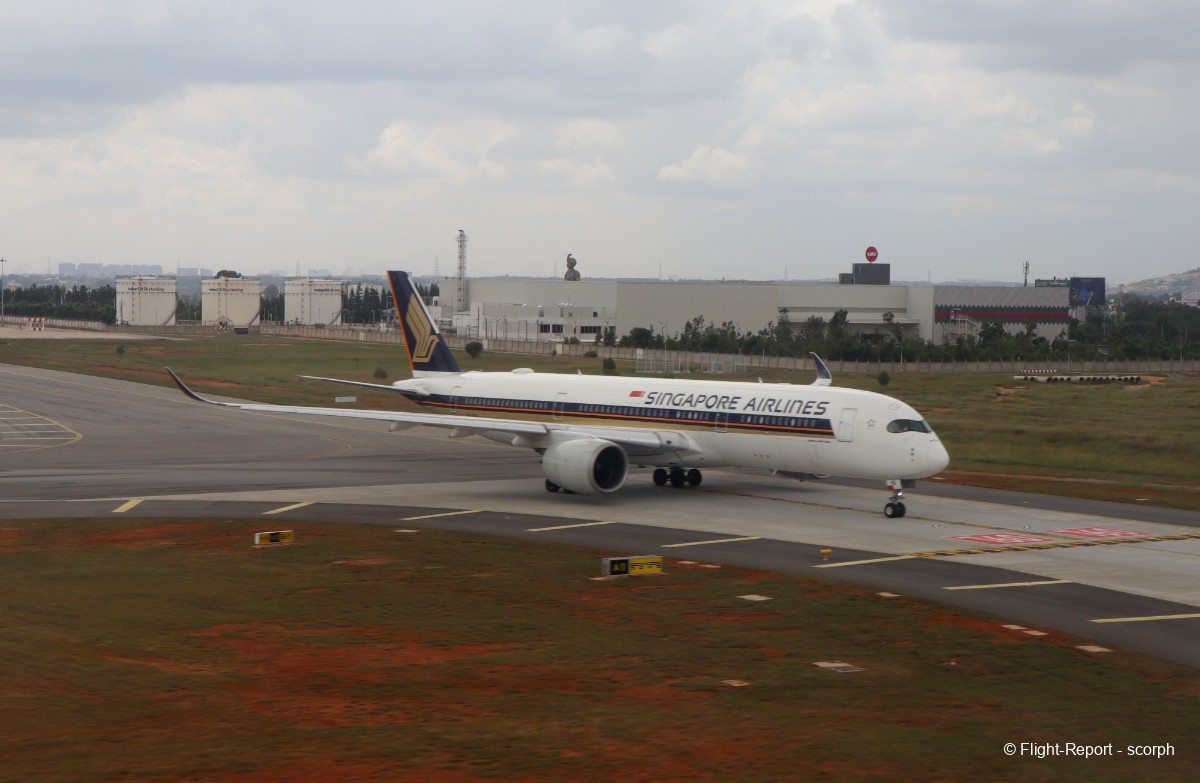
Smooth touchdown as we pass by on the parallel taxiway, next to the impressive Qatar Airways Boeing 777F.
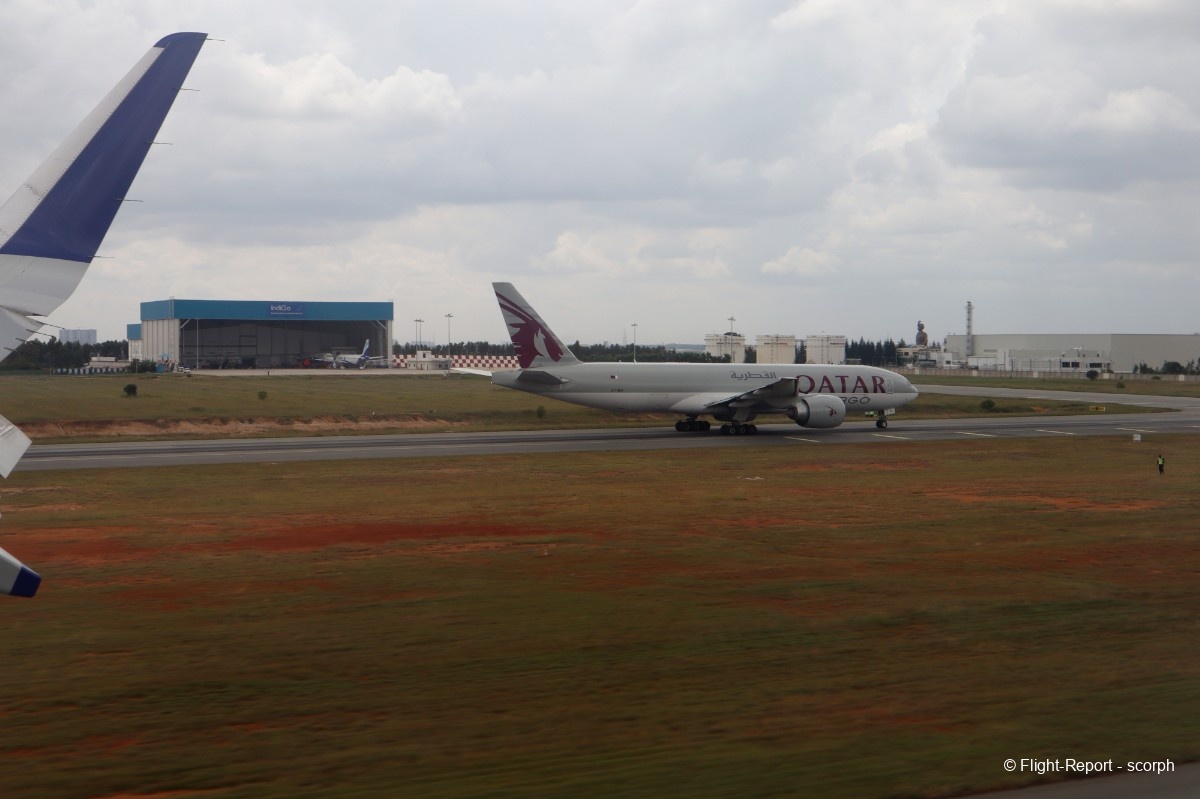
The braking isn't too harsh, the runway is dry, and we need to head toward T1, which is located almost at the end of the runway. The runways are a respectable 4,000 meters long, enough to allow even the heaviest aircraft to take off during the hottest hours. In fact, the airport can be considered 'hot & high,' with an elevation of 910 meters ASML (300 meters higher than Madrid (MAD) for comparison).
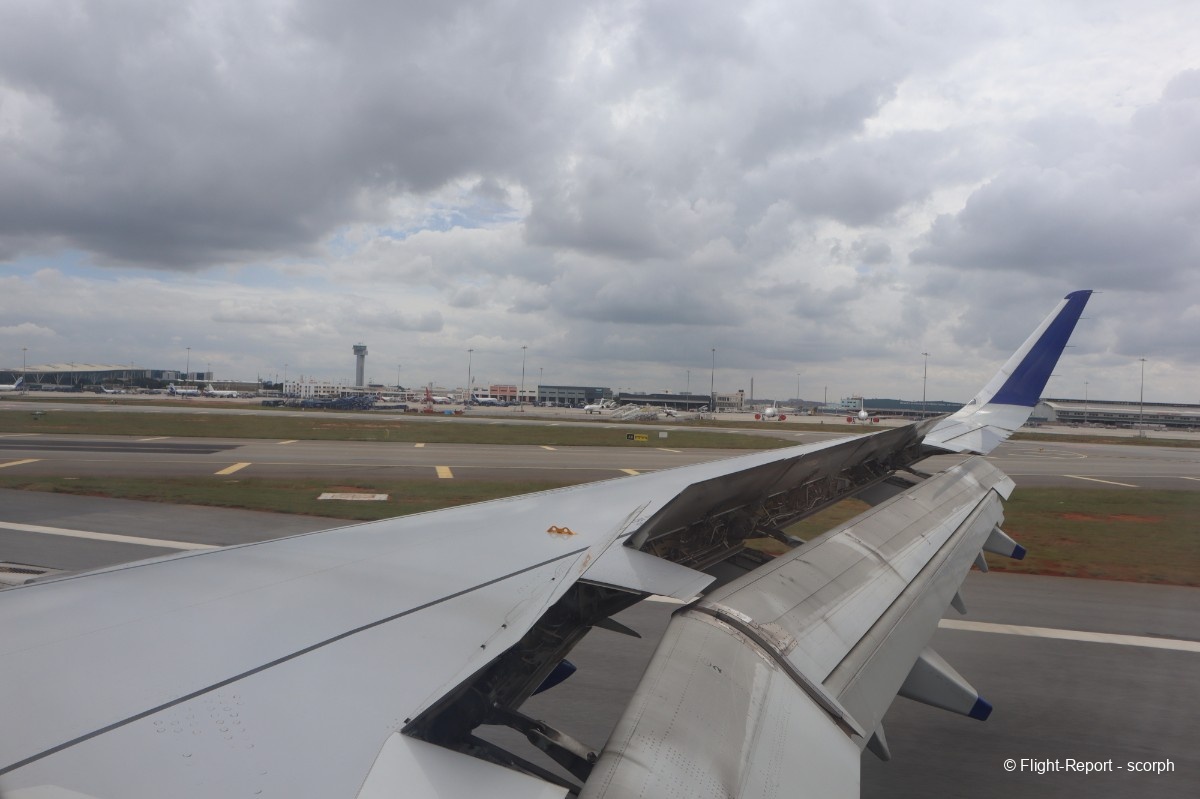
T1 is in sight, and we're clearing the runway via the taxiway.
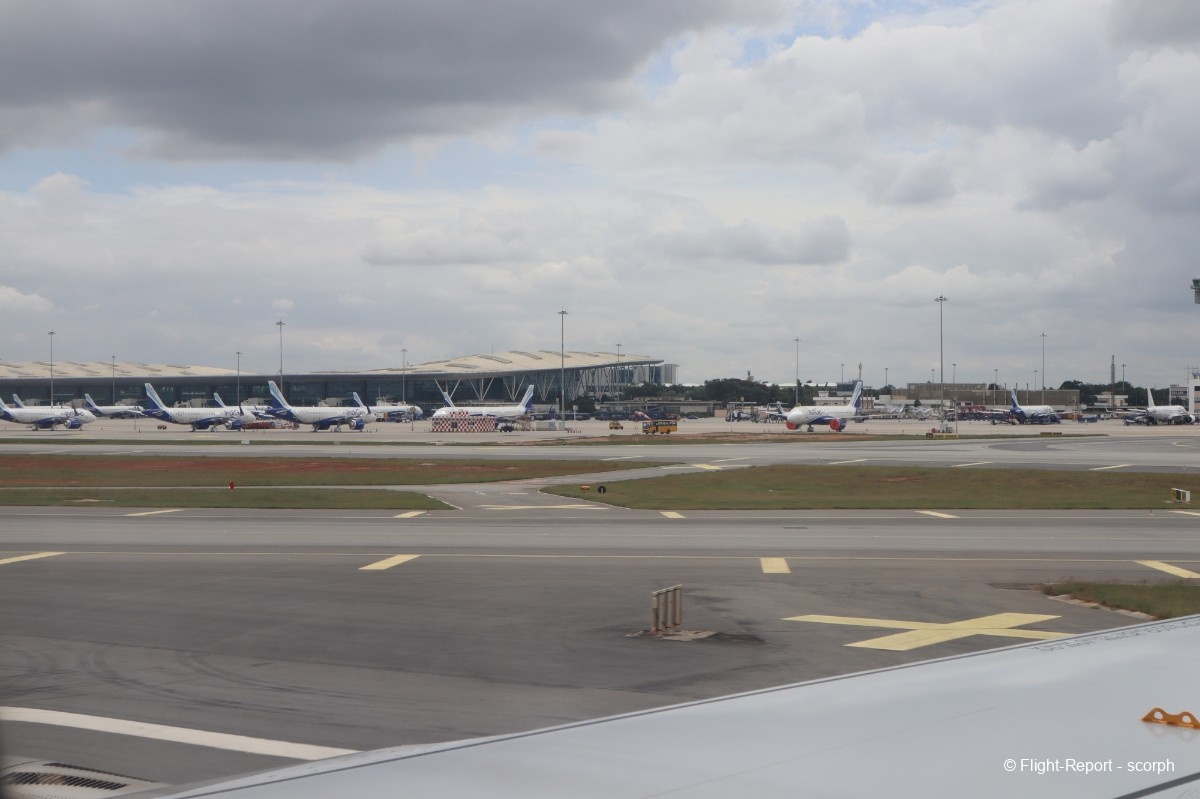
We pass by the aircraft stored off to the side, including two Indigo Airbus A320neos, followed by two A320neos from the now-defunct GoAir
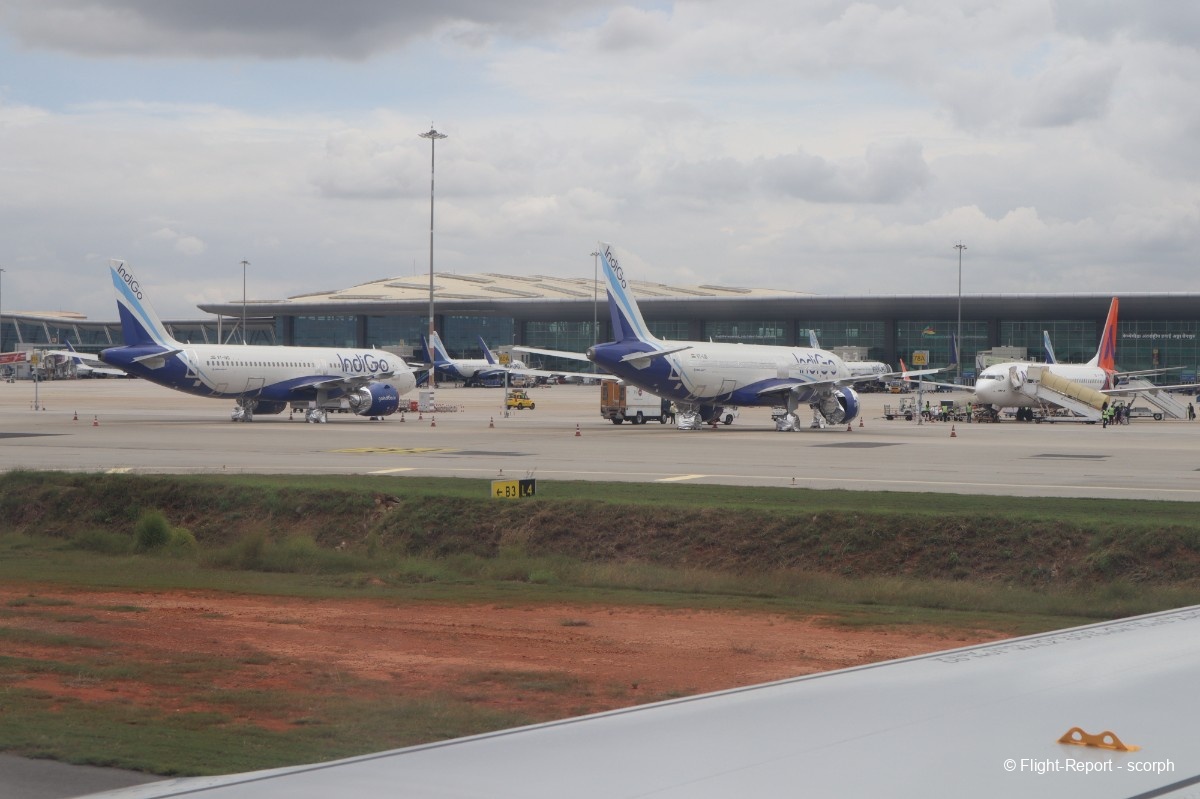
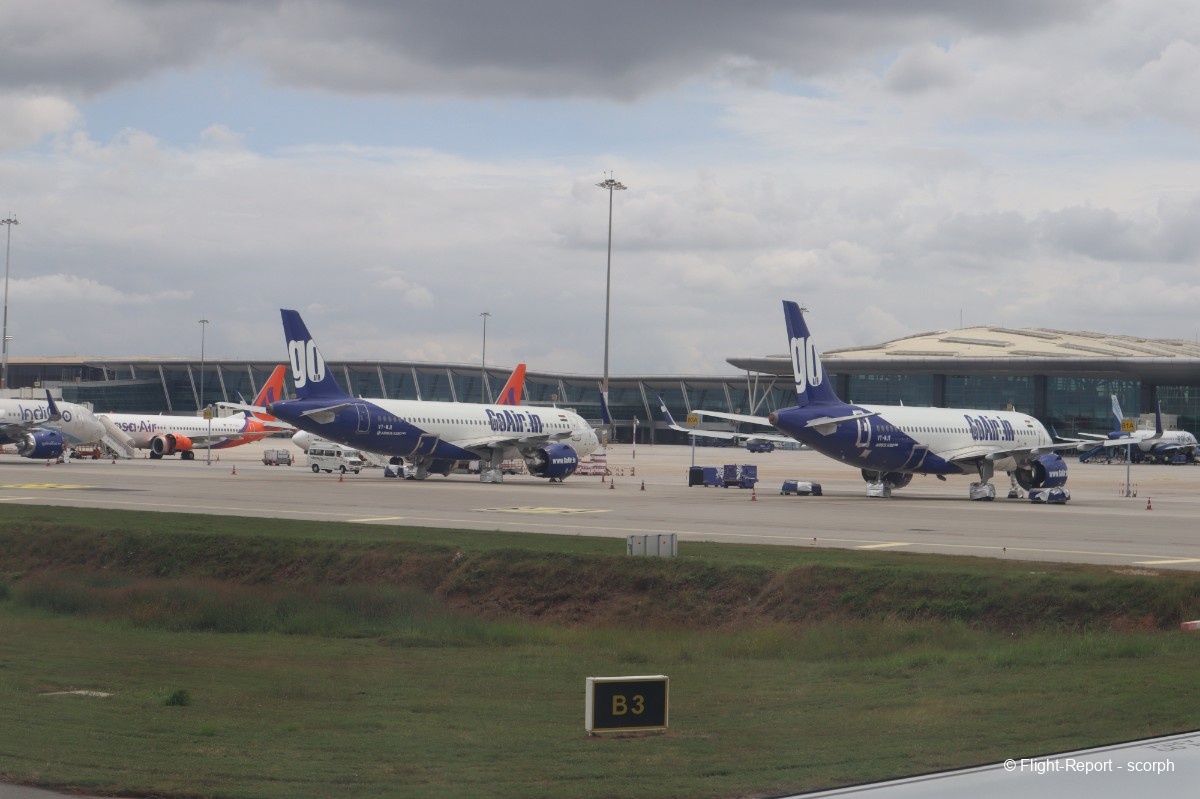
Terminal 2 is visible in the distance, and we can spot an Indigo Airbus operating an international flight.
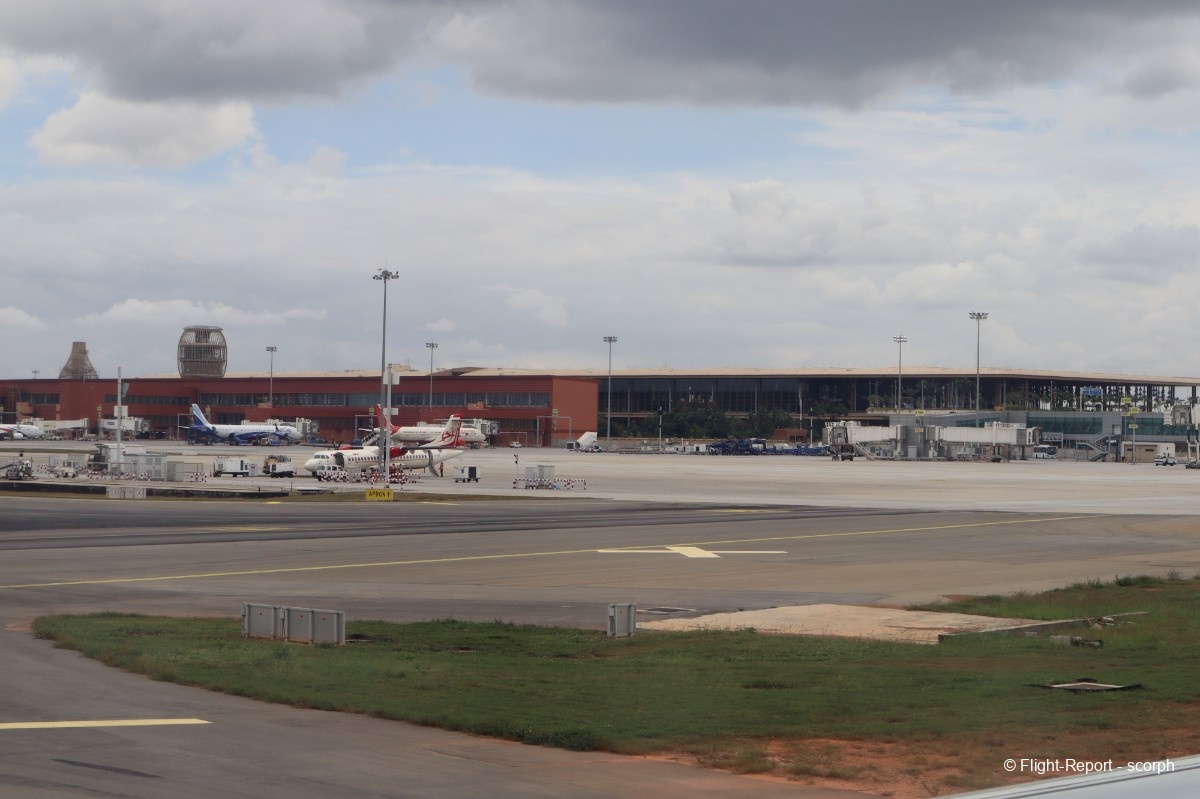
GoAir is gone, and Akasa, the new Indian low-cost carrier, has come to replace it. Founded after the COVID pandemic, it capitalized on the struggles of SpiceJet and GoAir to carve out a small market share in Indian skies.
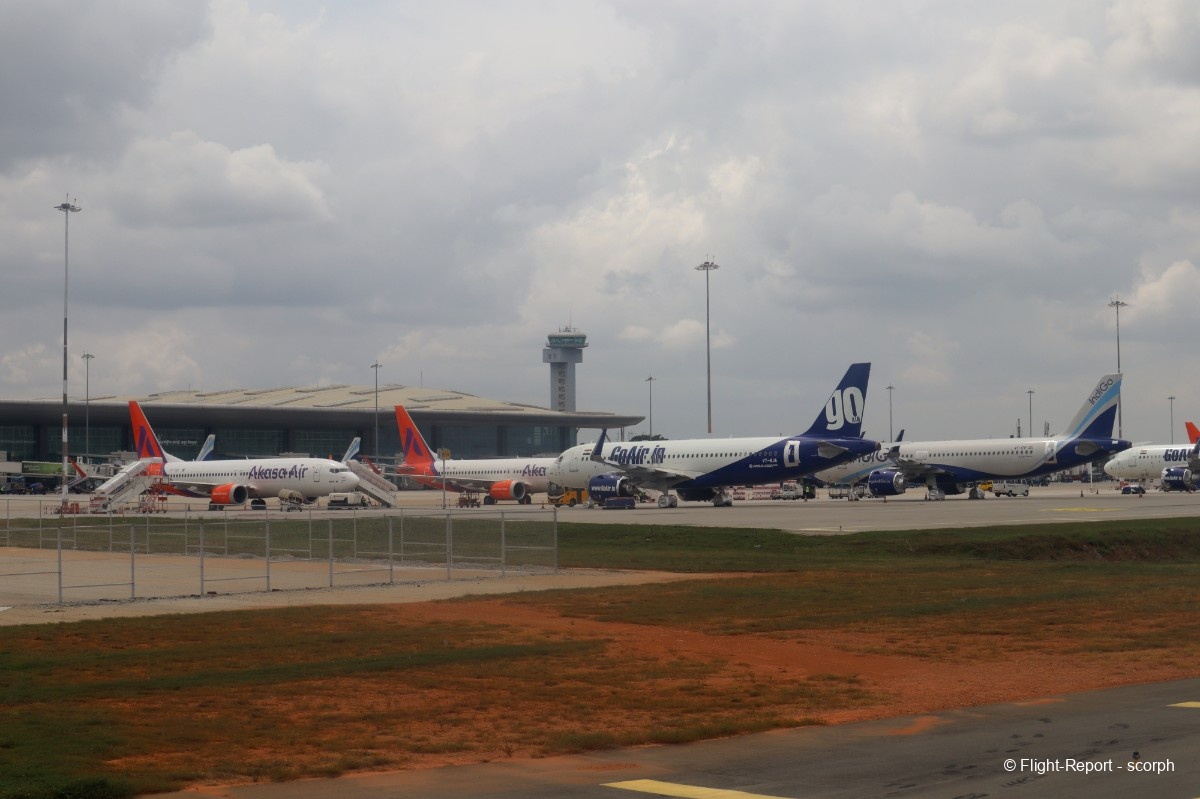
There are still stored GoAir Airbus A320neos on the remote parking stands.
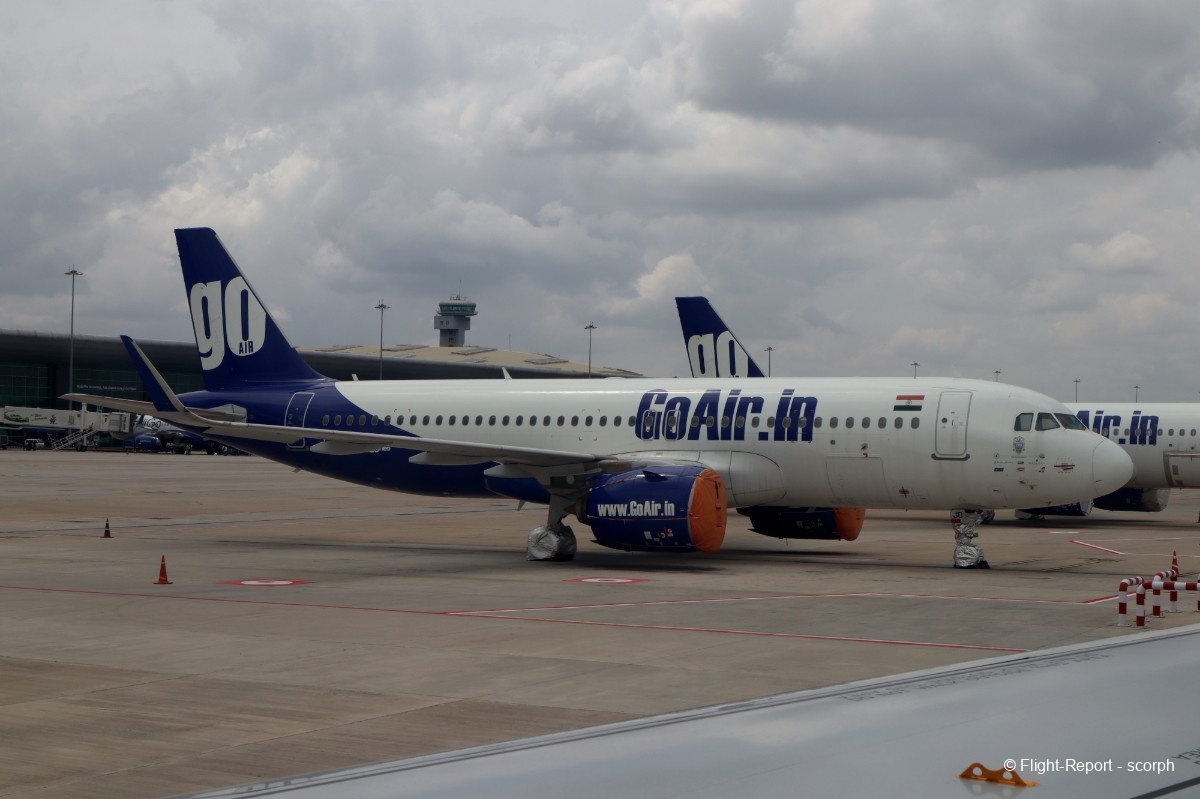
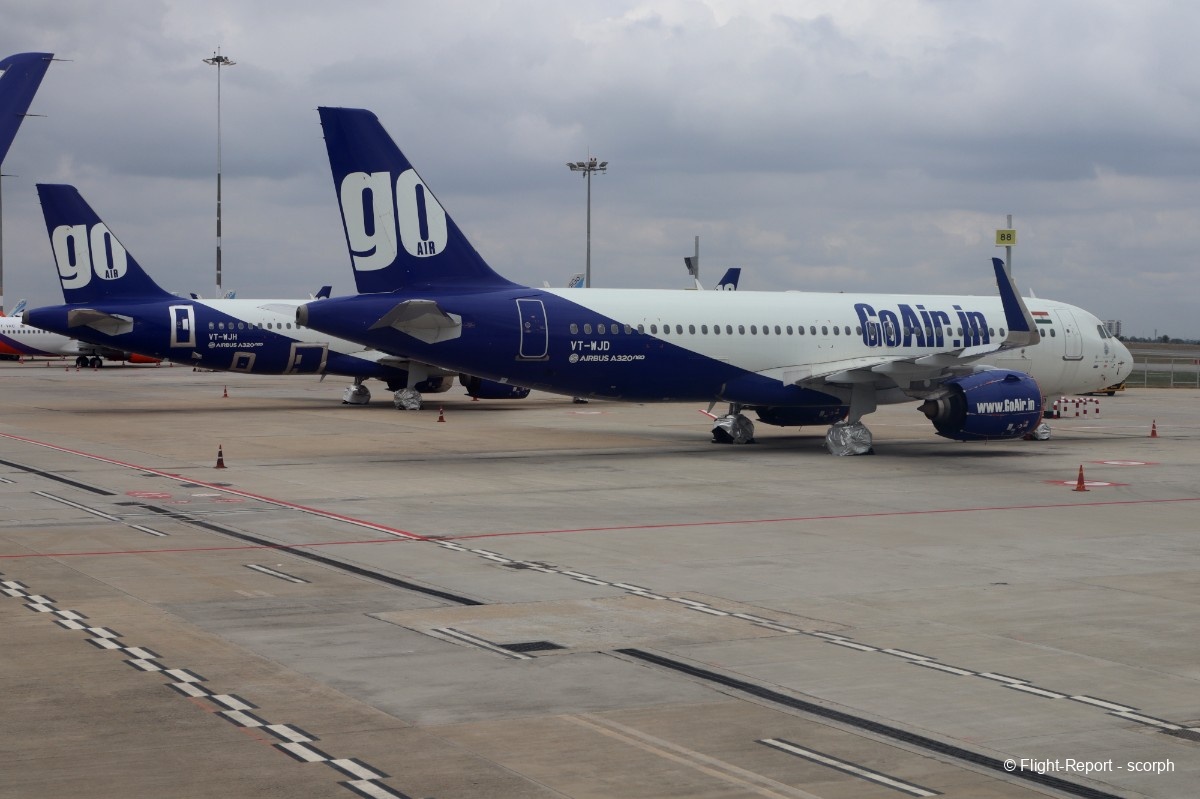
Meanwhile, on the runway, the Boeing 777F we saw earlier takes off toward Doha.
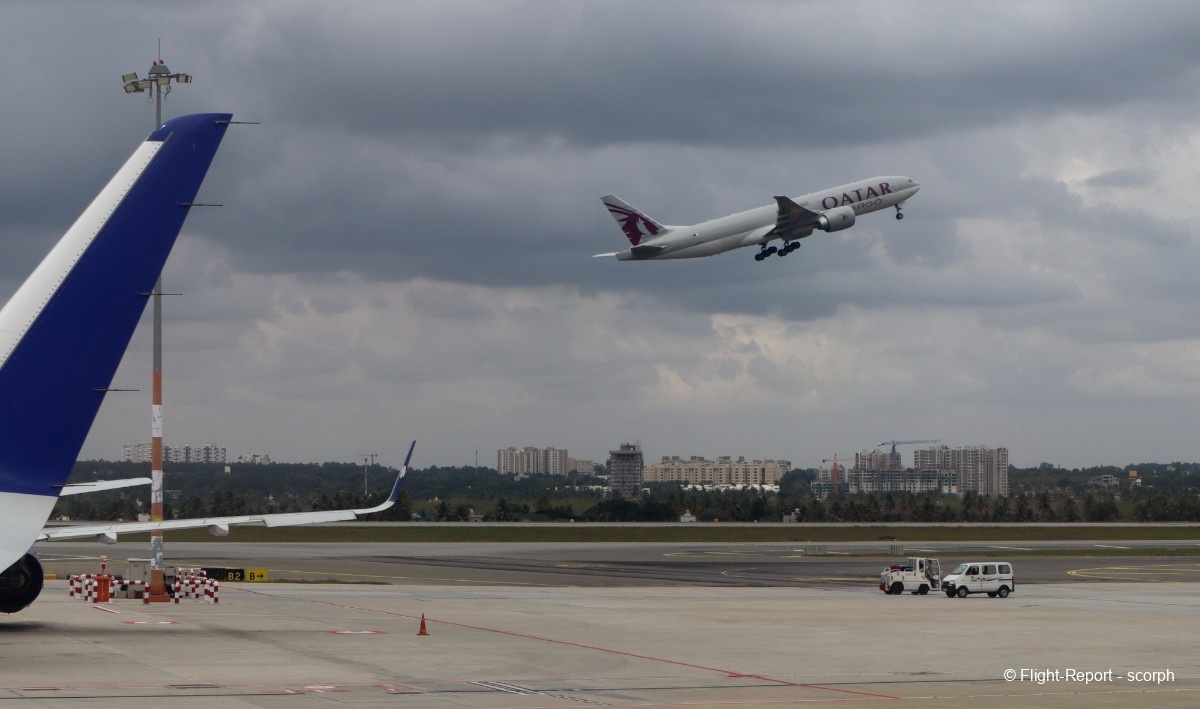
Several Akasa Air Boeing 737 MAX-8s are parked off to the side, likely to save on parking costs. I read in the Indian aviation press that there was at this time a hiring war in India for qualified 737max pilots. Many of them left SpiceJet to join Akasa Air, but now three Indian airlines are actively seeking pilots to fly the Boeing 737max: SpiceJet, which is trying to relaunch operations, Air India Express, which has inducted no less than 15 Boeing 737 MAX aircraft in just a few months, and Akasa, which is also receiving aircraft but seems to be struggling to attract pilots. This has resulted in a low daily utilization of their planes due to the lack of available pilots.
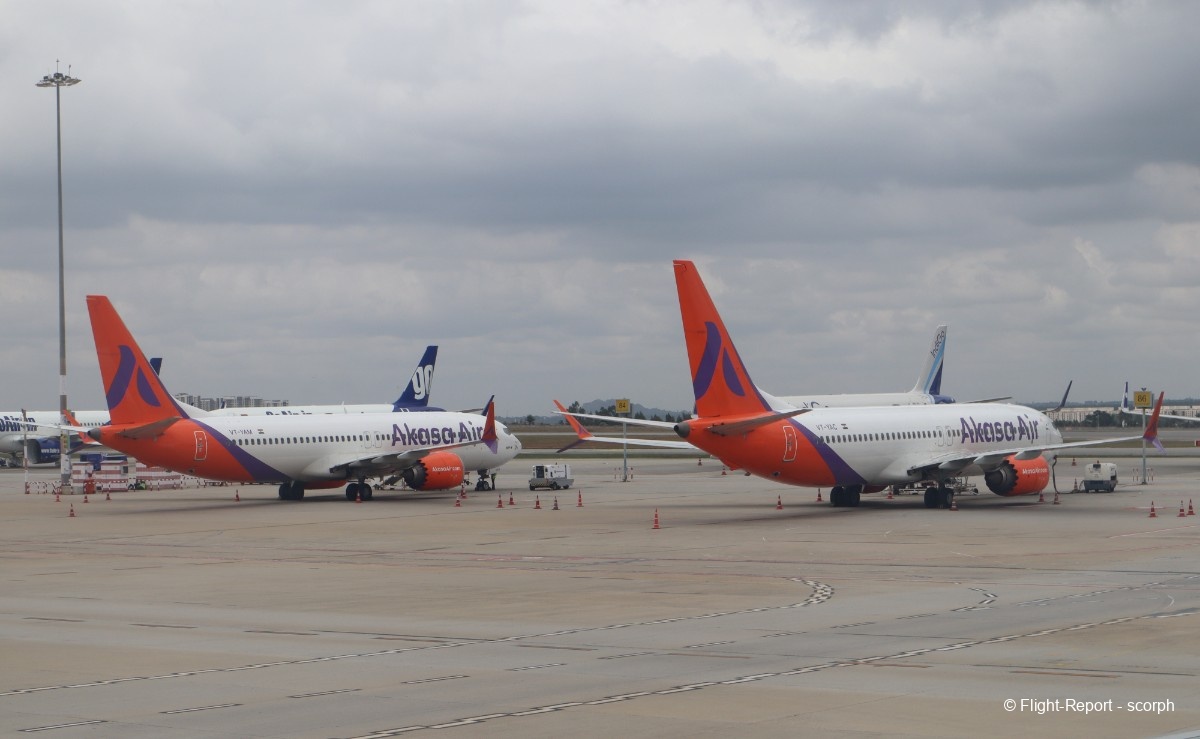
An Indigo A320neo has just pushed back, and we are now taking its place at the gate.
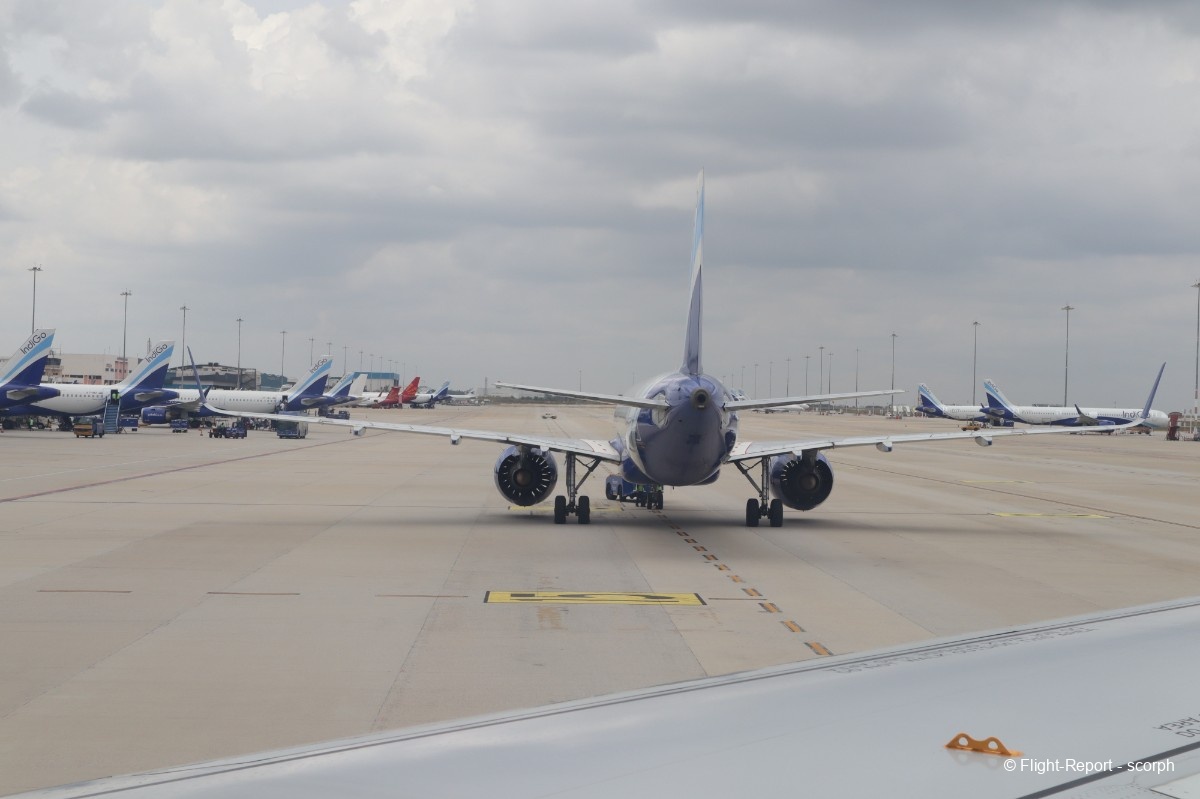
On the terminal 1 side, it's Indigo that dominates with its Airbus fleet. We will be parked next to an 'older' A320ceo, one of the remaining examples in the Indian low-cost carrier's fleet, this one heading to Lucknow. Due to issues with the P&W neo engines, Indigo has been slower than expected in retiring its A320s with older engines and even leased no fewer than six aircraft from Smartlynx Estonia.
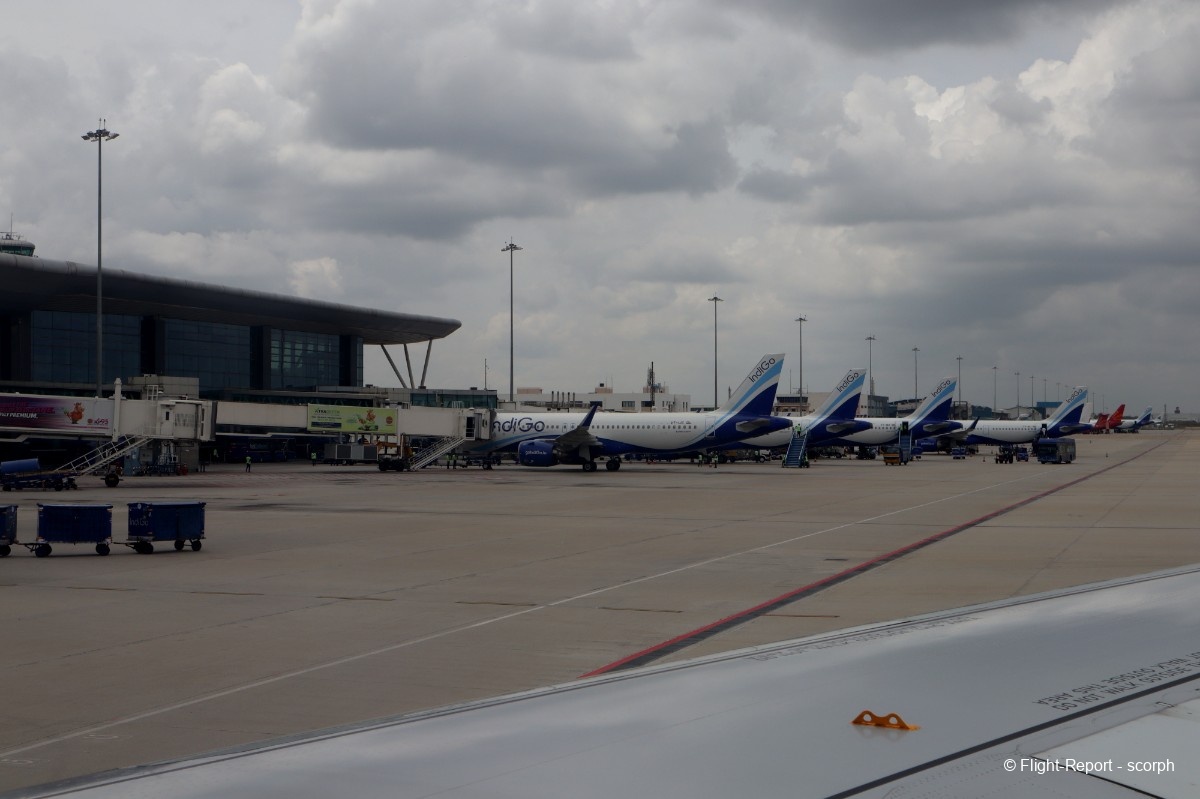
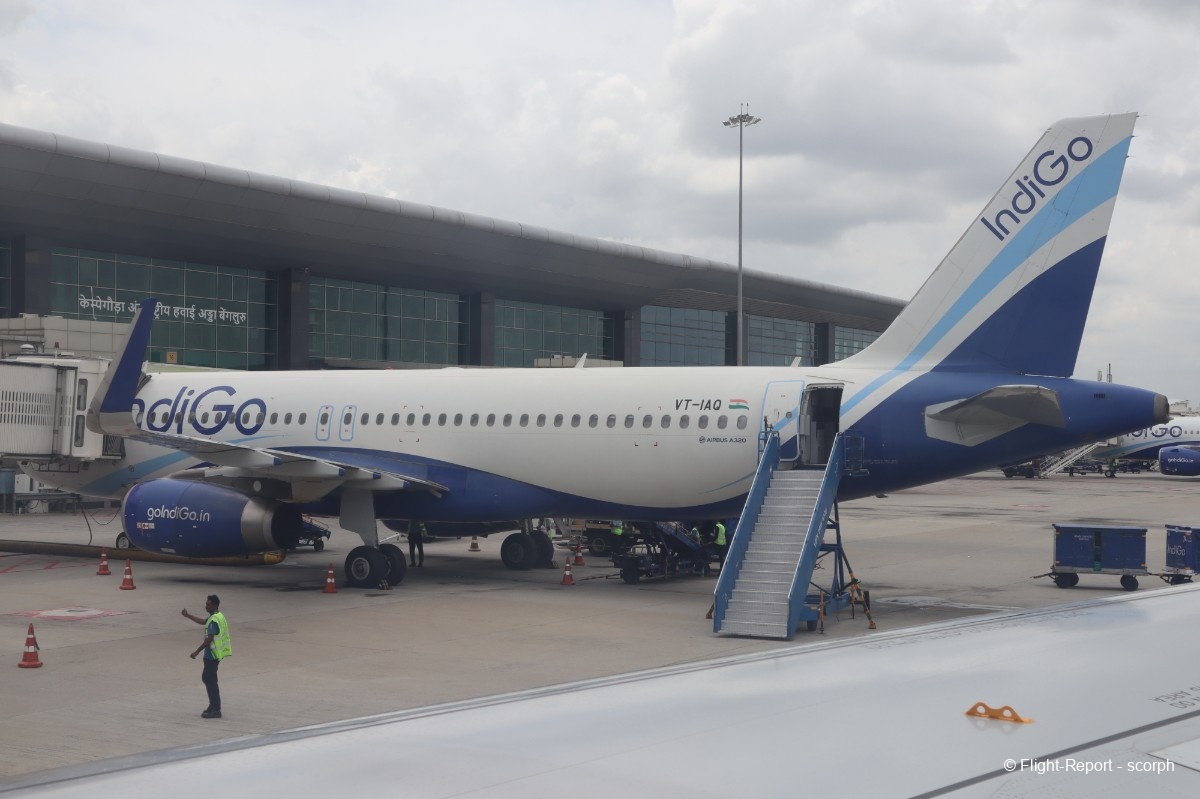
Quickly, the jet bridge is connected to our front left door, and the disembarkation process begins. It’s pretty quick with the crew bidding farewell next to the door. While the cabin isn’t unpleasant for a short one-hour flight, I wouldn’t be as happy to have it for a 6-hour flight, like between Mumbai and Jakarta, for example…
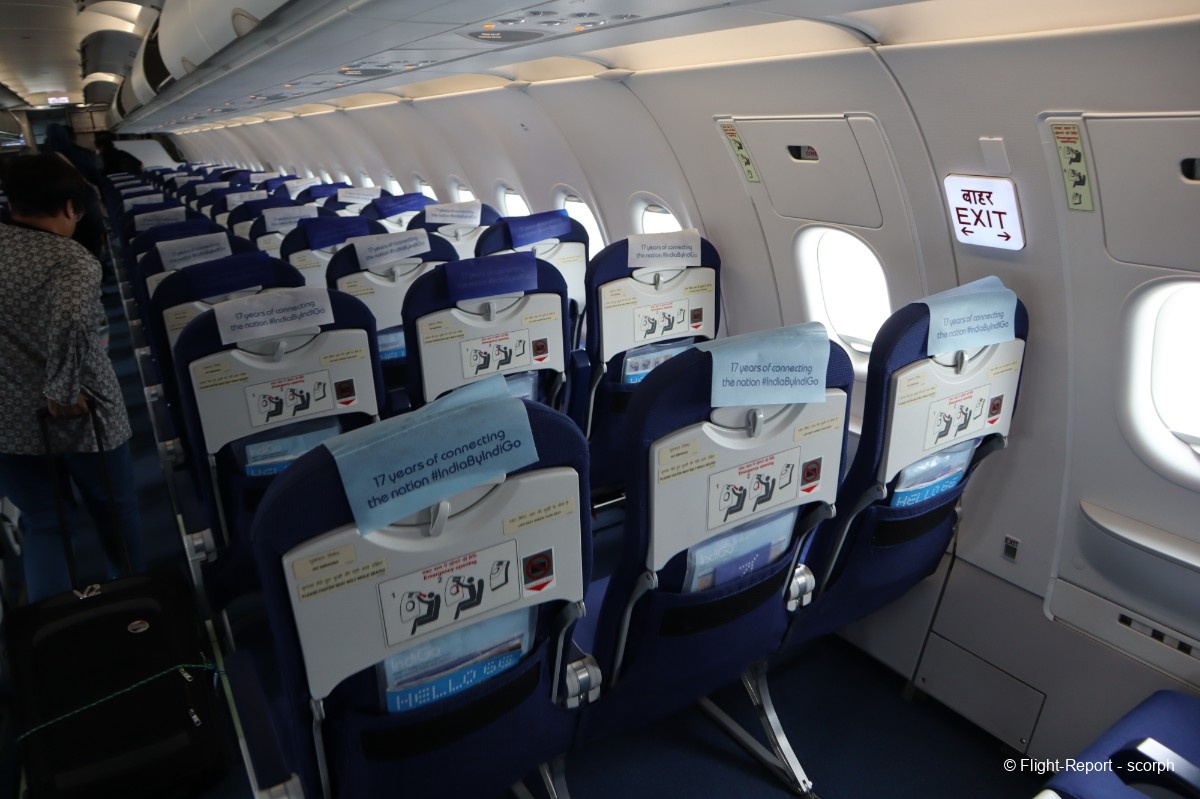
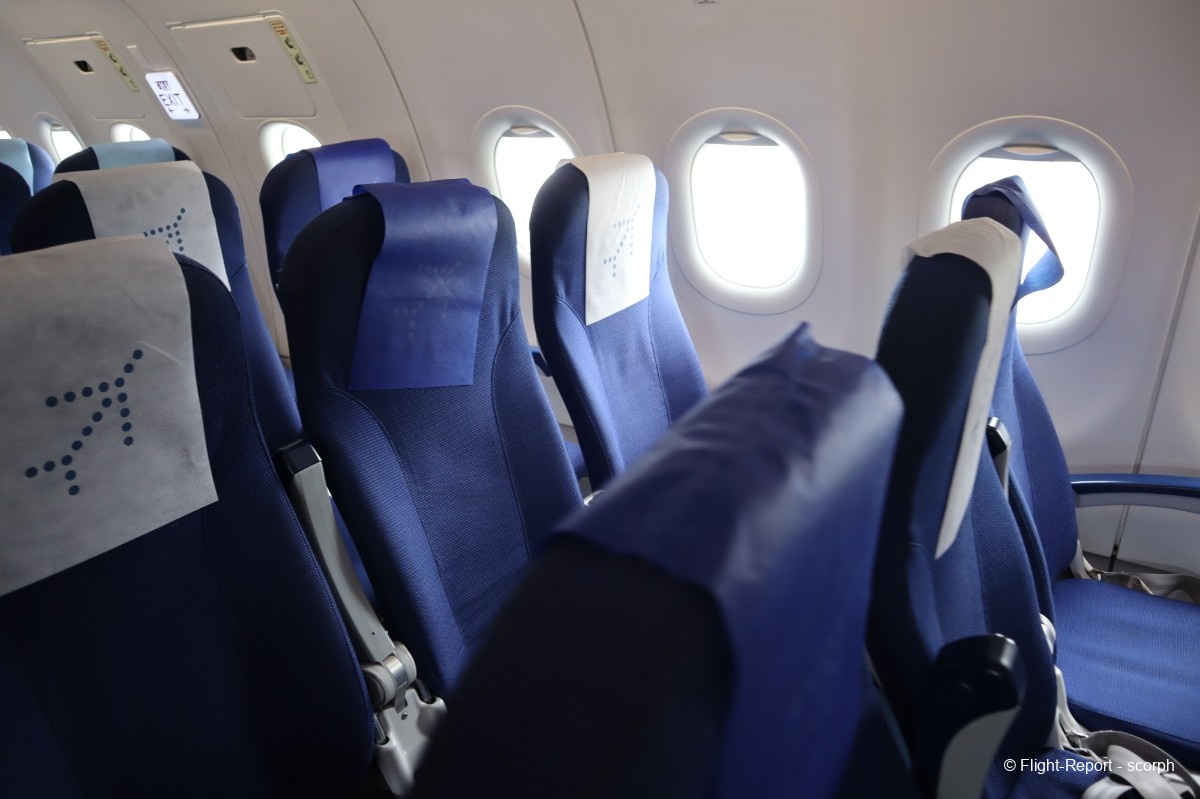
Similar to what is done in Europe, it's the local fuel provider, Indian Oil, advertising its motor oils.
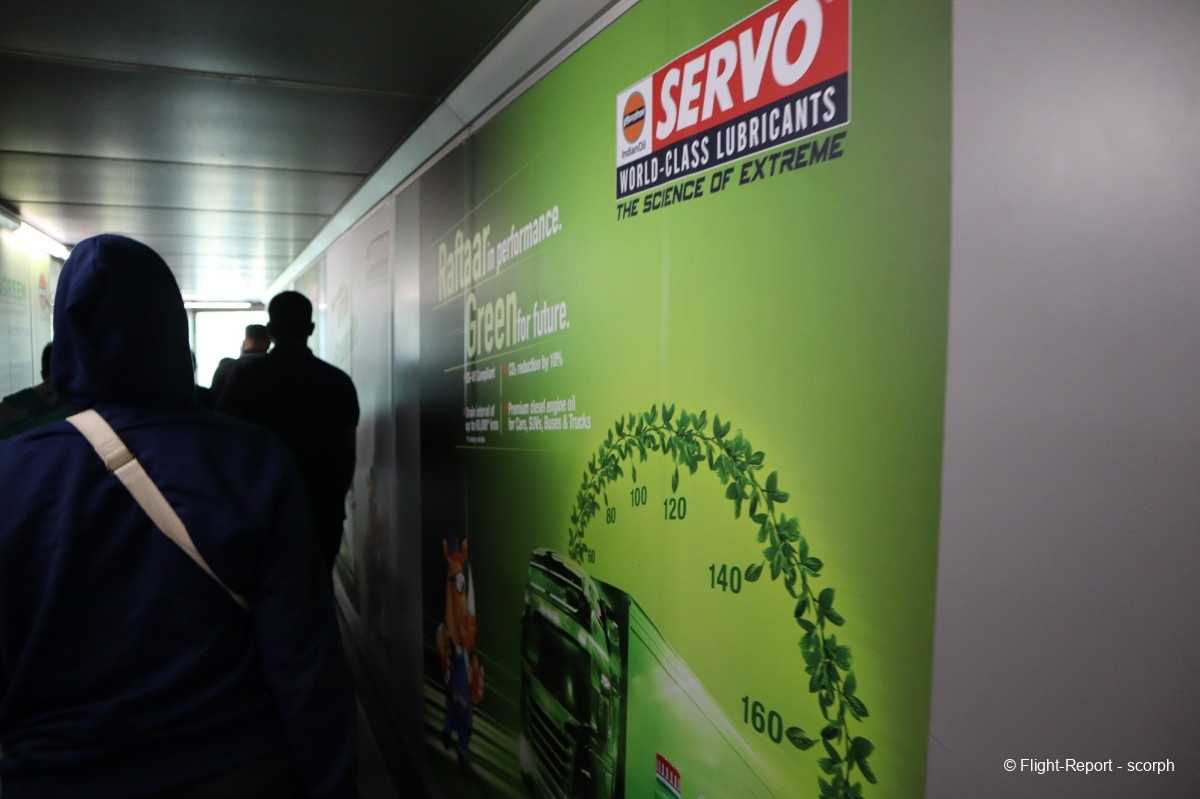
On the way, I spot another Airbus A320ceo, which will take off toward Shirdi, a small town in the central-western part of India, in the state of Maharashtra.
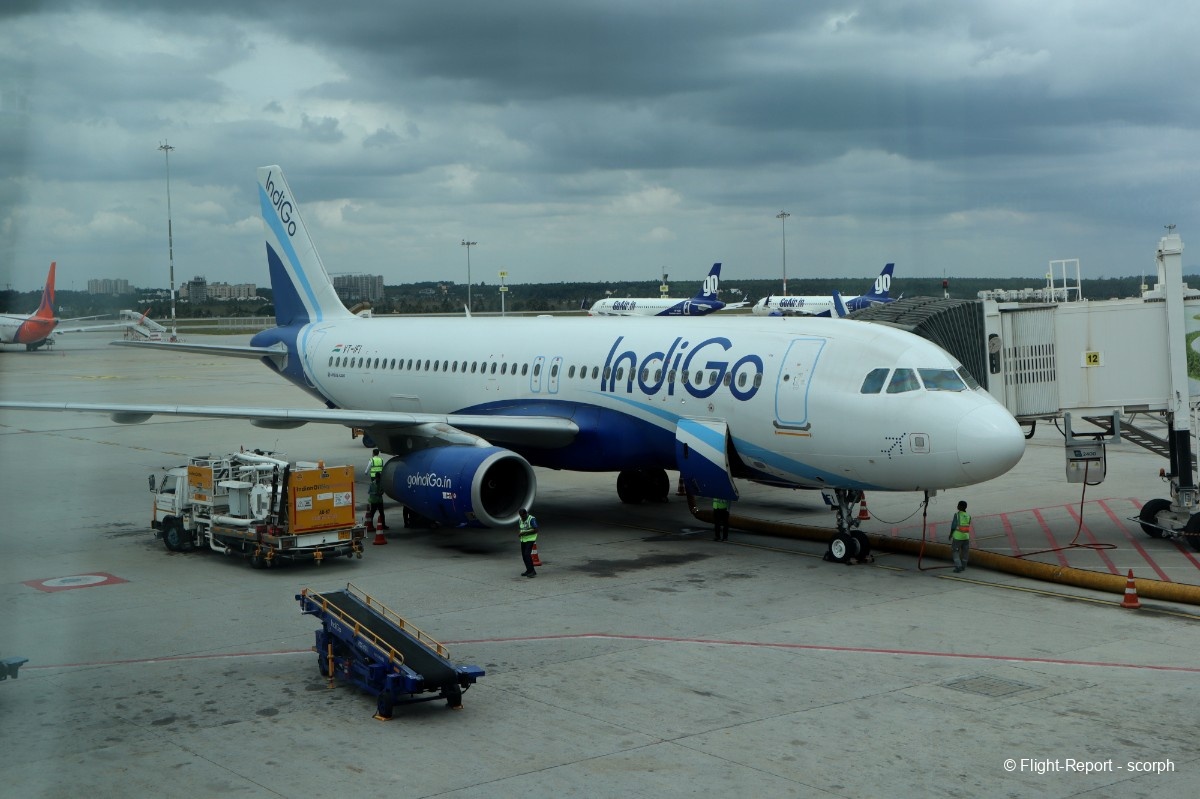
We can easily compare the size of the engines with this Indigo Airbus A320neo.
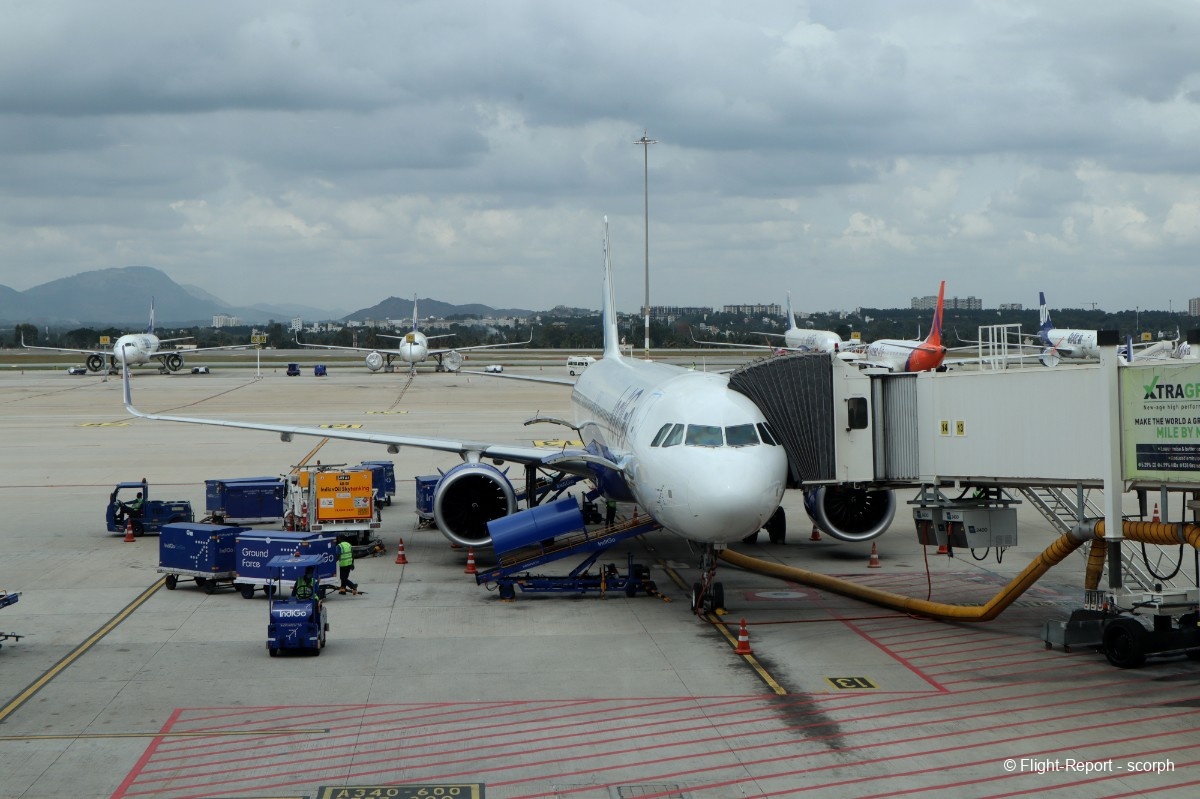
Airside, there is indeed a well-designed pathway for flight connections. It is quite common to see connecting flights sold by Indigo (which is also not very common for a low-cost airline in Europe).
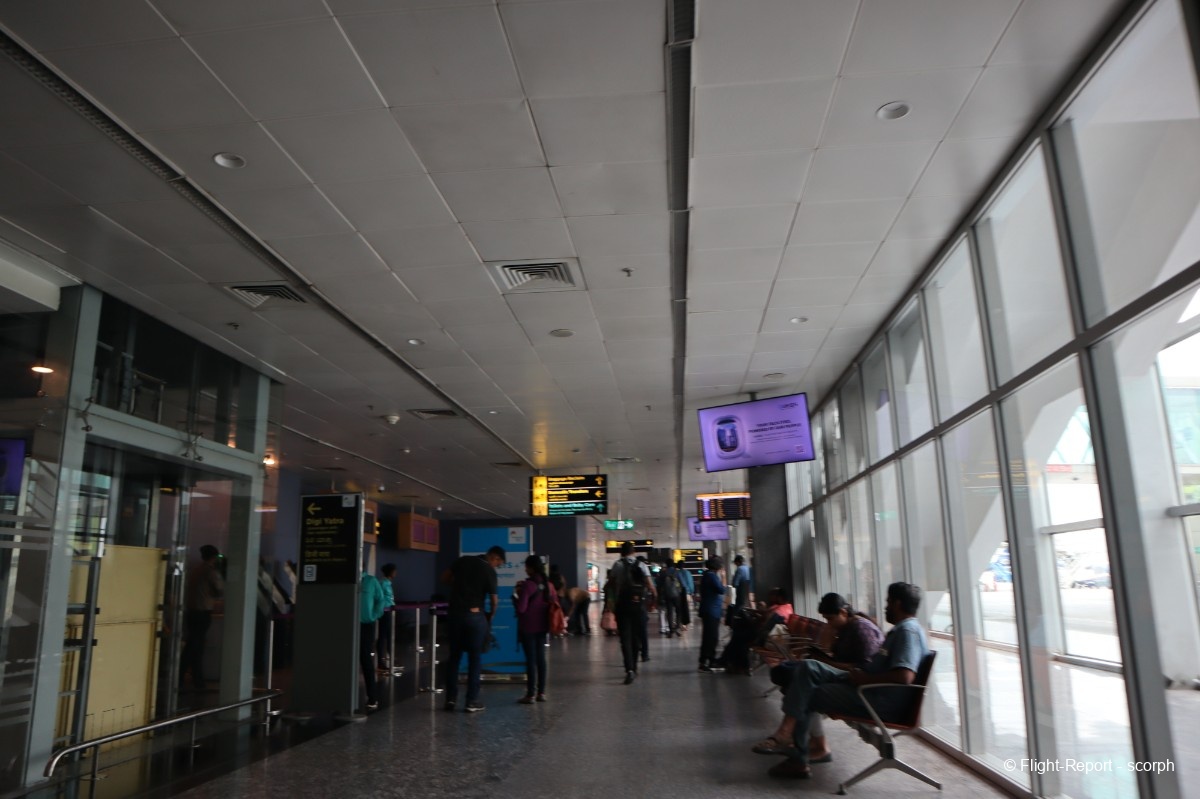
But for us, it will be heading to the baggage claim area and then back to Bangalore. The arrival section of Terminal 1 is less spectacular than that of T2, but it remains very practical since the airport isn't that old.
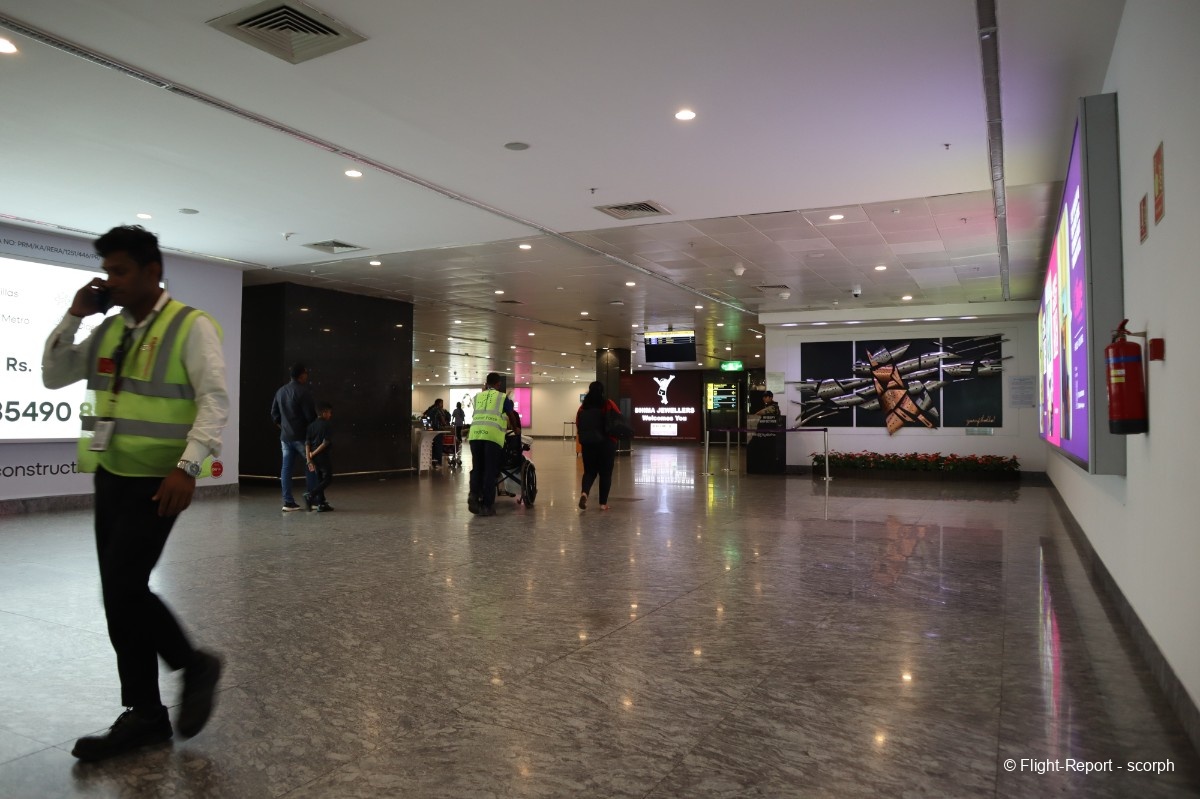
The arrivals during that time slot, for us, will be heading to conveyor belt 2.
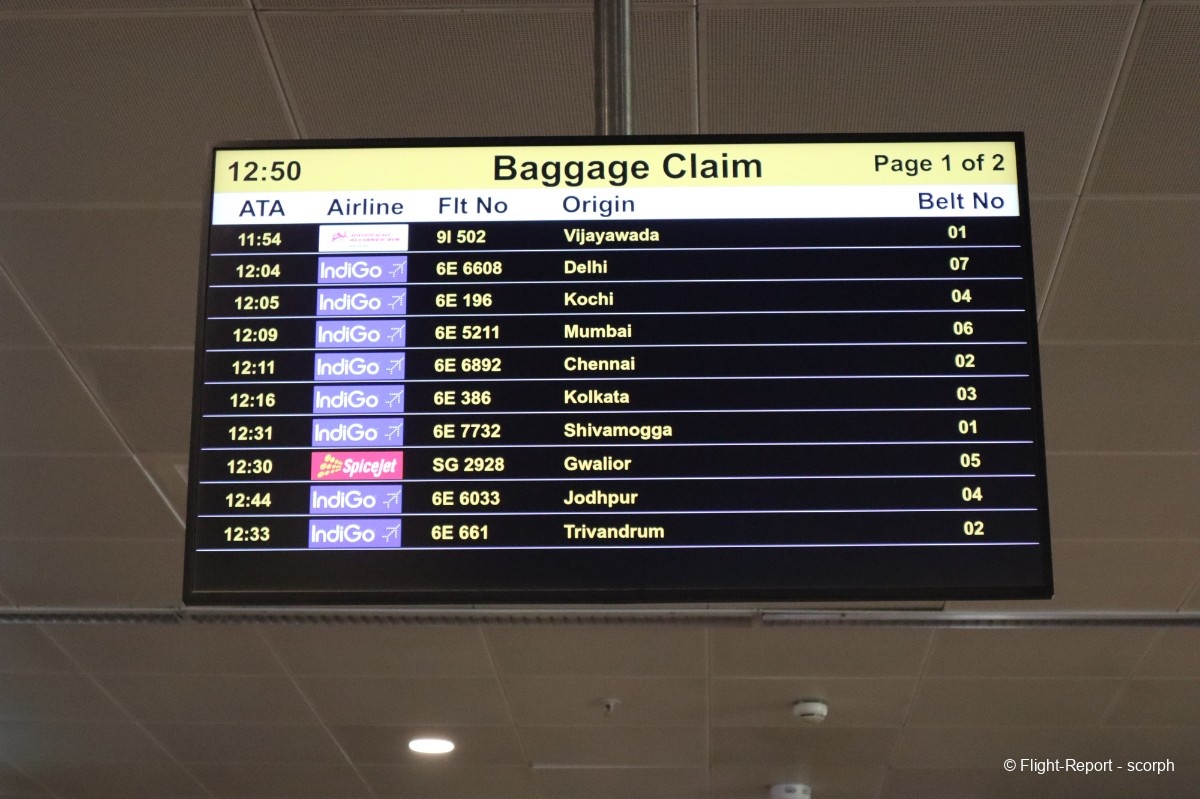
There are a lot of people in front of the belt, and we'll have to wait less than ten minutes before to see our bags appearing on the carousel. As is the case everywhere in the world, it seems passengers still haven’t figured out that crowding on the conveyor belt doesn’t make the bags arrive any faster! ^^
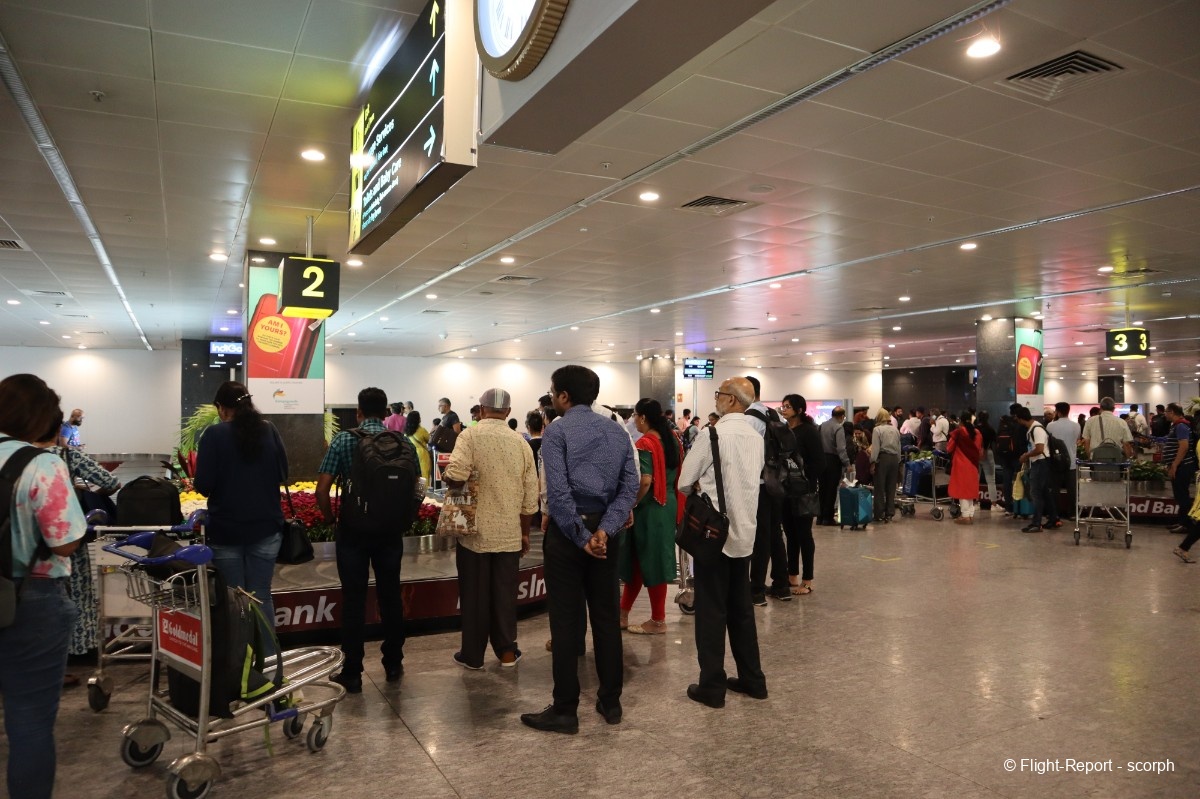
After walking a few meters, we reach ground-side. There are quite a few sales counters for ground transportation or other airlines. There’s also a Relay store on the arrival side, which can be quite handy. This massive hall is actually shared with departures.
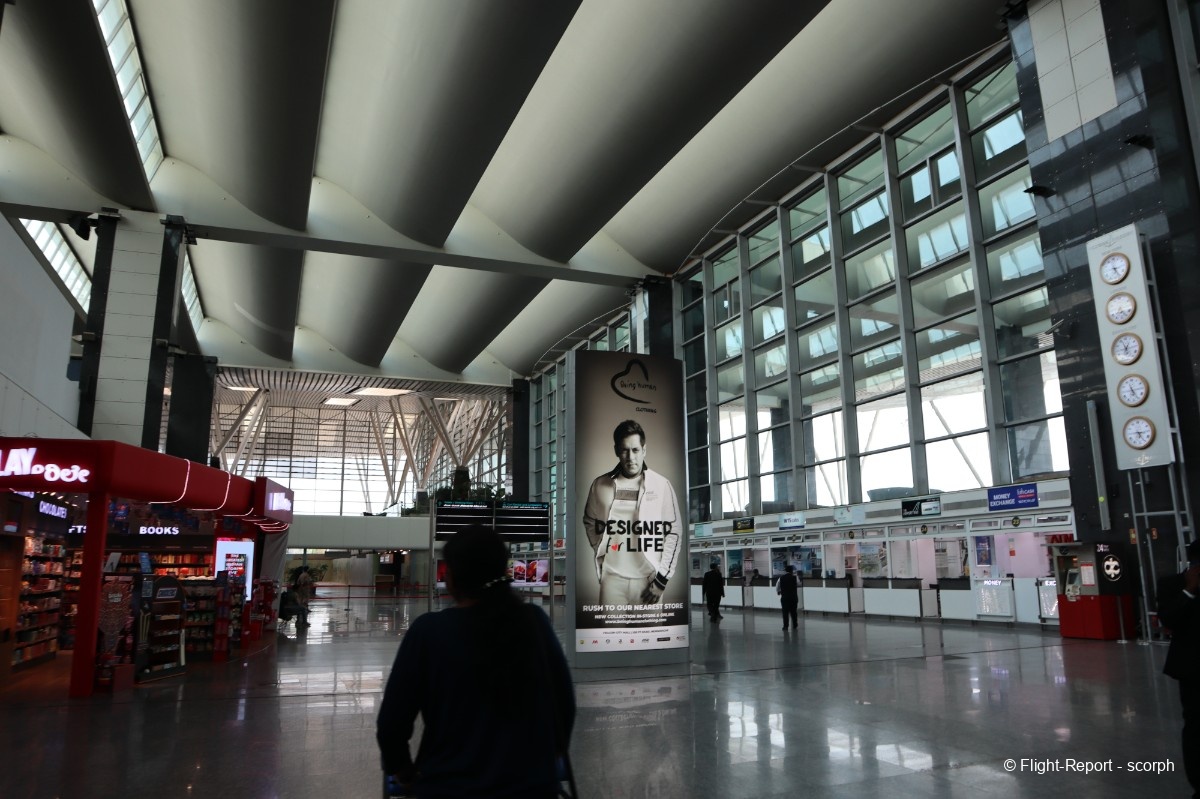
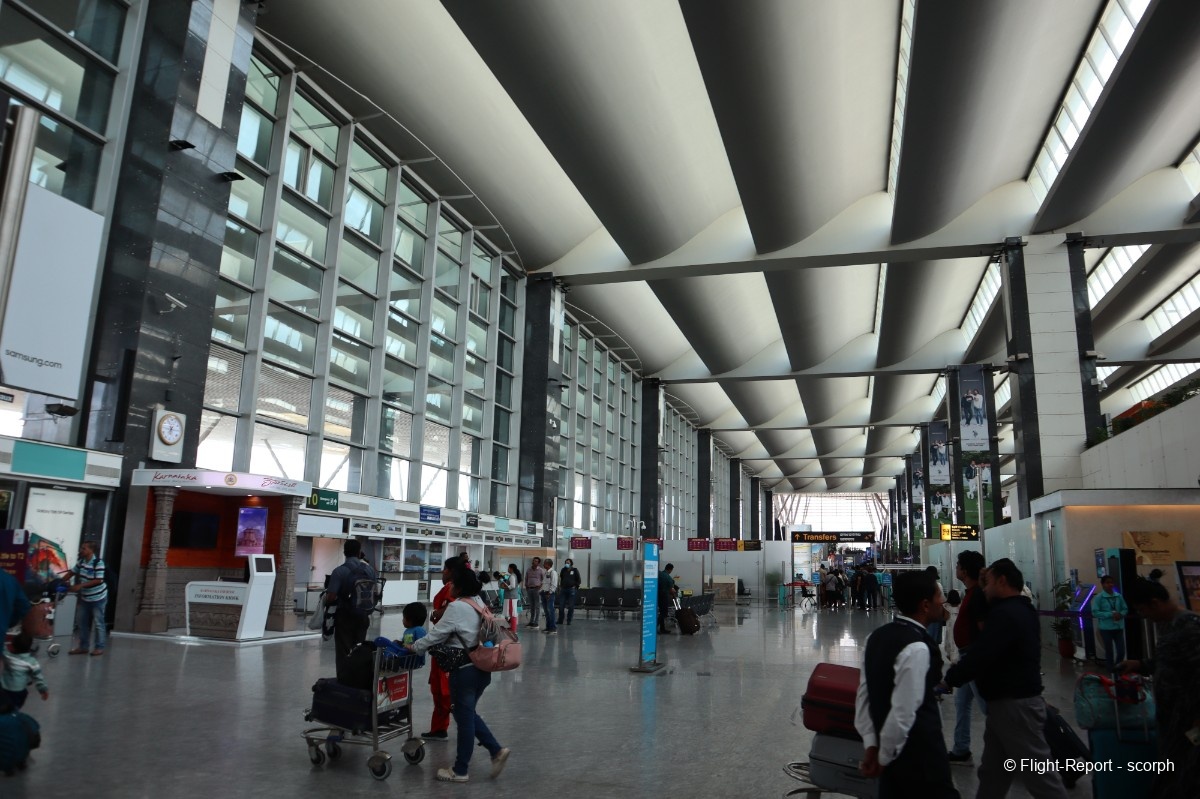
Similar to what we find at T2, the ground-side area has a large outdoor zone outside the airport, covered by a massive canopy. This space features numerous services, ranging from passenger services to transportation options and even dining facilities.
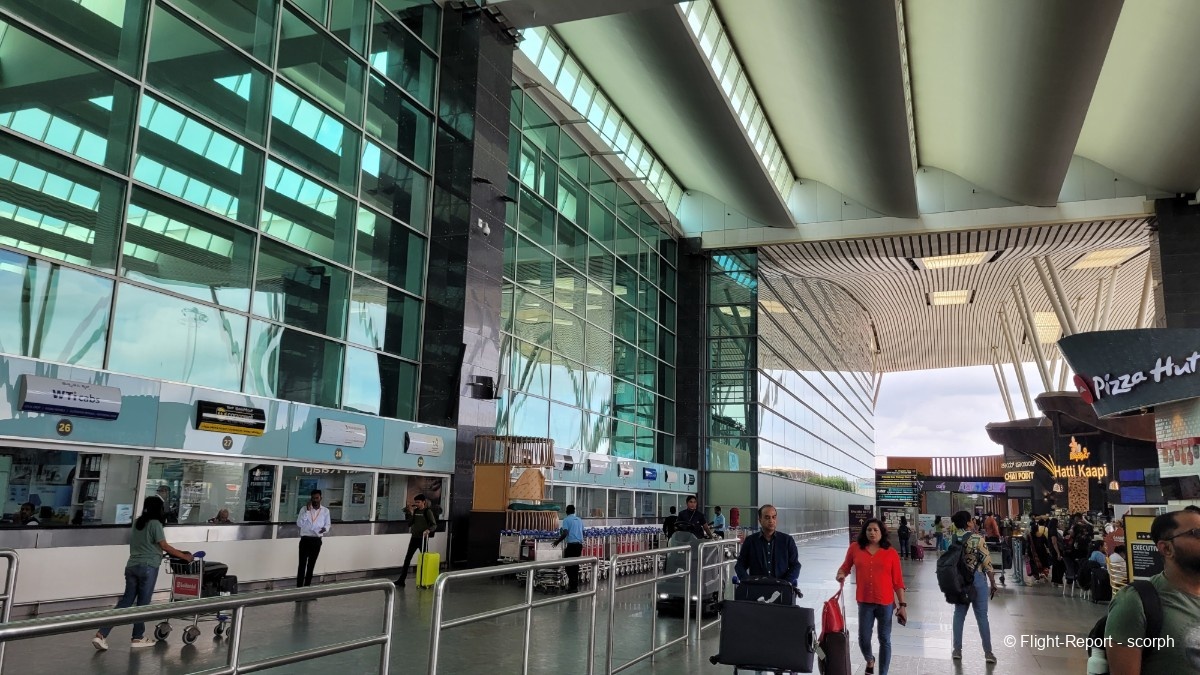
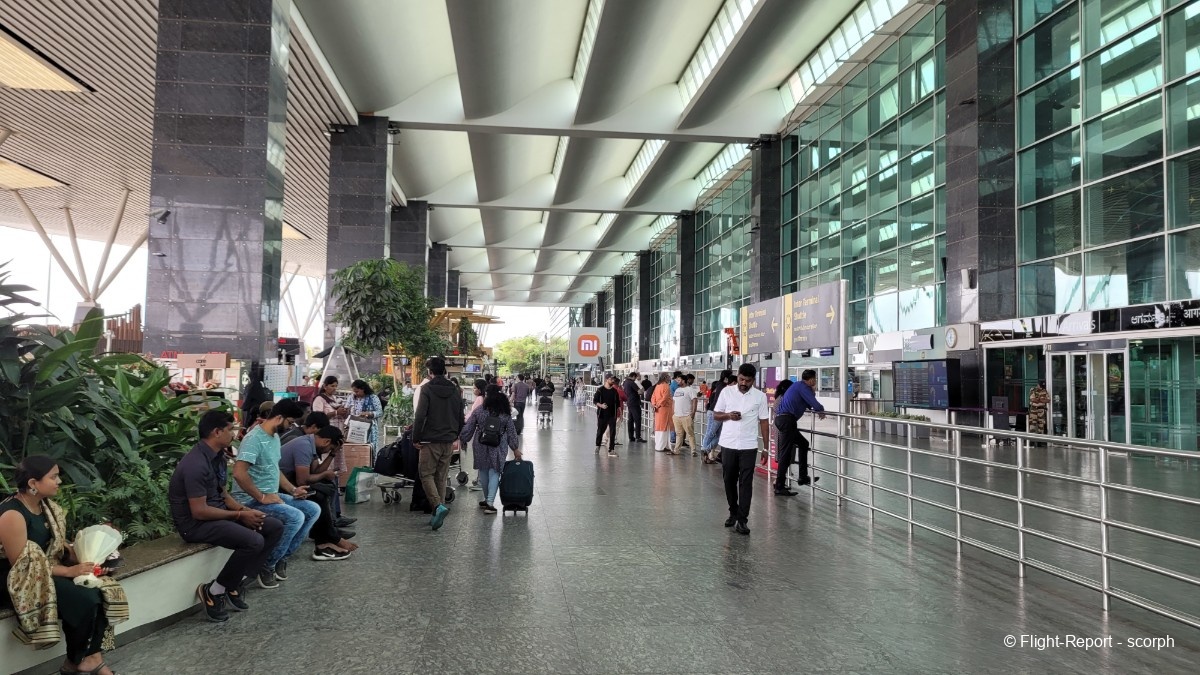
The Uber pick-up zone is easy to access and clearly marked, making airport transfers convenient for app users. Uber works quite well in Bangalore, and you can expect to pay around 1000-1200 INR to get to the city center, which is about 15€.
